- Build Your Own Box
- Ingredients
blends tailored to your unique needs.
- Shop Blends
- Refer a Friend, Get $25

Your Personalized Blends
Your Starter Kit includes 4 blends selected for you:
- Clarity: enter a flow state on stressful days *
- Energy: get all-day energy without crashing *
- Logic: enhances deep thinking + supports recall *
- Creativity: improves idea flow + eases nerves *
- Confidence: ease your nerves + calm your mind *
- Motivation: supports your willpower + focus *
Subscribe & Save $40 Skip or Cancel Anytime.
Subscribe & Save $40
- Save $40 every month
- Pause or cancel anytime
- Free 1:1 coaching
One Time Purchase
Ships within 1-2 business days
Clarity Caffeine-free
Key focus areas
- Maintain focus
- Support attention
- Enter flow state
Key ingredient
Alpha-GPC has been shown to support healthy cognitive function and physical performance.
All ingredients:
- ALPHA GPC (500mg)
- LION'S MANE MUSHROOM (500mg)
- CAMELLIA SINENSIS TEA LEAF (278mg)
- DIHYDROXYFLAVONE (30mg)
- CAFFEINE (100mg)
- L-THEANINE (200mg)
Creativity Caffeine-free
- Spark inspiration
- Support verbal fluency
- Maintain confidence
KSM-66 Ashwagandha has been shown to significantly reduce stress and anxiety.
- ALPHA GPC (150mg)
- AGMATINE SULFATE (250mg)
- PANAX GINSENG (200mg)
- ASHWAGANDHA ROOT (300mg)
- SCELETIUM TORTUOSUM (25mg)
Logic Caffeine-free
- Support memory
- Promote deep thinking
- Maintain processing speed
Synapsa has been shown to significantly improve working memory.
- GINKGO BILOBA (160mg)
- THEOBROMINE (100mg)
- PHOSPHATIDYLSERINE (400mg)
- HIGH DHA ALGAE (200mg)
- URIDINE MONOPHOSPHATE (30mg)
- BACOPA MONNIERI (320mg)
Energy Caffeine-free
- Promote Energy
- Fight Fatigue
- Build Mental Stamina
Teacrine has been shown to increase energy, motivation, and concentration.
- CITICOLINE (300mg)
- MANGO LEAF (300mg)
- THEACRINE (100mg)
- N-ACETYL CYSTEINE (500mg)
- INDIAN TRUMPET TREE (100mg)
- N-ACETYL L-TYROSINE (300mg)
Motivation Caffeine-free
- Maintain willpower
- Manage procrastination
- Manage stress
CDT (Dynamine) has been shown to help with cognitive control and reaction time during mentally demanding tasks.
- L-PHENYLALANINE (500mg)
- METHYLLIBERINE (100mg)
- VITAMIN B12 (1000mcg)
- FORSKOLIN (250mg)
- ARTICHOKE (450mg)
Confidence Caffeine-free
- Encourages Calm State
- Support Mental Flexibility
- Promotes Positive Outlook
Zembrin has been shown to improve in mood and disposition.
- SAFFRON (28mg)
- MAGNESIUM BISGLYCINATE (500mg)
- SAGE (333mg)
- MAGNOLIA BARK (10mg)
- ASHWAGANDHA LEAF & ROOT (120mg)
Baseline Assessment
Our algorithm was built by data scientists and has over 14,861,970 data points total. It matches you with formulas that are specifically aligned with your unique neurological make up, and identifies areas for improvement so you can reach your desired goals.
Your Insights
The personalized recommendations delivered by our platform are supported by evidence of 472 independent scientific studies.
After following our recommendations, XXX of our customers have reported improvements in a wide range of cognitive challenges.
Your overall score is higher than XXX of other customers who completed their initial questionnaire.
XXX of our customers with results similar to yours noticed an improvement in their ability to reduce stress and maintain energy within 7 days of using Thesis’ unique formulas.

How does the starter kit work?
Try a blend each week.
Choose one formula weekly, track its impact on your day.
Track how you feel
Track the impact of the remaining 3 formulas for the rest of the month.
Optimize your stack
We'll check in mid-month to see what's working, and our coaches will help you optimize your stack.
Trusted by experts
Dr. gabrielle lyon.
Functional Medicine & Nutritional Sciences
“I work with CEOs, celebrities, and other top performers in my practice. Thesis is what I recommend and take personally for focus and cognition. I even used it to help me nail my first TedX talk.”
Gabrielle’s blends
Professional Basketball Player & Mental Health Advocate
“With a busy life on and off the court, Thesis gives me energy and focus to get through the longest days and keep me sharp.”
Kevin's blends
Ultra-endurance Athlete & Nutrition Advocate
"Thesis has provided a substantial benefit to my ability to focus. Creativity works best for me — I take it 30 mins before a podcast or writing and it helps get me into the zone."
Rich’s blends
Frequently Asked Questions
Our Starter Kit is designed so that you can try multiple formulations to identify which blends work best with your unique brain chemistry.
Each week you will sample one of your recommended blends, and record how you respond.
Things to note would include increased productivity, decreased procrastination, enhanced focus and any changes in your routine.
At the end of the first month, you should have a good idea as to which blends work most effectively for you. These will be the blends you will continue with in your next month. If you've chosen our subscription option, we will send an email 3 days before your next shipment is sent. You can customize your upcoming box directly through the account portal and book a 1 on 1 consultation with a Wellness Coach .
Depending on your genetics and experience with nootropics, the effects can be felt in as little as 30 minutes after taking each blend.
Thesis has the most impact when taken on an empty stomach, just after waking from a normal night of rest.
Some people may need a few days of consecutive use to feel the effects of the nutrients.
We offer the most advanced cognitive performance system available, which enables you to find the exact compliment for your specific brain chemistry and desired areas of focus
Our innovative Starter Kit allows you to experience multiple formulations and determine which blends work best. Our process is complex because we’ve found that our systematic trial yields the best results in the shortest amount of time.
If we could formulate one pill that would work for everyone, we would. However, because the human brain is deeply complex, that is not possible.
You will receive four distinct Thesis blends totaling a four week supply, an instructional booklet, and access to our team of wellness coaches to help you set and achieve your goals.
You will also receive email messages with additional instructions to make the most of this exploratory month.
Choose up to 4 blends below that best match your goals. You can make changes to these selections in the future, based on what works best for you. GET STARTED
Thesis is shipped from our headquarters in New York City, via First Class Mail through the USPS, and takes about 2-5 business days to arrive within the continental US. Orders will be shipped same-day whenever possible.
If you are in need of priority shipping, email us ([email protected]) as soon as your order is placed, and we will upgrade it for you!
Pure and effective ingredients
Potent active ingredients.
Quality counts when supplementing, and only the active ingredients in a blend make an impact.
Clinically Studied Ingredients
We only use nutrients that have been proven to deliver desired effects in clinical trials.
All ingredients in each batch are tested with a third party lab to ensure optimal potency and purity.
30-Day Money Back Guarantee
Try Thesis risk-free for 30 days, or your money back on your first order.
Based on our 1,000,000+ data points, we have recommended these formulas for you. Your starter kit will contain each of these four blends.
- + Maintain focus
- + Support attention
- + Enter flow state
- + Spark inspiration
- + Support verbal fluency
- + Maintain confidence
- + Support memory
- + Promote deep thinking
- + Maintain processing speed
- + Promote Energy
- + Fight Fatigue
- + Build Mental Stamina
- + Maintain willpower
- + Manage procrastination
- + Manage stress
- + Encourages Calm State
- + Support Mental Flexibility
- + Promotes Positive Outlook
Want to build your own box?
Get Free Shipping + 33% OFF .
We’re independently supported by our readers and we may earn a commission when you buy through our links.
What are you looking for?
Search ideas for you, thesis nootropics review.
Sheridan Grant
Content Specialist
Sheridan is a writer from Hamilton, Ontario. She has a passion for writing about what she loves and learning new things along the way. Her topics of expertise include skincare and beauty, home decor, and DIYing.
Table of Contents
About Thesis Nootropics
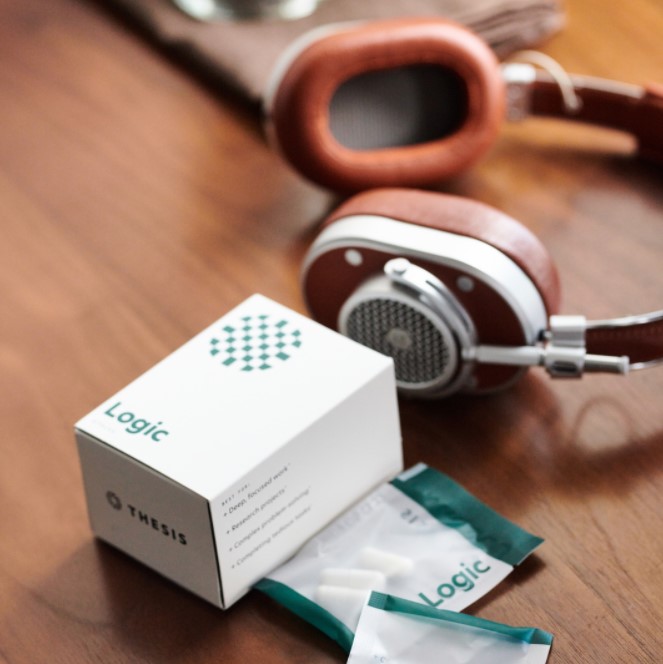
Hands up if you guzzle five coffees a day to stay awake, have tried all the supplements in the book desperate to improve your headspace, and aren’t interested in prescribed medications. Designed to increase focus , Thesis nootropics might be for you.
Thesis offers a customized blend of ingredients designed to optimize your cognitive function , with personalized details that tackle your specific needs. Nootropics boost brain performance in the same way a stimulant would, without the common negative effects.
A study published in the Journal of Alzheimer’s Disease found that nootropics may help improve cognitive function in people with Alzheimer’s disease.
Interested in finding out more about the brand and how it works? Leaf through our Thesis Nootropics review. We’ll be your guide through the company and the process, as well as details on the treatments, highlights from customer reviews, answers to important FAQs, and more, to help you decide if it’s worth the try.
Pros and Cons
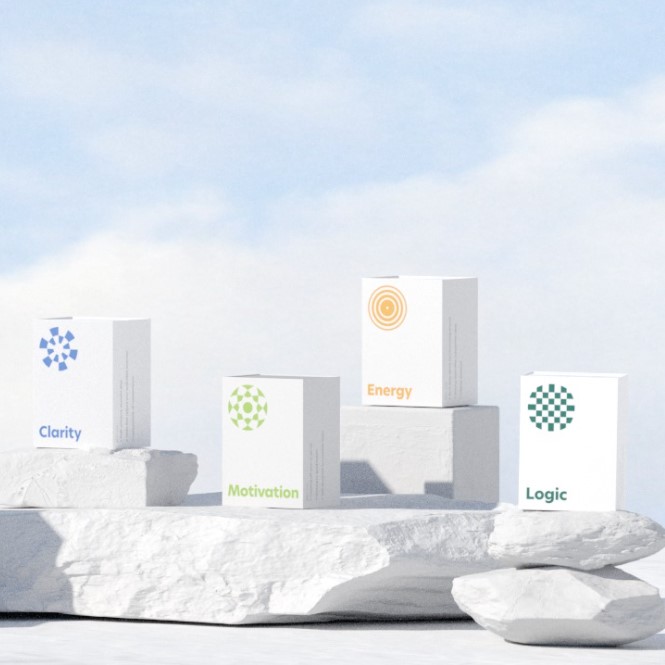
- Multiple cognitive benefits: Thesis Nootropics offers a variety of blends that cater to multiple aspects of cognitive function.
- Long-term effects: On top of short term benefits for daily life, Thesis nootropics ingredients are designed to impact the brain in the long-term.
- Personalized recommendations: Thesis Nootropics makes personalized recommendations based on your goals and unique brain chemistry.
- Potential side effects: The most common side effects to watch out for when you start taking Thesis Nootropics include heartburn, headaches, confusion, dizziness, loss of appetite, and digestive issues.
- Need to stop taking if issues arise: If you experience a headache or an upset stomach that won’t go away while taking their nootropics, Thesis recommends that you stop taking them.
What is Thesis Nootropics?
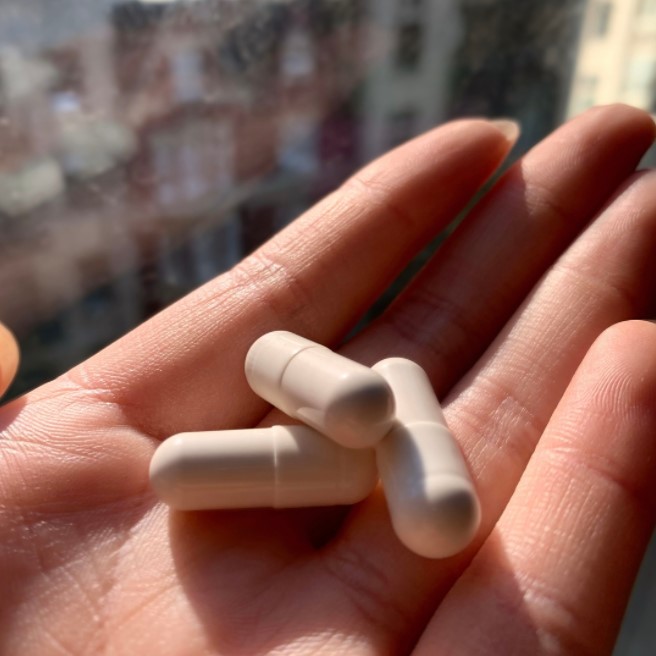
Nootropics are nutrient compounds and substances that are known to improve brain performance , such as caffeine and creatine. They help with issues that affect motivation, creativity, mood, memory, focus, and cognitive processing.
Nootropics are the ideal addition to an already healthy lifestyle that consists of exercise, proper nutrition, and enjoyable activities. Thesis nootropics are carefully formulated to target specific needs, ranging from energy to creativity. The brand focuses on safety, ensuring that all supplements adhere to FDA guidelines and go through multiple clinical trials.
How Thesis Nootropics Works

With all that being said, you may be wondering how Thesis provides users with an option that is specific to their needs. Fortunately, the process is simple and hassle free. Here’s how it works:
- Take the Thesis nootropics quiz
- Answer questions about your basic information
- Receive personalized recommendations
- Get your starter kit for $120 , or $79 monthly when you subscribe
After that, you’ll select one formula to take each week, taking one day off in between each different option. You’ll also track your results in the daily journal over the month to see how they affect your daily life.
From there, it operates as a subscription service. Users will be able to optimize their next shipment by telling the brand which formulas worked best.
If you don’t like any of the blends in your box, let the company know and they’ll switch it for something that’s a better fit for your lifestyle, genetics, and goals.
Thesis Nootropics Ingredients
Thesis Nootropics is a brand that offers personalized nootropics designed to enhance cognitive function and overall brain health. Their blends contain a variety of ingredients that are carefully chosen for their cognitive-boosting properties. Here are some of the key ingredients in Thesis Nootropics:
- Cognizin (Citicoline) : Cognizin is a type of choline that is known for its ability to enhance cognitive function, including memory and focus.
- L-Theanine : L-Theanine is an amino acid that is found in green tea, and is known for its ability to promote relaxation and reduce stress and anxiety.
- Lion’s Mane Mushroom : Lion’s Mane Mushroom is a type of medicinal mushroom that is believed to have cognitive-boosting properties, including improved memory and focus.
- Rhodiola Rosea : Rhodiola Rosea is an adaptogenic herb that is known for its ability to reduce stress and fatigue, and improve mental clarity and cognitive function.
- Ashwagandha : Ashwagandha is an adaptogenic herb that is known for its ability to reduce stress and anxiety, and improve memory and cognitive function.
- Phosphatidylserine : Phosphatidylserine is a type of phospholipid that is found in high concentrations in the brain, and is believed to support cognitive function, including memory and focus³
- Alpha-GPC : Alpha-GPC is a type of choline that is known for its ability to enhance cognitive function, including memory and focus.
- TAU (uridine): TAU is a blend of uridine, choline, and DHA, which is believed to support brain health and cognitive function.
- Artichoke extract : Artichoke extract is believed to enhance cognitive function by increasing levels of acetylcholine, a neurotransmitter that is important for memory and learning.
- Dynamine : Dynamine is a type of alkaloid that is believed to enhance cognitive function by increasing levels of dopamine, a neurotransmitter that is important for mood and motivation.
Overall, the ingredients in Thesis Nootropics are carefully chosen for their cognitive-boosting properties, and are designed to work together to enhance overall brain health and cognitive function.
Thesis Nootropics Health Benefits
Thesis Nootropics is a brand that offers personalized nootropics designed to enhance cognitive function and overall brain health. Their blends contain a variety of ingredients that are carefully chosen for their cognitive-boosting properties, and offer numerous health benefits. Here are some of the health benefits of Thesis Nootropics:
- Increased cognitive energy : One of the key benefits of Thesis Nootropics is increased cognitive energy, which can help improve productivity, mental alertness, and motivation, as it contains cognizin .
- Enhanced mental clarity : Another benefit of Thesis Nootropics is enhanced mental clarity,given from Lion’s Mane Mushroom which can help reduce brain fog and improve focus.
- Improved memory and learning abilities : Thesis Nootropics contains ingredients that are believed to improve memory and learning abilities, like Phosphatidylserine , which can help users retain information more effectively.
- Elevated mood : Thesis Nootropics may help elevate mood and reduce symptoms of anxiety and depression, thanks to ingredients like L-Theanine and Ashwagandha .
- Lowered stress levels : The adaptogenic herbs in Thesis Nootropics, such as Rhodiola Rosea and Ashwagandha , are known for their ability to lower stress levels and promote relaxation.
- Boosted focus : Thesis Nootropics contains ingredients like Alpha-GPC and Artichoke extract , which are believed to boost focus and concentration.
While Thesis Nootropics offers numerous health benefits, it’s important to note that the long-term effects of nootropics are not yet fully understood and more research is needed.
3 Thesis Nootropics Bestsellers
Thesis energy review.
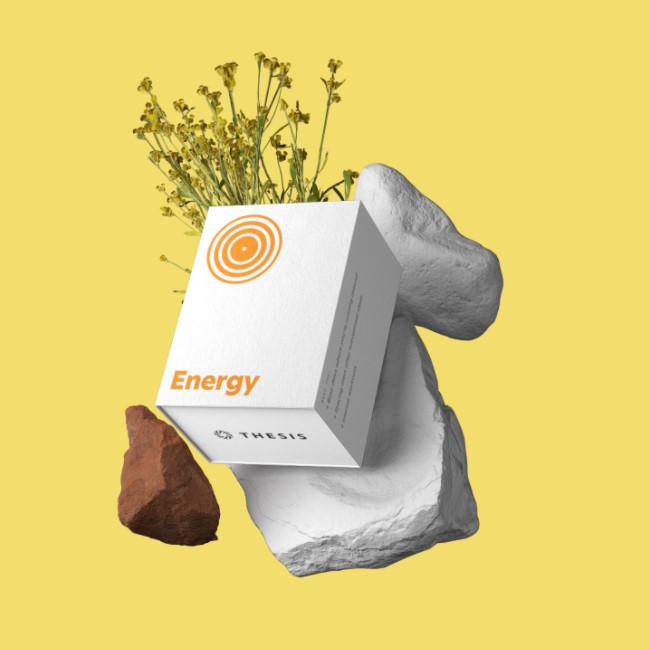
If you’re constantly struggling to keep up with the demands of your busy life, it might be time to try a natural energy booster like Thesis Energy. This powerful nootropic blend is specifically designed to increase energy, overcome fatigue, and build mental stamina.
Thesis Energy is caffeine-free, making it a great option for those who are sensitive to caffeine or looking for a natural alternative to traditional energy drinks. The Energy formulation is designed to help improve focus and mental clarity, increase cognitive energy, and reduce fatigue. Whether you’re facing a busy day at work, recovering after a night of poor sleep, or gearing up for an intense workout, Thesis Energy can help you power through.
Each ingredient in Thesis Energy is carefully chosen for its energy-boosting properties. The specific ingredients can vary depending on your needs, but they work together to help increase energy, improve mental clarity, and reduce fatigue.
To get the most out of Thesis Energy, take it every morning on an empty stomach. You can also take it again after lunch if you need an extra boost. It’s designed to help you tackle busy, hectic days, recover from poor sleep, and power through intense workouts.
If you’re tired of relying on coffee and energy drinks to get through the day, it might be time to give Thesis Energy a try. Check availability and start boosting your energy naturally today!
Thesis Creativity
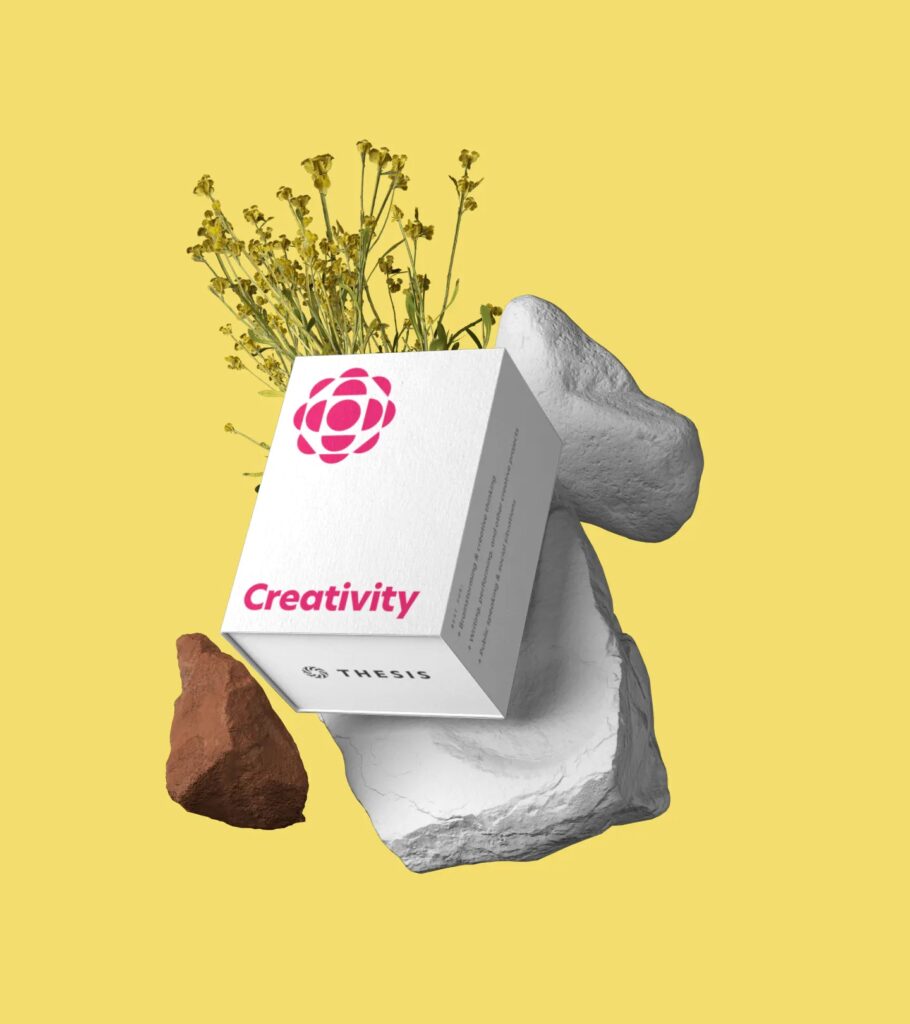
If you’re someone who struggles with creativity or finds yourself feeling stuck in your creative endeavors, Thesis Creativity may be worth considering. This nootropic supplement is designed to help spark inspiration, enhance verbal fluency, and boost confidence in your own great ideas.
So what’s in Thesis Creativity? The ingredients may vary depending on your specific needs, but these ingredients work together to support stress management, memory function, mood regulation, and energy production.
By supporting stress management, memory function, and mood regulation, Thesis Creativity can help free up mental space for more creative thinking. Additionally, the caffeine and L-theanine combo can provide a boost of energy and focus without the jitters and crash that can come with caffeine alone.
To get the most out of Thesis Creativity, it is recommended to take it every morning on an empty stomach and again after lunch if you need an extra boost. This nootropic blend is particularly helpful for brainstorming and creative thinking, writing and creative projects, and public speaking and social situations.
As with any nootropic supplement, it’s important to note that the long-term effects of Thesis Creativity are not yet fully understood and more research is needed. It’s always a good idea to speak with a healthcare professional before adding any new supplements to your routine.
In summary, if you’re looking for a little extra help in the creativity department, Thesis Creativity may be a valuable addition to your nootropic lineup. Its unique blend of ingredients can help support mental clarity, mood regulation, and energy production, making it a valuable tool for any creative individual.
Thesis Logic
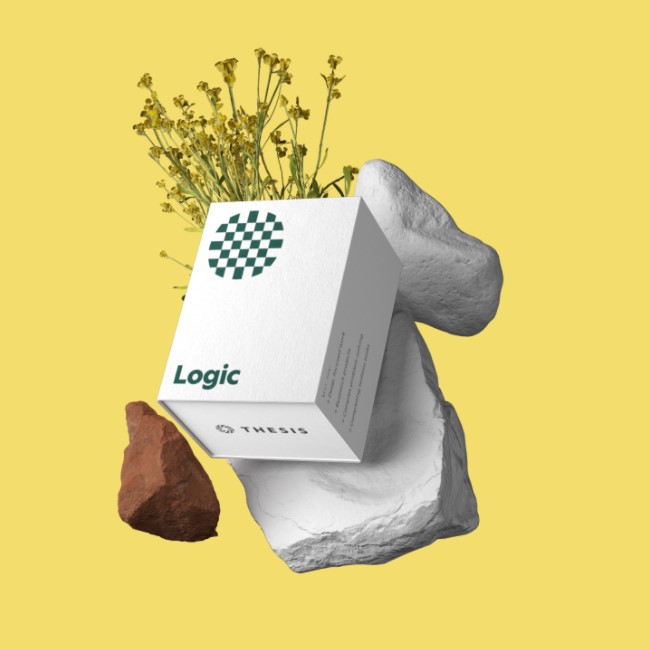
If you’ve been having trouble with your memory lately, such as forgetting what you had for lunch yesterday or struggling to recall common words, then Thesis Logic may be just what you need. This formula is designed to help enhance your processing speed, boost your memory, and deepen your thinking.
Thesis Logic is caffeine-free, making it a great option for those who are sensitive to caffeine. The formula is ideal for use during deep, focused work, complex problem-solving, research projects, and completing tedious tasks.
Taking Thesis Logic is easy – simply take it every morning on an empty stomach, and take it again after lunch if you need an extra boost. By incorporating Thesis Logic into your daily routine, you may notice improvements in your cognitive function and overall mental performance.
Who Is Thesis Nootropics For?
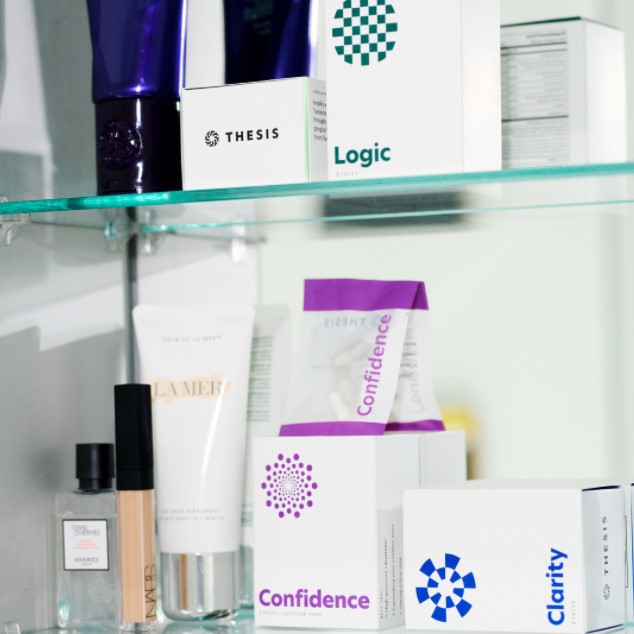
Thesis nootropics are designed for a number of different specific needs, including anyone who wants to focus better, have more energy, and maintain mental clarity. All in all, the products are specifically formulated to improve day to day life and target your specific needs .
Thesis Nootropics Side Effects

While Thesis nootropics are designed to enhance cognitive performance and provide a range of benefits, it’s important to be aware of the potential side effects that can occur. As with any supplement, individual reactions can vary, and some people may experience side effects while others may not.
Some of the potential side effects of Thesis nootropics include:
- Insomnia : Some nootropics contain caffeine or other stimulants that can disrupt sleep patterns and lead to difficulty falling asleep or staying asleep.
- Blurry vision : Certain nootropics, such as those containing alpha GPC, have been linked to temporary blurry vision.
- High blood pressure : Stimulant-based nootropics can increase blood pressure, which can be dangerous for people with hypertension or other heart conditions.
- Fast heart rate : Similarly, stimulants can also increase heart rate, leading to palpitations or a rapid pulse.
- Circulation problem s: Certain nootropics, such as vinpocetine, can affect blood flow and circulation, leading to issues like dizziness, nausea, or headaches.
- Addiction : Some nootropics, such as those containing racetams, have been associated with the potential for addiction or dependence if used long-term.
It’s important to remember that not all nootropics will produce these side effects, and the severity of any reactions will depend on individual factors such as dosage, duration of use, and underlying health conditions. However, it’s always wise to discuss any potential risks with a healthcare professional before starting any new supplement regimen.
Additionally, it’s important to follow dosage instructions carefully and not to exceed recommended amounts, as this can increase the risk of side effects. By being mindful of potential risks and using nootropics responsibly, users can reap the benefits of these supplements without experiencing adverse effects.
Thesis Nootropics Reviews: What Do Customers Think?
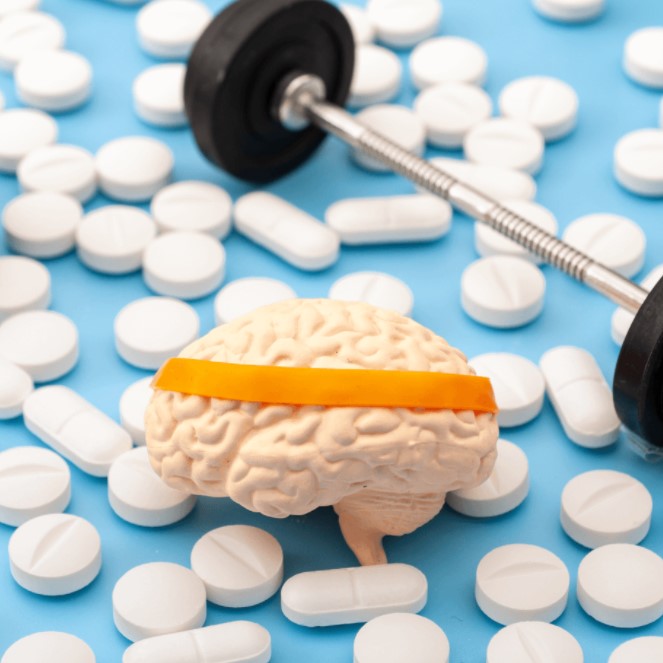
At this point in our Thesis nootropics review, it’s time to turn to what customers are saying. So, we sourced testimonials from the brand’s website, Reddit, and ZenMasterWellness. And spoiler alert, the Thesis nootropics reviews we came across have nothing but good things to say.
On takethesis.com , the brand earns 4.4/5 stars out of 7,956 reviews. One patron describes their particular blend as the perfect alternative to prescription meds :
“ I have been off stimulants for months now and these formulas are far superior. My husband and daughter both noticed the change and said I have been more productive, focused, less anxious, and more “thinking outside the box”. I have tried for years to get off stims and nothing would work .”
On Reddit, many reviewers share similar sentiments about how effective the products are. One buyer shares that they tried tons of different nootropics on the market, and Thesis stands out amongst the crowd .
On ZenMasterWellness, one reviewer states that their blend provided the exact results they were looking for :
“ They offer notable improvements to how well I’m able to focus, stay on task, and grind when it’s time to grind. In practice, this usually looks like a clearer mind and an improved ability to just… chill. With the Clarity and Creativity blends, in particular, I just feel leveled out .”
Backed by clinical trials and real customer experiences, Thesis stands out in the world of nootropics and supplements. The personalized selections prove effective, while the quality ingredients live up to expectations.
Is Thesis Nootropics Legit?
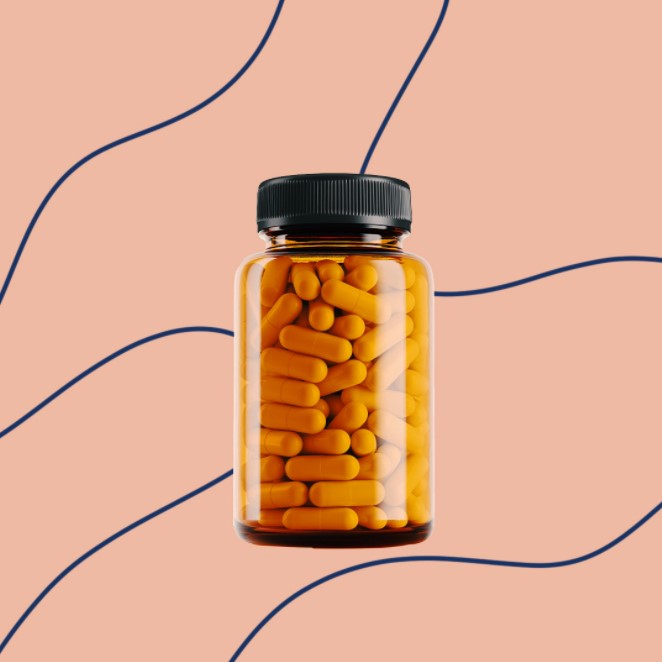
If you’re wondering if this brand offers products that are too good to be true, this Thesis nootropics review is here to say that it is the real deal .
The brand is backed by numerous clinical trials, which highlight how 86% of customers reported improvements in a wide range of cognitive challenges, while 89% noticed an improvement in their ability to reduce stress and maintain energy.
Is Thesis Nootropics Worth It?
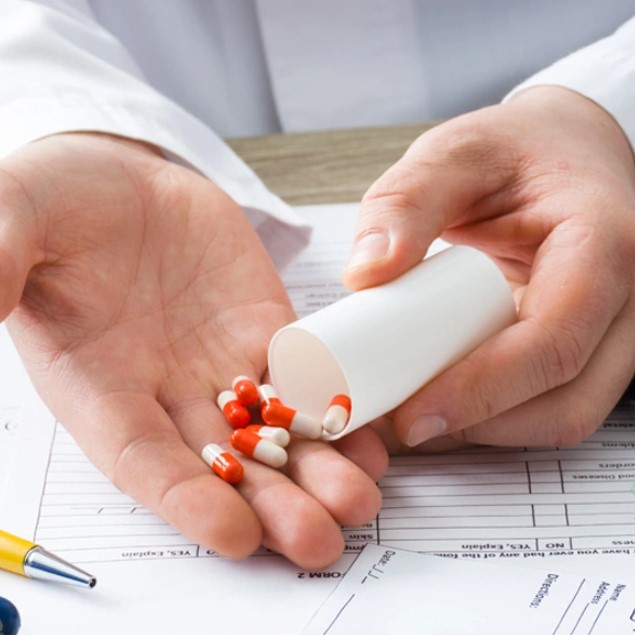
Thesis is an appealing choice in the world of nootropics because it provides a completely customized selection based on your needs and goals. Plus, the ingredients are potent and ensure the best effects—and you only end up paying for the benefits you actually need.
With that in mind, this Thesis nootropics review deems the brand worth the try.
Alternatives
Here are some alternatives to Thesis Nootropics that you might find interesting:
- Mind Lab Pro – This nootropic supplement is designed to improve cognitive function and mental performance. It contains 11 ingredients that work together to enhance memory, focus, and overall brain health.
- Thorne Supplements : If you’re looking for high-quality, science-based supplements, Thorne is a great choice. Their products are designed with the latest research in mind and are rigorously tested for quality and purity. Some of their popular offerings include multivitamins, protein powders, and omega-3 supplements.
- WeAreFeel Supplements : WeAreFeel is a supplement brand that offers a variety of products designed to support different aspects of your health. Their supplements are vegan-friendly and free from artificial colors, flavors, and preservatives. Some of their popular offerings include multivitamins, probiotics, and omega-3 supplements.
- Neuro Gum : If you’re looking for a quick and easy way to boost your focus and energy levels, Neuro Gum is a great option. This gum is infused with caffeine and other natural ingredients that can help improve mental clarity and alertness. Plus, it’s sugar-free and comes in a variety of delicious flavors.
- Neuriva Plus : Neuriva Plus is a brain supplement that’s designed to improve memory, focus, and cognitive performance. It contains a blend of natural ingredients, including coffee fruit extract and phosphatidylserine, that have been shown to support brain health. If you’re looking for a natural way to boost your cognitive function, Neuriva Plus is worth considering.
Thesis Nootropics Promotions & Discounts
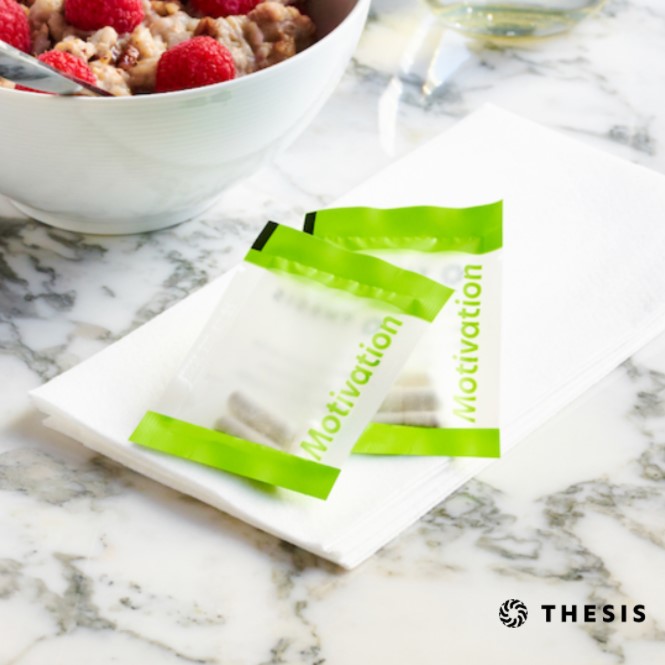
There aren’t currently any Thesis promos or discounts available. That being said, if you subscribe for recurring shipments of your recommended products, you’ll save $40 monthly .
Where to Buy Thesis Nootropics
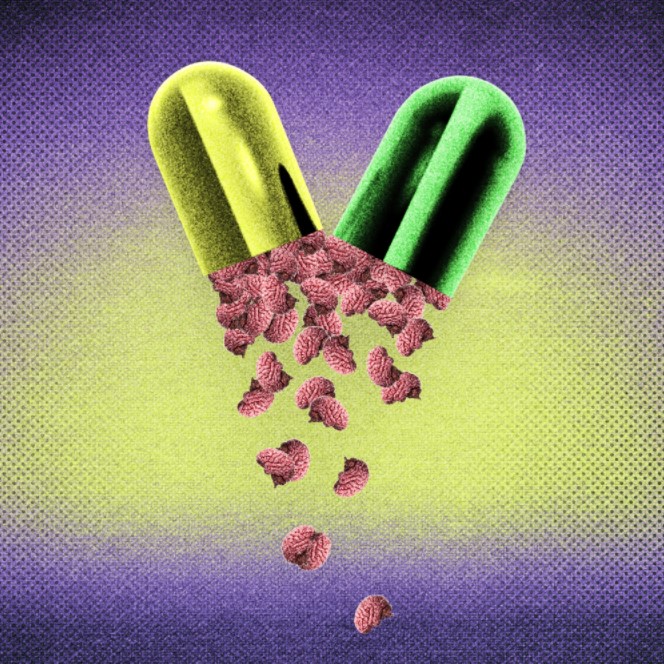
At the time of this Thesis nootropics review, the products are exclusively available on the brand’s website, takethesis.com .
Is Thesis Nootropics vegan?
Thesis nootropics are made with only vegan ingredients . That being said, while the brand has taken precautions to protect against cross contamination, the products are not certified vegan.
Is Thesis Nootropics gluten-free?
On top of being vegan, Thesis products are made without gluten, eggs, or nuts . Again, while the brand strives to protect users against cross contamination, the products are not certified gluten free.
What is Thesis Nootropics’ Shipping Policy?
If you’re anxiously awaiting your order from this Thesis nootropics review, you’ll be happy to hear that the company offers speedy shipping, sending orders out within 1 business day. After that, packages should arrive within only 1-3 business days . Costs are calculated at checkout.
At this time, Thesis is not able to offer international shipping. This Thesis nootropics review recommends following the brand on social media and signing up for the newsletter to stay up to date with shipping policies.
What is Thesis Nootropics’ Return Policy?
If you find that your Thesis formula isn’t working out, the company requests that you contact them to make changes and adjustments to ensure you are able to receive the proper help.
If you would still like to make a return, follow these simple steps for a refund:
- Submit your refund request
- Ship the items back within 30 days of the original delivery
- Send an email with your tracking number to the brand
- Return any remaining product in their original packaging to:
Thesis Returns 902 Broadway
6th Floor New York, NY
Once your return has been received, a refund will be processed and email confirmation will be sent. It’s also important to note that the brand can only refund one month’s supply per customer and return shipping is the customer’s responsibility.
How to Contact Thesis Nootropics
We hope you enjoyed this Thesis nootropics review! If you have any further questions about the brand or its products, you can contact them using the following methods:
- Call 1 (646) 647-3599
- Email [email protected]
902 Broadway Floor 6 New York, NY 10010
If you’re looking for other ways to boost your productivity via supplements, check out these other brands we’ve reviewed:
Thorne Supplements Review
WeAreFeel Supplements Review
Neuro Gum Review
Neuriva Plus Review
Our team is dedicated to finding and telling you more about the web’s best products. If you purchase through our links, we may receive a commission. Our editorial team is independent.
Ask the community or leave a comment
Customer reviews, leave a review, ask the community or leave a comment cancel reply.
Your email address will not be published. Required fields are marked *
This field is required
This field is required Please use a valid email
Save my name, email, and website in this browser for the next time I comment.
You may also be interested in

Alo Yoga Review

Vivint Smart Home Security Review
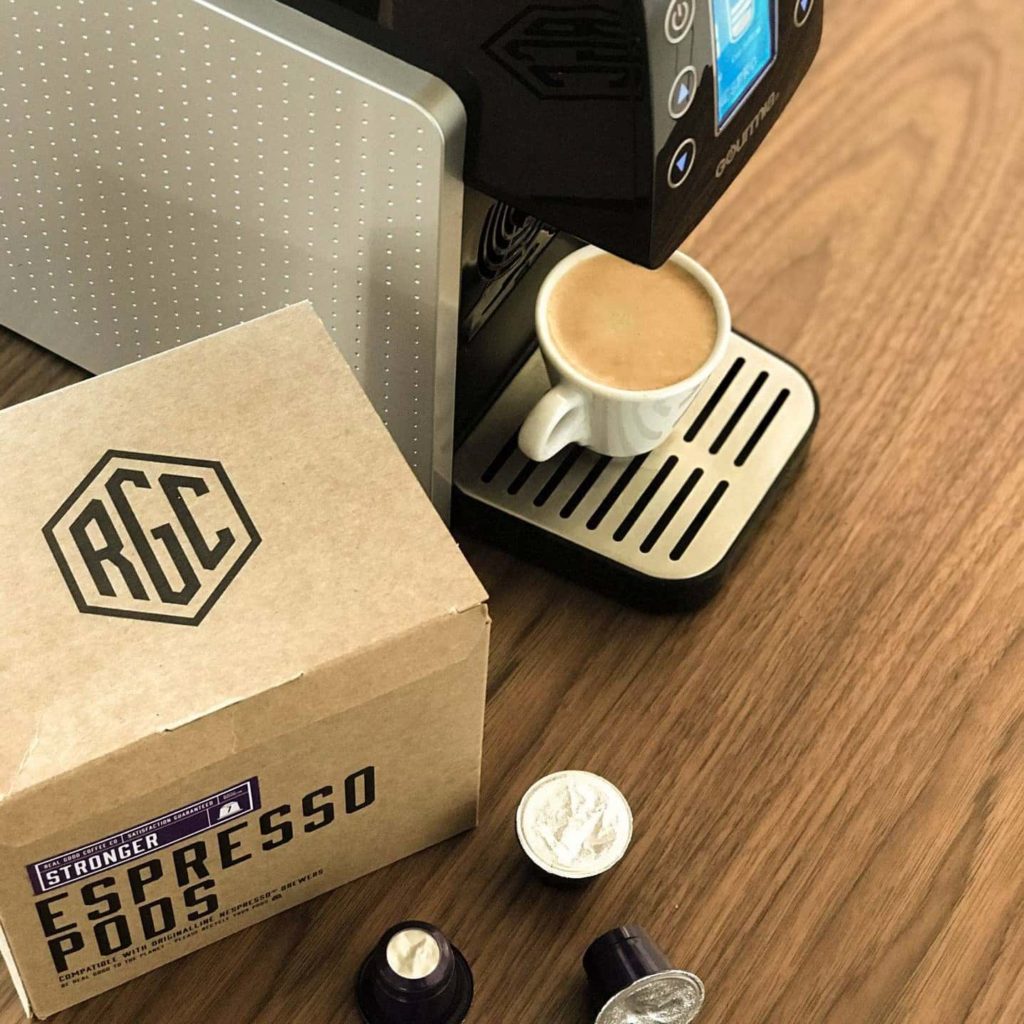
Real Good Coffee Review

Pangaia Review
For Your Workout
Muscle-building stacks
BCAAs for women
L-Citrulline supplements
Best testosterone booster
Nitric oxide supplements
Amino acid supplements
Weight Loss
Wegovy vs. Mounjaro
Hair Growth
Hair loss treatments for men
Laser caps for hair loss
Topical finasteride guide
Keeps vs. Hims
Face & Body
Men's anti-aging creams
Latisse guide
Brightening creams
IPL devices
Guide to online therapy
Therapy terminology guide
Preparing for your first session
Betterhelp vs. Talkspace
Supplements
Ashwagandha supplements
CBD for sleep
Saffron supplements
Amanita Muscaria gummies
Online Pharmacies
NMN supplements
Berberine supplements
CoQ10 supplements
NAD supplements
CBD for arthritis
Sexual health
ED treatments
Delay sprays
Phoenix ED device
Microbiome testing
At-home STD tests
Food sensitivity tests
DNA health testing
Anatomy Explorer
Skeletal system
Muscular system
Cardiovascular system
Digestive system
Nervous system
Respiratory system
Urinary system
Integumentary system
Thesis Nootropics Review
Thesis has a range of targeted nootropics you can combine to optimize your results. our team will help you decide which ones are right for you..

Daniel is a senior editor and writer at Innerbody Research. After receiving his bachelor’s degree in writing, he attended post-graduate studies at George Mason University and pursued a career in nutritional science.

Dr. Segar is a cardiologist at the Texas Heart Institute and a member of Innerbody Research's Medical Review Board.
In this Review
Nootropics in general offer the potential to improve cognitive abilities and regulate mood without the need for a prescription. And while more research is necessary, current data suggests that they consist of ingredients that are generally safe and effective for healthy adults. 35 However, Thesis isn’t the only provider of high-quality nootropics, nor do they offer especially low prices. In this review, we'll compare and contrast Thesis’ six formulas and see how they stack up against a growing field of competitors.
Our Findings
- You can feel most results within an hour
- Products are third-party-tested for purity
- All options available without stimulants
- Outstanding phone support
- Subscriptions include complimentary wellness coaching
- Free shipping on all orders
- Use code INNERBODY for 10% off your first order
- Somewhat more expensive than competitors
- Up to four large pills per dose
Despite the somewhat high price, we recommend Thesis to anyone looking for a nootropic subscription that can be tailored to their specific needs. The formulas from Thesis provide tangible benefits with minimal ingredients, and each formula is available with or without caffeine. Thesis also offers stellar customer service and delivers their product in individually packed doses you can take just about anywhere.
Special Offer: Take 10% OFF with code INNERBODY
Why you should trust us
Over the past two decades, Innerbody Research has helped tens of millions of readers make more informed decisions about staying healthy and living healthier lifestyles. As nootropics have become more important players in the supplements landscape, we’ve taken a serious look at the key players to see which ones are worthwhile.
Thesis exists in a class of nootropics that combines multiple nootropic ingredients to achieve specific goals. We’ve spent hundreds of hours researching and testing various nootropics, including both individual ingredients and combinations like Thesis offers. In researching Thesis and their competitors, our team has read more than 100 clinical studies examining the efficacy and safety of nootropic ingredients, and we’ve combined all of that knowledge with our experiences to create this review.
If you're curious about our team's experience using Thesis nootropics and wondering how the products will arrive at your door, we made this handy, 5-minute video summarizing those details:
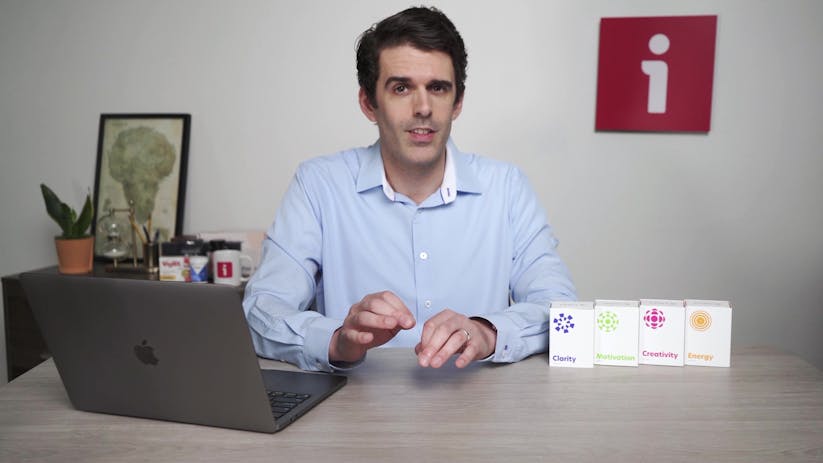
Additionally, like all health-related content on this website, this review was thoroughly vetted by one or more members of our Medical Review Board for accuracy.
How we evaluated Thesis
To evaluate Thesis, we examined the extensive research available on each ingredient the company uses and compared them to a growing marketplace of nootropics, many of which our testing team has tried over the past few years. Specifically, we assessed how effectively Thesis' formulas work, as well as their safety, cost, and the convenience of acquiring and taking them.
Ultimately, we found Thesis to be one of the more reliable companies in terms of product quality and customer care, even if they are among the more expensive nootropic brands. For any nootropic, you’re looking to create a noticeable effect in brain performance, and altering anything to do with that sensitive chemistry likely warrants a fair investment. The bargain bin is not typically where you want to shop for mind-enhancing substances.
We’ll get into a more direct comparison between Thesis and their competitors a little later, and you’ll see that the balance between their price and overall value is quite reasonable. For now, let’s look at each criterion in more detail.
Effectiveness
Nootropic companies have a plethora of ingredients at their fingertips when they formulate their products. Some companies take a modern approach, focusing on the latest research into established Western medicines. Others look to the past, where ancient Chinese and Ayurvedic practices employed various botanicals to achieve cognitive effects. The best companies combine these approaches, using potentially beneficial ingredients that science supports.
Thesis takes this combined approach, employing just under three dozen ingredients from amino acids to ancient herbs across their six products. The company scores highly in effectiveness thanks to the ingredients they choose and the doses they offer for each, making it likely that you can notice their combined effects.
Individual results will vary due to everything from sleep patterns to diet, but most people should find benefits in at least one of Thesis' six formulas. Caffeinated formulas generally have more pronounced effects than stimulant-free versions, but the value of Thesis offering every formula with or without stimulants cannot be overstated.
One minor knock against Thesis is that, unlike some of their competitors, Thesis does not have a nootropic blend designed for improved sleep. Better sleep supports cognition and mood, so some companies offer formulas designed specifically for sleep promotion with ingredients like melatonin. That said, some of Thesis’ formulas contain lion’s mane or Zembrin (a branded form of Sceletium tortuosum that’s been shown to reduce anxiety and promote sleep). 2 3 And the amount of Zembrin used in Thesis’ Creativity and Confidence blends is the exact same amount used in these successful studies — 25mg.
Good nootropics are, unfortunately, a bit expensive. You can find less expensive options than Thesis, but their $79 monthly rate is right in the middle of what the market demands. You could also argue that the ingredient quality, customization options, and overall efficacy Thesis offers make it a superior value to many less expensive alternatives. Still, the price remains a sticking point for some.
Let's compare the monthly and per-dose costs with some of Thesis' closest competition. The prices below reflect subscription savings where available.
| Monthly cost | Servings per month | Cost per dose | Shipping | |
|---|---|---|---|---|
| $79 | 24 | $3.29 | Free | |
| $139 | 15 | $9.27 | Free | |
| $90 | 30 | $3.00 | $8.95 | |
| $119 | 30 | $3.97 | Free | |
| $22.49 | 30 | $0.75 | $6.95 | |
| $69 | 30 | $2.30 | $9.95 | |
| $76.46 | 30 | $2.55 | Free | |
| $65 | 30 | $2.17 | Free |
Three of the seven competitors included in the chart above are more expensive than Thesis, and another three are no more than $15 less expensive, revealing their generally average cost. Focus Factor — consistently our top budget pick among nootropics — costs much less than others in the field and includes many ingredients with associated clinical research. The downside is that increasing the number of ingredients (even when they seem to work) increases the odds of an adverse reaction.
TruBrain is the only company that truly compares to Thesis from a quality and variety standpoint. Other companies offer only one or two formulas, whereas Thesis and TruBrain each offer several more targeted products. TruBrain allows you to spend just $69 on your first jar when you subscribe — $10 less than Thesis — but that price shoots up to $119 every month after that, making Thesis the superior value.
When we consider the safety of any supplement, we look at available research into individual ingredients and compare those dosages with what the supplement offers. Whenever possible, we also test the product ourselves to observe its effects on us. Additionally, we look for safety standards in manufacturing that can provide added peace of mind, like third-party testing and compliance with the FDA’s Good Manufacturing Practices (GMP).
Thesis manufactures their products in GMP-compliant facilities and has third-party testing performed to assess the purity of each ingredient and formula. And the clinical research involving the lion's share of their ingredients reveals minimal risk profiles with few to no adverse effects reported. That said, ashwagandha isn’t safe for pregnant or breastfeeding individuals, and it can stimulate thyroid activity, so anyone with thyroid concerns (hyper- or hypothyroidism) or on medication to regulate thyroid function should be careful. 36 37
Thesis also limits their formulas to a handful of ingredients, which reduces the likelihood that any one of them would cause an adverse reaction. This is pretty typical of nootropics in Thesis’ class, but less expensive nootropics might try to convince you of their value by stuffing a single blend with several dozen components. That might increase the chances you feel some positive effect, but the side effect risk goes up by the same token.
Convenience
Our convenience rating considers various aspects of a user's experience. It usually starts with the quality of a product's website design and whether or not its pages are easy to navigate. We also consider the presence of subscription systems that make reordering easier and money-back guarantees that protect your investment. A company's customer service is another vital aspect of convenience, especially if you need questions answered. The quality of an FAQ section, the availability of representatives via chat or phone call, and the responsiveness to email inquiries all play a part here.
Our convenience rating is also informed by the steps required to actually take the product. Nootropics often consist of large capsules, and doses can contain anywhere from 1-7 capsules, which is awful for anyone with difficulty taking pills. Smaller capsules, fewer capsules per dose, and simple dosing schedules are ideal. Thesis’ capsule count varies per formula, ranging from 2-4 mid-size capsules you can take 30 minutes before you might want or need their effects.
To summarize some important aspects of nootropic company convenience, let's look at which companies have large capsule counts, good money-back guarantees, and subscription systems.
| Capsules per dose | Money-back guarantee | Subscription option | |
|---|---|---|---|
| 2-4 | 30 days | ||
| 7 | 100 days | ||
| 6 | None | ||
| 3 | None | ||
| 4 | None | ||
| 2-4 | 30 days | ||
| 3 | 60 days | ||
| 2 | 60 days |
Thesis also provides a service that few other companies offer: free consultations with in-house nootropic coaches. These experts can help you figure out the best time to take specific Thesis formulas and guide your experience so you can tell whether or not they're working for you. Follow-up consultations are also free as long as you subscribe to the product.
What are nootropics?
Nootropic is a term most people use to refer to any non-prescription supplement that can boost brainpower. 4 The technical definition is a little more nuanced — encompassing prescription medications like Ritalin and Adderall — but the supplement industry has largely co-opted it to categorize the new class of non-prescription products. The word loosely translates from its Greek origins to mean mind-changing, and the majority of ingredients in a given nootropic seek to alter the brain’s cognitive abilities, as well as its governance of mood and energy.
Most nootropic supplements contain botanical ingredients, vitamins, minerals, and amino acids that boast at least some clinical research connecting them with improvements in any of the following:
Compared to their prescription cousins, nootropic supplements aren't particularly strong. Still, limited clinical research indicates a tangible benefit to taking them.
What is Thesis?
Thesis is a supplement company with a focus on nootropics. Their founders each had experiences growing up with what would today be considered learning disabilities, and they credit nootropics for changing their lives. They make six distinct nootropic formulas, each with a specific ingredient profile.
Thesis differentiates themselves from their competitors in several critical ways:
- They offer a starter kit containing a personalized combination of four blends.
- You have the option to remove caffeine by request from any formula.
- They provide some of the best phone support we've ever experienced.
- Their targeted formulas conform to changing needs.
By providing you with a mix of formulas, Thesis gives you the ability to enhance the aspects of your cognitive and emotional life that need it the most on any given day. Maybe you know you have low energy levels on Mondays and Wednesdays, so you can take the Energy formula on those days. Maybe you want to devote your weekends to artistic pursuits. You can use the Creativity blend for that. Or you might find that one of their six blends works well for you in any situation. In that case, you can adjust your order to receive only that formula.
Thesis' customer service — particularly over the phone — is outstanding. While many customers might find chat support more convenient, our testers rarely waited more than a minute to speak to someone, and Thesis employs phone operators who are extraordinarily knowledgeable about the product and nootropics in general. Their email support is fine, and their chat support often redirects to an email inquiry. But that phone support is some of the best our testing team has experienced.
Is Thesis safe?
Most of the ingredients that Thesis uses in their nootropics exhibit minimal side effects in clinical research, so there’s a good chance that Thesis' various formulas will be safe for most people. But Thesis has nearly three dozen ingredients in their catalog, and not all of them will be safe for all users, including those who are pregnant or breastfeeding. Of course, the most important thing you can do is talk to your doctor before taking Thesis.
The most common side effects to watch out for when you start taking Thesis nootropics include:
- Loss of appetite
- Digestive issues
Thesis advises discontinuing their nootropics if you experience persistent headaches or an upset stomach.
Some Thesis products may present contraindications with certain prescription medicines. For example, ashwagandha has been shown to normalize thyroid hormone levels in people with hypothyroidism. 5 This has led some to believe that it could conversely cause thyrotoxicity in people with hyperthyroidism, though it’s worth noting that the study in question employed double the highest ashwagandha dose you’ll find in Thesis nootropics — the study used 600mg, and the ashwagandha dose in Thesis’ Creativity is 300mg.
Still, this should make abundantly clear the case for speaking with your doctor prior to taking Thesis. This is especially true considering the lack of research into the specific ingredient combinations you’ll find in Thesis products. There is also very little research looking into the risks of combining nootropic supplements with prescription stimulants such as Ritalin, Adderall, or Vyvanse.
Some side effects, such as jitteriness, can be attributed to the caffeine in Thesis formulas. The fact that you can elect to remove caffeine from any formula expands the company’s reach to anyone with caffeine sensitivities and those who really don’t want to give up their morning cup of coffee. If you want caffeine in your Thesis formula, we recommend trying it without having had any coffee first, so you can see how it affects you.
Insider Tip: If you’re not sure whether to get your formula with or without caffeine, we recommend getting it with caffeine. Thesis isolates the included caffeine in a single capsule separate from other ingredients. Caffeinated formulas cost the same as uncaffeinated ones, and you can always elect not to take the caffeine capsule (the smallest capsule in any formula, containing a white powder).
What are the ingredients in Thesis?
Thesis uses an impressive set of ingredients, many of which have been part of respectable clinical research. Not all of the effects they hope these ingredients provide have been proven with sufficient statistical significance or over multiple studies in different populations, but what we do know strongly suggests efficacy.
Here's a look at several Thesis ingredients that have encouraging research behind them:
Several studies on mice show that dihydrohonokiol-B (DHH-B) has potent anxiolytic effects. 6 That means it may be able to help combat anxiety. However, we can’t say this for sure since there haven’t been any studies conducted on humans yet, so any potential benefits are speculative at this time. 25 Converting the successful dose used in mice (1mg) to the equivalent human amount (4.86 mg) is about half the amount used in Thesis’ Confidence (10mg). 6
In numerous studies, ashwagandha has been shown to reduce stress and anxiety. 32 Thesis uses a branded KSM-66 ashwagandha, which has a high standardized count of withanolides — the component of ashwagandha responsible for its positive effects. 33 This ensures both efficacy and consistency from doses that align with those used in successful studies.
While every formula is different, you'll notice that each contains caffeine and L-theanine. The nootropic properties of caffeine are well established. 19 L-theanine — a non-stimulant derived from green tea — has been shown to smooth out the jittery effects of caffeine. You can easily have caffeine removed from any Thesis formula for no extra cost, which is unique in the nootropic market. The L-theanine will remain, as it has its own set of cognitive benefits in addition to its ability to tame caffeine. 20
Saffron offers multiple benefits, including increased levels of dopamine and glutamate, that are dose-dependent. Human studies have also shown positive effects on depression symptoms. Thesis’ Confidence uses 28mg, which is 2mg less than what was used in many of the studies on saffron’s antidepressant effects. However, one study did find success with as little as 15mg. 7
A review of more than 120 scientific articles looking into the cognitive effects of phosphatidylserine concluded that it “safely slows, halts, or reverses biochemical alterations and structural deterioration in nerve cells.” The study goes on to say that it “supports human cognitive functions, including the formation of short-term memory, the consolidation of long-term memory, the ability to create new memories, the ability to retrieve memories, the ability to learn and recall information, the ability to focus attention and concentrate, the ability to reason and solve problems, language skills, and the ability to communicate.” 34
Derived from a South African plant, Zembrin appears to provide cognitive and anti-anxiety effects as demonstrated in clinical studies on human participants that used the same 25mg dose found in Thesis Creativity and Confidence. 8
Synapsa is a patented form of Bacopa extract, a traditional Ayurvedic memory enhancer. Studies on humans resulted in statistically significant improvements in cognitive tests. The study used 150mg twice daily (300mg total), which is only 20mg less than the 320mg used in Thesis’ Logic. 9
7,8 DHF is a small molecular TrkB agonist that can easily cross the blood-brain barrier. It can increase brain-derived neurotrophic factor (BDNF), a protein that improves neuroplasticity, learning, and memory. BDNF deficiencies are connected to numerous cognitive ailments as well. However, no human studies have been conducted. 26 In mice, 7,8 DHF appears to enhance spatial memory. When converting the effective dose for mice to humans, Thesis’ Clarity offers roughly 6mg more (about 24mg compared to Thesis’ 30mg). 27
Choline is a precursor to acetylcholine, a powerful neurotransmitter in the peripheral, autonomic, and enteric nervous systems. 10 One study on older adult human participants found that taking 187-399mg per day of choline reduced the risk of low cognitive functioning by nearly 50% compared to an intake under 187mg per day. 28 The CDP choline content in Thesis’ Energy is 300mg.
A 2010 clinical study on 485 older adult (over 55 years old) subjects found that 900mg per day of DHA improved memory and learning in those with age-related cognitive decline. 11 And another study in healthy adults 18-90 years old found that 580mg per day helped improve memory. 29 Unfortunately, the amounts used in many studies to improve cognitive function are quite a bit more than the 200mg (which is DHA and L-lysine combined) found in Thesis’ Logic.
Like choline, Alpha-GPC acts as an effective acetylcholine precursor. Studies also show that supplementation with Alpha-GPC can stave off exercise-induced reductions in choline levels. The effective amount used in the mentioned study is 200mg, which is less than half of what you’ll find in Thesis’ Clarity (500mg). 12
In addition to being an effective treatment for neuropathic pain, agmatine appears to have potent effects as an antidepressant. A five-year safety case report study concluded that there are no long-term side effect risks. Thesis’ Creativity only contains 250mg, which is well below the amount tolerated by study participants (2.67g per day). 13
Research into epicatechin indicates that it can enhance cerebral blood flow, delivering more oxygen to the brain to ensure it operates at its highest efficiency. The most effective dose for cognitive benefits appears to be over 50mg per day, and Thesis’ Clarity contains 278mg. 14
Lion's mane has been shown to increase nerve growth factor and promote neurite outgrowth of specific neural cells. It's a safe and reliable neurotrophic, but studies have debunked claims of neuroprotective properties. 15 A very small study of only 41 participants found that 1.8g of Lion’s mane may reduce stress and improve cognitive performance. 30 Thesis’ Clarity contains 500mg of Lion’s mane.
Hyperphenylalaninemia, a severe deficiency in phenylalanine, results in reduced dopamine, serotonin, and noradrenaline levels in the brain. 16 It can also alter cerebral myelin and protein synthesis. Supplementing with phenylalanine may provide neuroprotective benefits.
In a 2020 study, phenylalanine was a large component in a mix of seven amino acids that appeared to improve cognitive, psychological, and social functioning in middle-aged and older adults. Effective doses ranged from 0.85g to 1.7g of phenylalanine. A serving of Thesis’ Motivation contains 500mg, a bit under half of the average amount. 31
Examining the six formulas
Thesis has six nootropic formulas in their lineup (even though you can only choose up to four of them per box). Several other nootropic companies like TruBrain and BrainMD boast targeted lineups, as well, but Thesis is the Goldilocks of the bunch. Where BrainMD’s hyper-specific formulas rely on perhaps too few ingredients to make them worthwhile, many of TruBrain’s complex blends lack real specificity. With Thesis, you get targeted effects from numerous ingredients in moderately complex and reasonably priced combinations.
Each Thesis formula has a blend of ingredients that addresses specific needs. Their names give you a pretty big clue as to what the company intends each to do, but a closer look at their ingredients will help you understand how they achieve this.
Their formulas are:
Interestingly, the company thinks of its formulas as working well in pairs. You don't have to utilize them as such, but it's helpful to know how they view their most effective combinations. The following list details their purported combined benefits.
Enhances focus, eliminates brain fog, and lets thoughts flow naturally
Gets you going, keeps you going, and never crashes
Sparks new ideas, inspires extroversion, and revels in openness
You'll usually only take one formula at a time, but these pairs may act synergistically for specific personality types or cognitive needs.
Note that your first shipment of Thesis will contain six individually packed doses for four of these six formulas. Thesis chooses these formulas for you based on the results of an intake questionnaire, but you can make adjustments to that shipment on the customer dashboard before the shipment leaves their warehouse.
Let's take a closer look at each formula as they would appear with caffeine included.
Thesis Clarity
Thesis Clarity relies on 7,8 DHF (dihydroxyflavone), Alpha GPC (glycerylphosphorylcholine), epicatechin, and lion's mane to increase blood flow to the brain and stimulate the production of acetylcholine, a powerful neurotransmitter associated with learning, memory, and attention. It's particularly adept at cutting through brain fog.
Here's a look at Clarity's full ingredients list:
- Alpha GPC: 500mg
- Lion's Mane Mushroom: 500mg
- Camellia sinensis tea leaf: 278mg
- Dihydroxyflavone: 30mg
- Caffeine: 100mg
- L-Theanine: 200mg
One dose of Clarity consists of four capsules for the caffeinated formula and three capsules for the stimulant-free formula.
Thesis Logic
Thesis Logic contains triacetyluridine (TAU), which caters to the health of the entire central nervous system. It also uses phosphatidylserine to help facilitate communication between and protection of brain cells. 17
This is Logic’s complete ingredients list:
- Ginkgo Biloba: 160mg
- Theobromine: 100mg
- Phosphatidylserine: 400mg
- High DHA Algae: 200mg
- Triacetyluridine: 30mg
- Bacopa Monnieri: 320mg
One dose of Logic consists of four capsules for the caffeinated formula and three capsules for the stimulant-free formula.
Thesis Energy
Thesis Energy uses cysteine and tyrosine alongside caffeine to deliver a steady energy supply. It also includes TeaCrine, a branded form of theacrine, which partners with caffeine to affect adenosine signaling and prevent fatigue.
Here’s a full list of Energy’s ingredients:
- Citicoline: 300mg
- Mango leaf: 300mg
- Theacrine: 100mg
- N-Acetyl cysteine: 500mg
- Indian trumpet tree: 100mg
- N-Acetyl L-tyrosine: 300mg
One dose of Energy consists of three capsules for the caffeinated formula and two capsules for the stimulant-free formula.
Thesis Motivation
Blood flow and cellular function are at the core of Thesis Motivation . It employs artichoke extract, forskolin, and B12 to achieve these goals, with a healthy dose of phenylalanine for added focus and motivation.
Here's Motivation's full ingredients list:
- L-Phenylalanine: 500mg
- Methylliberine: 100mg
- Vitamin B12: 1000mcg
- Forskolin: 250mg
- Artichoke: 450mg
One dose of Motivation consists of three capsules for the caffeinated formula and two capsules for the stimulant-free formula.
Thesis Creativity
Thesis Creativity aims to realign you with your inspiration by removing barriers caused by stress, anxiety, and depression. It contains ingredients with powerful anxiolytic properties and 5-HT reuptake inhibition.
Here's a look at Creativity’s ingredients list:
- Alpha GPC: 150mg
- Agmatine sulfate: 250mg
- Panax ginseng: 200mg
- Ashwagandha root: 300mg
- Sceletium tortuosum : 25mg
One dose of Creativity consists of three capsules for the caffeinated formula and two capsules for the stimulant-free formula.
Thesis Confidence
Confidence is designed to work hand-in-hand with Creativity, using saffron and DHH-B from magnolia bark to increase dopamine levels and decrease anxiety. One fascinating ingredient in this formula is sage extract, which one 2021 study showed can help with various memory tasks, including name and face recognition. 18 It’s worth noting, though, that this study employed a 600mg dose compared to Thesis’ 333mg dose.
Here is Confidence's complete ingredients list:
- Saffron: 28mg
- Magnesium bisglycinate: 500mg
- Sage: 333mg
- Magnolia Bark: 10mg
- Ashwagandha leaf & root: 120mg
One dose of Confidence consists of three capsules for the caffeinated formula and two capsules for the stimulant-free formula.
Our Thesis testing results
Our testing team has tried every Thesis formula (with and without caffeine) to determine their short- and long-term efficacy, at least at an anecdotal level. Here’s a quick summary of our experiences:
Clarity provided our testers with a combined sense of focus and mental ease, though we mostly found that it worked best from its second day forward. The very first dose is mildly effective, but it served us better as a loading dose. We had no crash from either caffeinated or uncaffeinated formulas.
Our testers found that Logic provided a similar experience as Clarity, increasing focus and mental acuity, but the caffeinated formula caused a crash in two of our testers. By excluding the caffeine, that crash can be avoided, though that comes at the expense of some efficacy.
We were very curious about how this formula would perform without the caffeine. Our testers had a noticeable increase in energy without jitteriness about one hour after taking Energy. The caffeinated version caused the worst crash of all the formulas, but we were pleased to find that the formula without caffeine still provided noticeable energy increases without a crash.
Our testers are generally a pretty motivated bunch, so we might not have been the best group to evaluate this particular formula. The testers who felt an uptick in a sense of motivation described it more like a feeling of being able to follow through on tasks with less distraction and completion anxiety.
Creativity, like Clarity, seemed to work better for our testers on its second and third days than on its first. Testers generally described a sensation similar to Motivation but without the feeling of being “on rails,” as one tester put it. It seems to allow for more curiosity and exploration, though not necessarily as much follow-through.
This is Thesis’ newest formula, so fewer of our testers have tried it. Among those who have, one tester with a mild case of social anxiety described feeling a bit more relaxed among groups of people. Testers preferred this formula without caffeine.
Thesis pricing, shipping, and returns
Thesis keeps their price structure decidedly simple. This is refreshing, considering the range of nootropics they offer. You don't have to worry about one formula costing you more than another. However, Thesis doesn't make a non-subscription approach economically feasible.
Every Thesis shipment — including the starter pack — consists of four small boxes, each containing six doses of a single formula. That’s 24 doses/month.
Here's how it works:
- Any one-time purchase of a one-month supply, including the starter kit, costs $119.
- When you subscribe, that monthly cost is only $79.
- You can take an extra 10% off your first order with the coupon code INNERBODY
Subscriptions require an account with Thesis, which gives you access to a well-designed customer dashboard. This is where you can easily make formula adjustments, alter your shipping schedule, or cancel your subscription entirely.
Shipping from Thesis is free in the U.S., and the company offers a 30-day money-back guarantee. In our testing experience, we attempted a return on a second shipment into the subscription. While it isn’t the company’s policy to do so, they refunded our money and let us keep the product. This is similar to some other “Keep it” guarantees we’ve seen from competitors, and we appreciated it.
Getting started with Thesis Nootropics
Thesis' website is easy to navigate, but it is inconvenient that you must complete the signup questionnaire before accessing formula-specific pages. There are ways around this — like direct searching or just knowing the formula URLs — but we think reviewing formulas should be a little easier when you first get to the site. And you won’t be able to place an order for anything until you complete the questionnaire.
The user interface for managing your subscription is exceptionally intuitive. You can quickly adjust your formula combinations, specifying whether or not you want specific formulas to contain caffeine.
Setting up a subscription with Thesis is a straightforward process. Here are the basic steps:
- Take the Thesis quiz . This will create a starter kit specific to your results. (You can also build a box from scratch if you know which formulas you want to try.)
- Order your starter kit. We recommend going with the kit Thesis creates after your quiz, but if you change your mind, you can use the customer portal after placing your order to make any changes to the formula combination before it ships.
- Set up a coaching consultation. This is an optional step, but we recommend it and encourage you to have your first consultation before your kit arrives.
- Take your nootropics as needed. Most people can experience some of Thesis nootropics' benefits within a few hours of ingestion. Some ingredients and formulas may take a few days to produce results.
- Refine your order. As you near the end of your first month, you can head over to the Thesis website and customize your next order to include the formula or formulas you like most.
- Set up follow-up consultations as needed. These will help you refine your future orders and maximize your results.
When you subscribe to the starter kit, you will continue receiving that kit every month until you customize your order. Thesis divides their boxes into four six-dose supplies, and you can mix and match those supplies to suit your needs. For example, you could boost energy on the weekdays and creativity on the weekends by getting a one-month supply with 18 servings of Energy in three packages and six servings of Creativity in a single package.
Personalized insights and coaching
When you take the quiz on the Thesis website, you'll get personalized insights comparing your results to other quiz-takers and a data set developed from nearly 500 scientific studies. The parameters in your results cover don’t completely line up with their formulas, but they include:
These results inform the system to make recommendations for your starter kit. After you order, you can set up a consultation with a Thesis coach. These consultations are free, and you can have as many follow-up sessions as you like. Other companies have apps or online resources like blogs or courses to help you on your nootropic journey, but Thesis’ personalized coaching offers a unique approach and execution.
Consultation calls last around 15 minutes, though some of our testers had their sessions go longer as their coaches' schedules allowed. We received best practices information about taking nootropics that covered dose timing, formula application, and more. Some of our testers also received diet and exercise advice that coincided with their formulas.
Alternatives to Thesis
There are generally two tiers of products in the nootropics landscape. The lower tier consists of products that cost between $20 and $40. Many of these nootropics contain proprietary blends that obscure the exact quantities of ingredients, presumably so companies can use more of the least expensive components. Some companies in this tier disclose their ingredient quantities but may not source them from the highest quality suppliers or perform third-party testing of any kind.
Top brands in this tier include:
- Onnit Alpha BRAIN
- Moon Juice Brain Dust
- Focus Factor
The second tier — where you'll find Thesis — consists of more expensive nootropics that spell their contents out clearly, use high-quality ingredients, and often perform third-party testing to ensure safety and potency. Top brands in this tier include:
- Qualia Mind
Hunter Focus
We have a comprehensive breakdown of our top nootropics , but here's a concise breakdown of Thesis' most comparable competition.
TruBrain offers one of the widest varieties of nootropics of any company — one of the few catalogs that rivals the variety Thesis offers. They also have some novel and beneficial delivery methods for their nootropic ingredients. Those include energy bars and liquid shots that are outstanding for anyone with difficulty swallowing pills.
TruBrain offers their nootropics in a targeted fashion, not unlike what you get from Thesis. They formerly offered their targeted blends in shot form only, but now you can get any of these targeted blends in capsule or liquid shot form. The shots come in small 1oz pouches that make them easy to take anywhere.
TruBrain's targeted blends include:
This is TruBrain's original blend. It contains seven nootropics, including Noopept, a branded form of N-phenylacetyl-L-prolylglycine ethyl ester. This blend is caffeine-free.
The Strong blend is identical to the Medium formulation in contents and doses, but it also contains 100mg of caffeine.
The Extra Strong formula builds on the Strong blend by adding 150mg of adrafinil (2-(diphenylmethyl)sulfinyl-N-hydroxyacetamide). 21 This wakefulness-promoting substance may also help with weight loss and athletic performance.
TruBrain's Sleep formula contains just four nootropic ingredients: GABA, melatonin, 5-HTP, and a blend that TruBrain calls "functional oils."
Mellow is identical to the medium strength formula, but it adds the functional oil combination used in Sleep.
This formula contains Lion's mane, a mushroom that may promote neural growth , though human studies are necessary to determine if this is true. 22 Its other nootropic ingredients are rhodiola, guayusa, and rosehips.
A 30-day supply of TruBrain nootropic shots costs $89. That's $10 more than the subscription cost for a one-month supply of Thesis. Some of their shots contain caffeine, and others don't. If it already contains caffeine, there's no way to alter a TruBrain formula to be stimulant-free.
The first month of TruBrain capsules costs a bit less, coming in at $69. After your first month, however, the price goes up to $119. That makes Thesis the better value, but if you want the best possible nootropics for sleep support, it might be worth the extra money to check out TruBrain.
Qualia Mind is a brand under the Neurohacker Collective, a company that offers several products to address things like sleep quality, skin health, and vision. They have three nootropics available:
- Qualia Mind Caffeine-Free
- Qualia Mind Focus
Their original blend is comprehensive, consisting of nearly 30 ingredients in high doses. That means it's liable to provide you with noticeable effects. It also means you might not know which of those effects are coming from which ingredients, and some of the less beneficial components in your body may also have side effects you'd rather avoid.
The caffeine-free version is identical to the original formula but leaves the caffeine out. Qualia Focus is a more streamlined offering with only seven nootropic ingredients, including caffeine, L-theanine, and L-ornithine. 23
Initial shipments from Qualia Mind are significantly discounted, but after the first month, the price makes theirs one of the most expensive nootropics we've tested. For example, the first month of a subscription to Qualia Mind costs just $39. After that, it costs $139/month. And a one-time purchase is $159.
One inconvenient aspect of Qualia Mind is that a single dose consists of seven capsules, which can get tiresome even for people who don't have trouble swallowing pills. On the bright side, Qualia's 100-day money-back guarantee allows you to try it for a little over three months to determine if you can handle that kind of daily dosing.
Hunter Focus is one of three supplements in the Hunter stack alongside the company's Test and Burn supplements. The stack is intended for male use — Test is a testosterone supplement — but Focus and Burn are suitable for men and women.
Like Qualia Mind, Focus has a long list of ingredients in generous doses. In fact, one serving of Hunter Focus is like taking all six of Thesis' formulas at once. That said, the serving itself is difficult to swallow, as it consists of six large pills.
Another knock on Hunter is that they don't offer a subscription system. That means you can't get an extra discount, and you must remember to reorder when you're running low (theoretically, a nootropic like this should boost your memory). There's also no money-back guarantee to speak of, only a return policy with a relatively short window that only applies to unopened products.
One bottle of Hunter Focus costs $90, and shipping is $8.95 unless you buy more than one bottle at a time. The company will throw a fourth in for free if you buy three bottles at once. That's the only way to get any savings through Hunter.
Individual nootropic components
Many companies offer combinations of nootropic ingredients to perform specific brain-related tasks or even provide globally positive cognitive benefits. However, the scientific research behind most of these ingredients almost always includes just one rather than a combination. Some people prefer to try one at a time to minimize the potential for side effects and determine if one particular ingredient works for them. A few companies offer single-ingredient nootropic supplements for this specific purpose.
Our favorite company dealing in individual nootropic components is Nootropics Depot. They offer a wide variety of single-ingredient supplements and a few targeted blends. The prices are generally fair, with an average range running from $16-$70. A 30-day money-back guarantee covers every purchase, and you get free shipping on orders over $50.
Nootropics FAQ
.css-1ygl3x{display:-webkit-box;display:-webkit-flex;display:-ms-flexbox;display:flex;-webkit-align-items:center;-webkit-box-align:center;-ms-flex-align:center;align-items:center;width:100%;outline:2px solid transparent;outline-offset:2px;transition-property:var(--chakra-transition-property-common);transition-duration:var(--chakra-transition-duration-normal);font-size:1rem;-webkit-padding-start:var(--chakra-space-4);padding-inline-start:var(--chakra-space-4);-webkit-padding-end:var(--chakra-space-4);padding-inline-end:var(--chakra-space-4);padding-top:var(--chakra-space-2);padding-bottom:var(--chakra-space-2);}.css-1ygl3x:focus,.css-1ygl3x[data-focus]{box-shadow:var(--chakra-shadows-outline);}.css-1ygl3x:hover,.css-1ygl3x[data-hover]{background:var(--chakra-colors-blackalpha-50);}.css-1ygl3x[disabled],.css-1ygl3x[aria-disabled=true],.css-1ygl3x[data-disabled]{opacity:0.4;cursor:not-allowed;} .css-1eziwv{-webkit-flex:1;-ms-flex:1;flex:1;text-align:left;} how do nootropics affect the brain .css-1eok0x8{width:1em;height:1em;display:inline-block;line-height:1em;-webkit-flex-shrink:0;-ms-flex-negative:0;flex-shrink:0;color:#e22c3e;opacity:1;-webkit-transition:-webkit-transform 0.2s;transition:transform 0.2s;transform-origin:center;font-size:1.25em;vertical-align:middle;}.
Specific nootropics affect different parts of the brain in their own ways. Some — like caffeine — reduce fatigue by blocking adenosine receptors, while others act to protect neural connections that are already present while possibly contributing to new neural growth. 24 Some also mitigate depression and anxiety, which frees up the brain to perform at its best.
Are nootropics safe?
The safety of a nootropic depends on the specific ingredients involved. Many are perfectly safe in the doses commonly employed by nootropic companies, but some can cause reactions like increased heart rate, gastrointestinal discomfort, headache, and even tremors. The smartest thing to do is to talk to your doctor before introducing any new supplement to your regimen.
Do nootropics really work?
Many nootropic supplements are noticeably effective — caffeine is a great example. Efficacy varies depending on the specific component or combination. Fortunately, a lot of companies offer money-back guarantees, so you can try their products to see if they work for you without much financial risk.
Will nootropics make me smarter?
Nootropics won't necessarily make you smarter, but many can increase your alertness, improve short-term recall, and promote neural growth and protection. That creates a great environment for learning if you apply yourself while using nootropics, and many ingredients can help you with the motivation it takes to do so.
How do you pronounce nootropics?
The 'noo' in nootropics comes from the Greek nous , which philosophers use to mean mind or intelligence. The 'tropic' in nootropic comes from the Greek tropikos , which relates to turning or changing. So, nootropic roughly translates to mind-changing. You pronounce the 'noo' like 'new' and the 'tropic' with a long O sound, like 'toe pick.'
Innerbody uses only high-quality sources, including peer-reviewed studies, to support the facts within our articles. Read our editorial process to learn more about how we fact-check and keep our content accurate, reliable, and trustworthy.
Mayo Clinic. (2022). Memory lapses: Normal aging or something more? Mayo Clinic Press.
Reay, J., Wetherell, M. A., Morton, E., Lillis, J., & Badmaev, V. (2020). Sceletium tortuosum (Zembrin®) ameliorates experimentally induced anxiety in healthy volunteers . Human Psychopharmacology: Clinical and Experimental, 35 (6), 1-7.
Chiu, S., Gericke, N., Farina-Woodbury, M., Badmaev, V., Raheb, H., Terpstra, K., Antongiorgi, J., Bureau, Y., Cernovsky, Z., Hou, J., Sanchez, V., Williams, M., Copen, J., Husni, M., & Goble, L. (2014). Proof-of-Concept Randomized Controlled Study of Cognition Effects of the Proprietary Extract Sceletium tortuosum (Zembrin) Targeting Phosphodiesterase-4 in Cognitively Healthy Subjects: Implications for Alzheimer’s Dementia . Evidence-Based Complementary and Alternative Medicine , 2014, 682014.
Suliman, N. A., Mat Taib, C. N., Mohd Moklas, M. A., Adenan, M. I., Hidayat Baharuldin, M. T., & Basir, R. (2016). Establishing Natural Nootropics: Recent Molecular Enhancement Influenced by Natural Nootropic . Evidence-Based Complementary and Alternative Medicine: ECAM, 2016.
Sharma, A. K., Basu, I., & Singh, S. (2018). Efficacy and Safety of Ashwagandha Root Extract in Subclinical Hypothyroid Patients: A Double-Blind, Randomized Placebo-Controlled Trial . Journal of Alternative and Complementary Medicine, 24 (3), 243–248.
Kuribara, H., Kishi, E., & Maruyama, Y. (2010). Does Dihydrohonokiol, a Potent Anxiolytic Compound, Result in the Development of Benzodiazepine-like Side Effects? Journal of Pharmacy and Pharmacology, 52 (8), 1017-1022.
Siddiqui, M. J., M. Saleh, M. S., B. Binti Basharuddin, S. N., Binti Zamri, S. H., Najib, M., Ibrahim, C., Noor, M., Binti Mazha, H. N., Hassan, N. M., & Khatib, A. (2018). Saffron (Crocus sativus L.): As an Antidepressant . Journal of Pharmacy & Bioallied Sciences, 10 (4), 173-180.
Terburg, D., Syal, S., Rosenberger, L. A., Heany, S., Phillips, N., Gericke, N., Stein, D. J., & Van Honk, J. (2013). Acute Effects of Sceletium tortuosum (Zembrin), a Dual 5-HT Reuptake and PDE4 Inhibitor, in the Human Amygdala and its Connection to the Hypothalamus . Neuropsychopharmacology, 38 (13), 2708-2716.
Kumar, N., Abichandani, L. G., Thawani, V., Gharpure, K. J., Naidu, U. R., & Ramana, G. V. (2015). Efficacy of Standardized Extract of Bacopa monnieri (Bacognize®) on Cognitive Functions of Medical Students: A Six-Week, Randomized Placebo-Controlled Trial . Evidence-based Complementary and Alternative Medicine: eCAM, 2016 .
Colucci, L., Bosco, M., Ziello, A. R., Rea, R., Amenta, F., & Fasanaro, A. M. (2012). Effectiveness of nootropic drugs with cholinergic activity in treatment of cognitive deficit: A review . Journal of Experimental Pharmacology, 4 , 163-172.
Yurko-Mauro, K., McCarthy, D., Rom, D., Nelson, E. B., Ryan, A. S., Blackwell, A., Salem, N., Jr, Stedman, M., & MIDAS Investigators (2010). Beneficial effects of docosahexaenoic acid on cognition in age-related cognitive decline . Alzheimer's & Dementia: The Journal of the Alzheimer's Association, 6 (6), 456–464.
Parker, A. G., Byars, A., Purpura, M., & Jäger, R. (2015). The effects of alpha-glycerylphosphorylcholine, caffeine or placebo on markers of mood, cognitive function, power, speed, and agility . Journal of the International Society of Sports Nutrition, 12 (Suppl 1), P41.
Gilad, G. M., & Gilad, V. H. (2014). Long-term (5 years), high daily dosage of dietary agmatine--evidence of safety: a case report . Journal of Medicinal Food, 17 (11), 1256–1259.
Haskell-Ramsay, C. F., Schmitt, J., & Actis-Goretta, L. (2018). The Impact of Epicatechin on Human Cognition: The Role of Cerebral Blood Flow . Nutrients, 10 (8).
Lai, P. L., Naidu, M., Sabaratnam, V., Wong, K. H., David, R. P., Kuppusamy, U. R., Abdullah, N., & Malek, S. N. (2013). Neurotrophic properties of the Lion's mane medicinal mushroom, Hericium erinaceus (Higher Basidiomycetes) from Malaysia . International Journal of Medicinal Mushrooms, 15 (6), 539–554.
Ashe, K., Kelso, W., Farrand, S., Panetta, J., Fazio, T., De Jong, G., & Walterfang, M. (2019). Psychiatric and Cognitive Aspects of Phenylketonuria: The Limitations of Diet and Promise of New Treatments . Frontiers in Psychiatry, 10 , 434708.
Dobolyi, A., Juhász, G., Kovács, Z., & Kardos, J. (2011). Uridine function in the central nervous system . Current Topics in Medicinal Chemistry, 11 (8), 1058–1067.
Wightman, E. L., Jackson, P. A., Spittlehouse, B., Heffernan, T., Guillemet, D., & Kennedy, D. O. (2021). The Acute and Chronic Cognitive Effects of a Sage Extract: A Randomized, Placebo Controlled Study in Healthy Humans . Nutrients, 13 (1), 218.
Cappelletti, S., Daria, P., Sani, G., & Aromatario, M. (2015). Caffeine: Cognitive and Physical Performance Enhancer or Psychoactive Drug? Current Neuropharmacology, 13 (1), 71-88.
Hidese, S., Ogawa, S., Ota, M., Ishida, I., Yasukawa, Z., Ozeki, M., & Kunugi, H. (2019). Effects of L-Theanine Administration on Stress-Related Symptoms and Cognitive Functions in Healthy Adults: A Randomized Controlled Trial . Nutrients, 11 (10), 2362.
Lowe, D.W., Dobson, E., Jewett, A.G., Whisler, E.E. (2021). Adrafinil: Psychostimulant and Purported Nootropic? The American Journal of Psychiatry Residents’ Journal, 17 (1).
Sabaratnam, V., Kah-Hui, W., Naidu, M., & David, P. R. (2013). Neuronal Health – Can Culinary and Medicinal Mushrooms Help? Journal of Traditional and Complementary Medicine, 3 (1), 62-68.
Miyake, M., Kirisako, T., Kokubo, T., Miura, Y., Morishita, K., Okamura, H., & Tsuda, A. (2014). Randomised controlled trial of the effects of L-ornithine on stress markers and sleep quality in healthy workers . Nutrition Journal, 13 , 53.
P., E., Rábano, A., Cafini, F., & Ávila, J. (2019). Adult hippocampal neurogenesis is abundant in neurologically healthy subjects and drops sharply in patients with Alzheimer’s disease . Nature Medicine, 25 (4), 554-560.
Rauf, A., Olatunde, A., Imran, M., Alhumaydhi, F. A., Aljohani, A. S., Khan, S. A., Uddin, M. S., Mitra, S., Emran, T. B., Khayrullin, M., Rebezov, M., Kamal, M. A., & Shariati, M. A. (2021). Honokiol: A review of its pharmacological potential and therapeutic insights . Phytomedicine, 90 , 153647.
Yang, S., & Zhu, G. (2022). 7,8-Dihydroxyflavone and Neuropsychiatric Disorders: A Translational Perspective from the Mechanism to Drug Development . Current Neuropharmacology, 20 (8), 1479-1497.
Lazari, A., Tisca, C., Tachrount, M., B., A., Miller, K. L., & Lerch, J. P. (2023). 7,8-dihydroxyflavone enhances long-term spatial memory and alters brain volume in wildtype mice . Frontiers in Systems Neuroscience, 17 , 1134594.
Liu, L., Qiao, S., Zhuang, L., Xu, S., Chen, L., Lai, Q., & Wang, W. (2021). Choline Intake Correlates with Cognitive Performance among Elder Adults in the United States . Behavioural Neurology, 2021 .
Li, J., R. Pora, B. L., Dong, K., & Hasjim, J. (2021). Health benefits of docosahexaenoic acid and its bioavailability: A review . Food Science & Nutrition, 9 (9), 5229-5243.
Docherty, S., Doughty, F. L., & Smith, E. F. (2023). The Acute and Chronic Effects of Lion’s Mane Mushroom Supplementation on Cognitive Function, Stress and Mood in Young Adults: A Double-Blind, Parallel Groups, Pilot Study . Nutrients, 15 (22).
Suzuki, H., Yamashiro, D., Ogawa, S., Kobayashi, M., Cho, D., Iizuka, A., Takada, M., Isokawa, M., Nagao, K., & Fujiwara, Y. (2020). Intake of Seven Essential Amino Acids Improves Cognitive Function and Psychological and Social Function in Middle-Aged and Older Adults: A Double-Blind, Randomized, Placebo-Controlled Trial . Frontiers in Nutrition, 7 , 586166.
Chandrasekhar, K., Kapoor, J., & Anishetty, S. (2012). A Prospective, Randomized Double-Blind, Placebo-Controlled Study of Safety and Efficacy of a High-Concentration Full-Spectrum Extract of Ashwagandha Root in Reducing Stress and Anxiety in Adults . Indian Journal of Psychological Medicine, 34 (3), 255-262.
Mirjalili, M. H., Moyano, E., Bonfill, M., Cusido, R. M., & Palazón, J. (2009). Steroidal Lactones from Withania somnifera, an Ancient Plant for Novel Medicine . Molecules, 14 (7), 2373-2393.
Glade, M. J., & Smith, K. (2015). Phosphatidylserine and the human brain . Nutrition (Burbank, Los Angeles County, Calif.), 31 (6), 781–786.
Malík, M., & Tlustoš, P. (2022). Nootropics as Cognitive Enhancers: Types, Dosage and Side Effects of Smart Drugs . Nutrients, 14 (16).
National Center for Complementary and Integrative Health. (2023). Ashwagandha . NIH.
Kamal, H. I., Patel, K., Brdak, A., Heffernan, J., & Ahmad, N. (2022). Ashwagandha as a Unique Cause of Thyrotoxicosis Presenting With Supraventricular Tachycardia . Cureus, 14 (3).
No spam! Your privacy is important to us.

Copyright © Innerbody Research 1997 - 2024. All Rights Reserved.
Innerbody Research does not provide medical advice, diagnosis, or treatment. You must consult your own medical professional.


I Tried 4 Thesis Nootropic Blends (My 2024 Review)

I Tried Onnit Shroom Tech & Didn't Like It (My 2024 Review)

T Hero vs. Test Boost Max (I Tried Both): Who Wins In 2024?

My Experience Taking Modere Curb (2024 Review)

I Took Yourbiology Gut+ For 30 Days & It Worked! (2024 Review)

My Experience Taking Nugenix Thermo (2024 Review)

T Hero vs. Nugenix (I Tried Both): Who Wins In 2024?

T Hero vs. TestoPrime (I Tried Both): Who Wins In 2024?

Krav Maga: The Ultimate Self-Defense System for Real-World Situations


My Experience Taking Inno Shred (2024 Review)

My Experience Losing Fat With Phen24 (2024 Review)
Thesis stands out in the wellness industry with its personalized nootropic supplements, designed to cater to the individual’s specific cognitive needs. Health and wellness celebrities have pushed it, causing a wave of popularity.
Do Thesis nootropics live up to the hype?
- Variety Of Blends: Various nootropic blends based on individual brain chemistry, maximizing effectiveness for each user.
- Strong Advocacy and Support: Gained endorsements from notable wellness advocates and public figures, like Andrew Huberman, enhancing credibility.
- Limited Clinical Research: While the company plans clinical trials, the current scientific backing may be limited.
- Price: The ongoing cost of customized nootropics may be higher than standard off-the-shelf supplements or medications.
- Dependence on Self-Reporting: The effectiveness of blends relies partly on user feedback, which may not always be accurate or consistent.
- Many Underdosed Ingredients: As you’ll read below, many ingredients are dosed below what was used in human clinical trials.
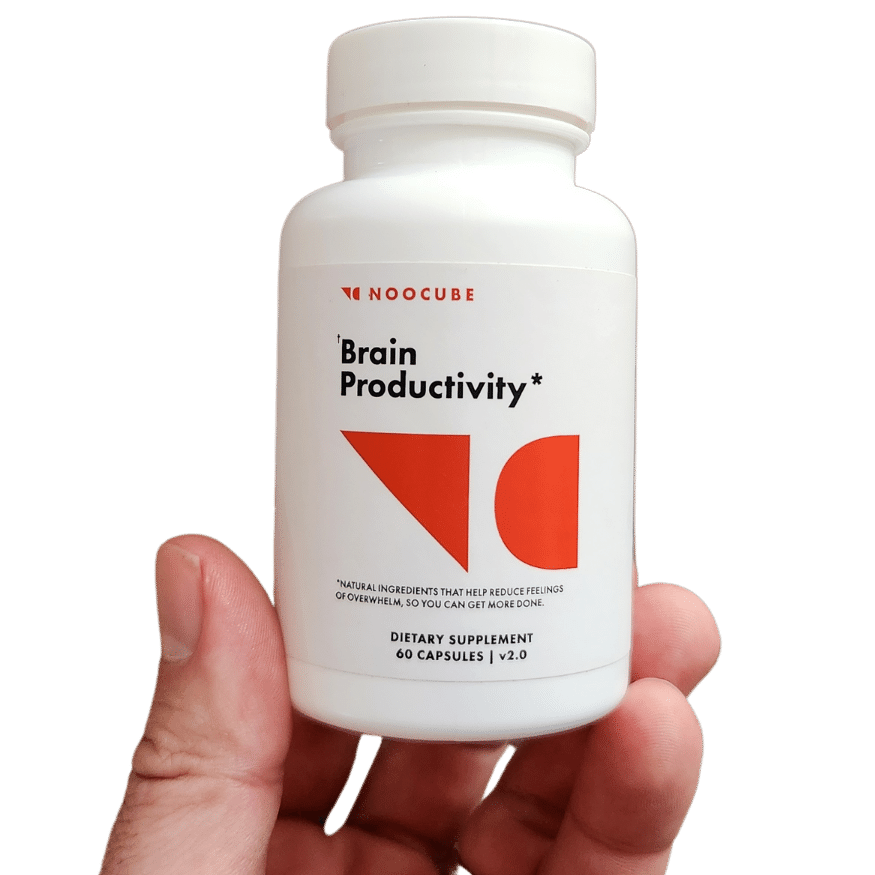
Quick Verdict
Thesis has a range of suitable nootropic blends to cater to many needs.
However, our #1 nootropic of choice is NooCube. It’s designed for long-term brain changes, not just short-term boosts in mental performance.
What Is Thesis Nootropics?
Thesis Nootropics is a company that specializes in customized cognitive performance products. Dan Freed founded it in 2017.
Freed’s personal challenges with focusing, which he faced from a young age, led him to discover nootropics.
This personal journey of transformation through nootropics inspired him to create Thesis, aiming to help others find the right combination of nootropic ingredients that work for them.
The company’s unique approach involves allowing customers to experiment with high-quality nootropic ingredients to maximize results systematically.
Thesis has gained popularity primarily through word-of-mouth and a strong focus on personalization.
The company has raised over $13.5 million in funding and is reportedly profitable with a robust growth trajectory.
Thesis has garnered support from health and wellness advocates like Dr. Andrew Huberman, Rich Roll, Kevin Love, and Kate Bock.
Thesis Nootropics
Customized Blends For Cognitive Enhancement
Take the quiz and see which blends are right for you.

Thesis Nootropic Ingredients
Thesis have six unique blends designed to target various aspects of cognitive function. What’s similar between them is the option to include or exclude caffeine and L-theanine. The caffeine and l-theanine combination is the most potent instant nootropic, making each blend effective.
The caffeine L-theanine stack benefits physical and cognitive function. Some advantages include faster reaction time, faster visual processing speed, better working memory, increased awareness, and less tiredness and mental fatigue [1] [2] .
The research employs a 2:1 L-theanine to caffeine ratio, which Thesis has followed. Since this stack is available in every blend, I won’t include it in the ingredients breakdown below.
Thesis Clarity Blend
Alpha gpc (speculative).
Alpha GPC, a choline-containing phospholipid, improves cognitive function in neurological conditions like dementia [3] .
Research indicates it enhances memory and attention and may support brain health. Clinical trials show it can improve cognitive performance, especially when combined with other treatments like donepezil [4] .
It’s generally well-tolerated and safe. Alpha GPC increases acetylcholine levels in the brain, which is essential for memory and learning [5] .
It’s used both as a medicine and a nutritional supplement. Studies suggest Alpha GPC effectively boosts cognitive functions, particularly in adult-onset dementia disorders [6] .
Thesis Clarity Blend contains 500 mg, which is more than any other nootropic available.
Lions Mane Mushroom (Speculative)
The Lion’s Mane mushroom (Hericium erinaceus) includes chemicals that stimulate nerve growth factor (NGF) synthesis, which is necessary for nerve cell proliferation and differentiation [7] .
According to research, Lion’s Mane improves cognitive abilities, particularly memory and brain cell regeneration [8] .
It is renowned for its neuroprotective qualities, which may be effective in treating illnesses such as Alzheimer’s disease and cognitive impairment [9] .
Brain functioning, memory, and mood improvements have been linked to regular ingestion [10] .
While the mushroom does not directly improve cognitive skills, it does increase NGF, which improves brain health [11] . The dosage varies but is generally well-tolerated and has few negative effects.
Thesis Clarity contains 500 mg of Lions Mane, which may give a long-term nootropic effect.
Mycelium is typically avoided since the active chemicals are found in the primary mushroom. Jeff Chilton, a long-time mushroom researcher, discusses this in the podcast below:
Camellia Sinensis Tea Leaf (Speculative)
Camellia Sinensis, commonly known as tea, exhibits varying neuropharmacological effects based on the part of the plant used.
Seed extracts tend to be more stimulating, enhancing motor functions and showing potential as an antidepressant without causing drowsiness.
Leaf extracts, on the other hand, tend to produce a calming effect on the mind and mood. Both seeds and leaves have shown positive results in various tests assessing motor function and behavior in animal models [12] .
The study suggests these parts of the Camellia Sinensis plant have potential as cognitive enhancers, warranting further research, especially on seed extracts for their mode of action and possible new beneficial compounds.
I couldn’t find any human studies for this ingredient, so I can’t give you an efficacious dose range. But Thesis Clarity contains 278 mg of Camellia Sinensis Tea Leaf.
Dihydroxyflavone
Dihydroxyflavone research is all performed in rodents, so extrapolating to humans is rather challenging. 7,8-Dihydroxyflavone (7,8-DHF) is a compound that acts as an agonist for the TrkB receptor, which is associated with brain-derived neurotrophic factor (BDNF).
BDNF is crucial for neuronal survival and brain plasticity. Studies have shown that 7,8-DHF can improve memory and cognitive functions [13] .
It enhanced memory formation in healthy rats and improved spatial memory in Alzheimer’s disease mouse models [14] .
Further, 7,8-DHF has been shown to counteract aging-related cognitive impairments in rats, improving spatial memory and synaptic plasticity in the hippocampus [15] .
This suggests that 7,8-DHF is a potential therapeutic agent for memory impairment and dementia, at least in rodents.
Thesis Energy Blend Ingredients
Citicoline is commonly mentioned in relation to memory enhancement. Studies have shown that 500 mg daily may improve episodic memory or the ability to recall personal experiences and specific events [16] .
According to other research, taking at least 500 mg of this supplement daily may provide cognitive benefits to healthy persons [17] .
The formulation of Thesis Energy Blend contains 300 mg of Citicoline. This dose may not achieve the full potential seen in studies proposing a higher dose.
Mango leaf extract, rich in the polyphenolic compound mangiferin, shows promise in neuropharmacology due to its anti-inflammatory, antioxidant, and antidiabetic properties.
Studies indicate its potential in treating central complications associated with metabolic disorders like type 2 diabetes, which are risk factors for Alzheimer’s disease and vascular dementia [18] .
In animal models, mango leaf extract has demonstrated effects on reducing brain inflammation and spontaneous bleeding and improving cognitive functions [19] .
These findings suggest its utility in addressing symptoms of neurodegenerative diseases and cognitive impairments [20] .
Thesis Energy contains 300 mg of mango leaf.
Theacrine is a purine alkaloid similar to caffeine. It is found in the Camellia kucha plant and is often included in dietary supplements.
Studies show that it can increase energy, focus, and cognitive performance, similar to caffeine, but without habituation [21] .
Theacrine’s impact on cognitive performance and physical endurance has been researched in athletes, indicating possible benefits in reaction time and endurance [22] .
It may enhance cognitive function and physical performance, either alone or in combination with caffeine [23] .
Theacrine appears to be a promising supplement for improving mental alertness and physical capacity. Theacrine manufacturers fund some of these studies.
Thesis Energy contains 100 mg of Theacrine, which tends to be less than the dose used in these studies, suggesting it may have a weaker effect.
N-Acetyl Cysteine
N-acetyl cysteine (NAC) is explored for its potential to improve cognitive functions in psychosis and bipolar disorder due to its antioxidant, neurogenesis, and anti-inflammatory properties.
Studies show N-acetyl cysteine can improve working memory in psychosis [24] . However, results in bipolar disorder didn’t show significant cognitive improvements [25] .
Research indicates potential benefits for Alzheimer’s disease by promoting cognitive health and countering oxidative stress [26] .
To confirm its benefits, the effectiveness of N-acetyl cysteine in various cognitive disorders still requires more targeted, larger studies [27] .
N-acetyl cysteine’s role is promising but not yet firmly established in cognitive enhancement.
In human trials, a 600 – 2000 mg dose seems needed for cognitive benefits. Thesis Energy contains 500 mg, which is potentially underdosed.
Indian Trumpet Tree
Indian Trumpet Tree is known as Oroxylum indicum. In a 12-week study, older adults with memory complaints took 500 mg of Oroxylum indicum extract twice daily [28] .
Compared to a placebo, this supplementation improved episodic memory and numeric working memory. It also accelerated learning in location tasks.
However, there were no significant changes in other cognitive tests or overall cognitive and memory skills.
The study suggests that Oroxylum indicum, while well-tolerated, may primarily enhance specific memory functions.
Its potential effects could be linked to its antioxidant and anti-inflammatory properties and interactions with neurotransmitters like dopamine and GABA.
This is the only human study on the Indian Trumpet Tree, so more research is needed to fully understand its impact on cognitive health. Thesis Energy only contains 100 mg of this, making it potentially underdosed.
L-tyrosine, an amino acid, has been shown to increase dopamine levels in the brain. L-tyrosine supplementation has improved cognitive regulation, particularly in mentally demanding settings [29] .
It is especially helpful in improving cognitive flexibility, which is impacted by dopamine.
While L-Tyrosine’s promise for treating clinical problems and improving physical activity is limited, it is useful in stressful or cognitively taxing situations.
It has the greatest cognitive benefits when neurotransmitter activity is intact, but dopamine and norepinephrine levels are momentarily decreased [30] .
According to research, optimal doses for cognitive improvement begin at a minimum of 2 grams. That is more than six times the dose in Thesis Energy.
Thesis Creativity Blend Ingredients
Thesis Creativity contains 150 mg of Alpha GPC, yet their Clarity Blend contains 500 mg. I’m not sure why there is a large discrepancy, especially when 500 mg is likely a more efficacious dose.
Agmatine Sulfate
Currently, agmatine sulfate has only been tested in rodents. It is a central nervous system (CNS) neurotransmitter/neuromodulator that has been studied for its potential effects on stress-related conditions like depression, anxiety, and cognitive performance.
Research suggests that agmatine can have antidepressant and anxiolytic (anxiety-reducing) effects, possibly related to its influence on the nitric oxide pathway [31] .
It may reduce oxidative stress and corticosterone levels while increasing brain-derived neurotrophic factor (BDNF), which is beneficial for brain health.
In animal studies, agmatine sulfate has been shown to be safe and well-tolerated, with oral administration effectively increasing its levels in the brain [32] .
This indicates potential for therapeutic use in neurological disorders, though more research is needed to fully understand its effects and mechanisms.
Thesis Creativity contains 250 mg. In these studies, patients were administered 15-600 mg per kg, which is a much higher dose.
Panax Ginseng
Panax ginseng is available in two varieties: white ginseng and red ginseng. It has vasorelaxant and moderately hypotensive effects on nitric oxide generation in the body [33] .
It increases antioxidant enzyme activity and may prevent oxidative damage associated with aging in rats [34] .
Ginseng has shown promise in boosting memory, particularly in age-related cognitive decline, as well as in improving mental and physical resilience, reducing fatigue, and assisting the body in adapting to stress [35] .
Daily doses of 200 mg extract or 0.5 to 2 g dry root are recommended. It is not suggested for persons with acute asthma or hypertension because it may cause overstimulation and elevate blood pressure in excessive dosages.
Thesis Creativity has an effective dose of 200 mg, which may provide you with these mental performance benefits.
Ashwagandha Root
Ashwagandha is a traditional herbal remedy used to improve various health conditions. Animal studies have shown that it can increase blood cell counts, which might enhance aerobic capacity [36] .
It also demonstrates the potential to reduce oxidative stress and lipid peroxidation, which could be beneficial in treating disorders like tardive dyskinesia [37] .
Additionally, Ashwagandha has shown nootropic effects and might be useful in treating Alzheimer’s disease [38] . Recommended dosages range from 6 to 10 grams of ground roots or 100 to 1250 mg of extract daily [39] [40] .
It’s generally safe but should be used cautiously, especially in cases of hyperthyroidism or pregnancy. High doses can have sedative effects and may cause gastrointestinal issues.
Thesis Creativity contains 300 mg of Ashwagandha, which is within the recommended range for cognitive benefits.
Sceletium Tortuosum
Sceletium tortuosum, also known as Kanna, is traditionally used for its mood-enhancing properties. It’s been studied for its potential in treating cognitive and neurodegenerative disorders like Alzheimer’s and Parkinson’s [41] .
Research suggests its constituents could target enzymes and receptors relevant to these diseases, offering neuroprotective benefits like antioxidant activity [42] .
Additionally, Sceletium Tortuosum is known for its antidepressant and anxiolytic effects, promoting relaxation and well-being, which could be beneficial in managing stress, anxiety, and depression [43] .
The plant’s bioactive alkaloids are also being explored for commercial medicinal use.
The 25 mg dose in Thesis Creativity is the same as used within the human trials.
Thesis Motivation Blend Ingredients
L-phenylalanine.
L-phenylalanine is a vital amino acid and has been explored for its potential benefits in managing conditions like attention deficit disorder and depression.
Studies have shown that doses of up to 1200 mg show initial improvements in mood and attention in individuals with attention deficit disorder, but tolerance develops over 2-4 months [44] .
In another study involving depressed patients, a dosage range of 75–200 mg/day for 20 days led to significant improvements in 12 out of 20 patients [45] .
However, the effectiveness and safety of L-phenylalanine can vary, and it is used in the treatment of various conditions, including depression and arthritis, and even as part of addiction recovery [46] .
Thesis Motivation has a 500 mg dose, which may provide some of these benefits. Will it improve motivation? I’m not sure.
Methylliberine
Methylliberine is a purine alkaloid explored for its cognitive and mood-enhancing effects. Studies have shown it can improve concentration, motivation, and mood, especially when combined with caffeine.
Methylliberine also appears to positively affect energy levels and well-being without significantly impacting vital signs like heart rate and blood pressure [47] .
These findings suggest its potential as a nootropic supplement, particularly for enhancing cognitive function and mood in various contexts, such as gaming or in tactical scenarios [48] [49] .
However, it’s essential to consider the dosage and combination with other compounds like caffeine for optimal effects.
The 100 mg dose in Thesis Motivation aligns with the current research.
Vitamin B12 (Speculative)
Vitamin B12 is essential for cognitive health and may be linked to neurodegenerative diseases like Alzheimer’s and Parkinson’s.
Low levels of B12 are associated with cognitive impairment, but supplementation is only shown to be effective in improving cognition in cases of existing B12 deficiency [50] .
There is limited evidence that increasing B12 levels benefits people without B12 deficiency [51] .
B12’s impact on cognitive health may involve multiple mechanisms, including brain volume and function [52] . However, more extensive research is needed to fully understand its effects and potential as a cognitive enhancer.
Thesis Motivation contains 1000mcg. The research states that it may have no effect if you’re not Vitamin B12 deficient.
Forskolin (Speculative)
Forskolin has only been studied in rodents regarding cognitive function. Forskolin is an herbal extract that shows the potential to improve memory and reduce Alzheimer’s disease symptoms.
Studies have shown that it restores nest-building and social behaviors in mice with Alzheimer’ s-like symptoms, reduces amyloid plaque deposition, and regulates brain inflammation [53] .
Forskolin also influences memory and tau protein phosphorylation in the brain, which is relevant in Alzheimer’s [54] .
Additionally, forskolin has shown protective effects against Huntington’s disease-like neurodegeneration in rats by improving learning and memory and reducing oxidative stress [55] .
These findings indicate forskolin’s potential as a neuroprotective agent for certain neurological conditions, at least in rodents.
I’m skeptical whether 250 mg of Forskolin in Thesis Motivation will help you “feel” more motivated.
Artichoke (Speculative)
Artichoke extract is known for its prebiotic properties and promotes probiotic bacteria growth in the gut, potentially benefiting cognitive functions in mice [56] .
In elderly individuals with mild cognitive impairment, combining artichoke extract and aerobic training improved cognitive status and reduced blood glucose and insulin resistance [57] .
Artichoke varieties Spinoso Sardo and Romanesco Siciliano demonstrated antioxidant properties and potential protective effects against cardiovascular and neurodegenerative disorders, with Romanesco Siciliano showing higher antioxidant power [58] .
The 450 mg dose is well under the dose used in these studies.
Thesis Confidence Blend Ingredients
Saffron (speculative).
Saffron is traditionally used in herbal medicine and shows promise in improving cognitive function in individuals with Alzheimer’s Disease (AD) and Mild Cognitive Impairment (MCI) [59] .
Research indicates that saffron’s effectiveness is comparable to common drugs used for these conditions without increasing side effects. It’s also well-tolerated in cognitively normal individuals [60] .
However, most current studies have a high risk of bias. More comprehensive, low-bias clinical trials are needed to confirm saffron’s potential as a treatment for cognitive impairments like AD and MCI.
All of the research used 30 mg of saffron daily. Thesis Confidence has 28 mg, and I’m unsure why they formulated it without the extra 2 mg.
Magnesium Bisglycinate
Magnesium is essential for brain functions and has been researched for its potential cognitive benefits. Magnesium is particularly effective in increasing brain magnesium levels and has shown promise in improving memory and cognition in healthy adults [61] .
However, its role in anxiety and mood disorders is less clear [62] .
Studies indicate magnesium may help reduce symptoms of depression, but results are not consistent across all mental health conditions [63] .
Further research is needed to conclusively establish magnesium’s effectiveness and appropriate use as a therapeutic supplement in various psychiatric and cognitive disorders [64] .
500 mg of magnesium may help if you’re deficient, but there’s no clear benefit to making you more confident.
Sage (Speculative)
Sage, also known as Salvia, has traditionally been known to enhance memory. A recent study supports this, showing that acute ingestion of sage oil can significantly improve immediate word recall in healthy young adults [65] .
This suggests that sage may positively influence cognitive functions like memory, potentially due to its acetylcholinesterase inhibition activity in the brain.
However, this has not been replicated.
While historically used for various mental disorders, such as depression and age-related memory loss, contemporary research is needed to fully understand its benefits and potential as a cognitive enhancer.
Regardless of the 333 mg dose, this is one of the more speculative ingredients in all Thesis blends.
Sceletium Tortuosum (Speculative)
As mentioned in the Creativity Blend, Sceletium Tortuosum is known for its mood-enhancing properties. The same 25 mg dose is used in human trials.
Magnolia Bark (Speculative)
Magnolia officinalis is commonly used in traditional medicine for mental disorders like anxiety and depression and shows potential as a nootropic supplement.
Studies have demonstrated that its ethanol extract can improve cognitive function and memory in stress-induced situations. It also exhibits anxiolytic properties, reducing anxiety-related behaviors in rats [66] .
The extract’s effectiveness is also evident in lowering stress-induced increases in corticosterone and tyrosine hydroxylase levels.
Moreover, Magnolia officinalis, especially its component honokiol, has neuroprotective effects and can regulate mood disorders by modulating GABA and CB1 receptors in rats [67] .
These are rodent studies, so they cannot be extrapolated to humans. Regardless, they are included based on the mechanistic data and the theory that the 10 mg dose does the same thing in humans.
Ashwagandha Leaf & Root
The 120 mg of root and leaf ashwagandha may be enough to have a nootropic effect as the extract dose is between 100-1200 mg, as stated in the Creativity Blend section. However, this is root and leaf, and the main benefits are derived from the root.
Thesis Logic Blend Ingredients
Ginko biloba.
Ginkgo biloba is extracted from the leaves and fruit to improve cognitive function. Its compounds include antioxidants, enhance blood flow, and have anti-inflammatory properties.
Ginkgo biloba extract has been shown in animal studies to help with chronic brain difficulties by modifying inflammatory mediators and the cholinergic system [68] .
Clinical trials have shown it to improve working memory and processing speed [69] . However, its usefulness in healthy people under the age of 60 is debatable [70] .
Typical daily doses vary from 120 to 300 mg. Although side effects are uncommon, they can include stomach irritation and headaches, which may cause blood to thin, affecting people on certain drugs.
Thesis Logic contains 160 mg of Ginkgo Biloba, which is within the recommended dosage range.
Theobromine
Theobromine is a compound found in chocolate and has been studied for its potential cognitive effects.
Research indicates that theobromine might have a lesser immediate nootropic effect compared to caffeine but could have neuroprotective benefits with long-term consumption, possibly reducing Alzheimer’s disease-related pathology [71] .
Further studies are needed to fully understand its impact on cognition.
Additionally, theobromine’s effects on mood and vigilance appear to be different from caffeine, with some studies suggesting it might not significantly influence these aspects in nutritionally relevant doses [72] .
However, combining theobromine with caffeine could modify its effects, potentially offering cognitive and mood benefits without significant blood pressure increases [73] .
More research is required to confirm theobromine’s cognitive and mood-related effects.
Thesis Logic contains 100 mg of theobromine, but it seems doses greater than 400 mg are needed to enhance cognition.
Phosphatidylserine
Phosphatidylserine is essential for proper brain function. Phosphatidylserine has been proven to be critical for maintaining nerve cell membranes and myelin, which is required for successful neurotransmission [74] .
Phosphatidylserine can help reverse cognitive loss as the brain ages by boosting cognitive activities such as memory formation, learning, concentration, and problem-solving [75] .
It is well absorbed in humans and crosses the blood-brain barrier.
Supplements containing phosphatidylserine have been shown to increase cognitive functions and are generally well-tolerated. Dosages ranging from 100 to 800 mg per day are advised for cognitive support [76] [77] .
Thesis Logic contains 400 mg of phosphatidylserine, which may provide you with these cognitive-enhancing effects.
High DHA Algae
DHA is a vital component of neuronal membranes and plays an important role in brain health and cognitive function.
DHA consumption improves adult cognitive abilities, especially when paired with eicosapentaenoic acid (EPA) [78] .
This impact is most noticeable in older people who have mild memory problems. Higher DHA and EPA doses (above 1 g per day) have been associated with better episodic memory.
Observational studies also show a link between DHA/EPA intake and memory performance in the elderly. DHA, both alone and in combination with EPA, improves memory in the elderly.
Thesis Logic contains 200 mg of DHA, suggesting insufficient DHA to provide a benefit.
Triacetyluridine (Speculative)
Triacetyluridine is being explored as a potential treatment for bipolar depression. In a study involving eleven patients with bipolar depression, high doses of triacetyluridine (up to 18 g per day) were administered over 6 weeks [79] .
The study measured the effects on depression symptoms using the Montgomery-Asberg Depression Rating Scale (MADRS) and evaluated cellular bioenergetics using phosphorus magnetic resonance spectroscopic imaging (P-MRSI).
Results indicated significant early improvement in depression symptoms.
Additionally, triacetyluridine responders showed notable differences in pH changes from baseline, suggesting triacetyluridine may improve mitochondrial function and reduce symptoms of depression.
Thesis Logic has 30 mg of triacetyluridine, which is well below the dose used in this study.
Bacopa Monnieri
Bacopa monnieri is a traditional plant that has been shown to improve cognitive performance, particularly memory.
Studies have demonstrated that bacopa extract, specifically bacosides A and B, increases memory formation, recall, and cognitive function [80] .
It has neuroprotective properties and is used to treat cognitive dysfunctions such as Alzheimer’s disease.
Adults should take between 200 and 400 mg each day. Bacopa is generally well accepted, with only rare reports of mild drowsiness or stomach difficulties.
Clinical trials show that older people have better memory, attention, mood, and overall cognitive ability [81] [82] [83] . However, more research is needed to thoroughly grasp its usefulness across many cognitive domains.
Thesis Logic contains 320 mg of Bacopa, giving you the efficacious dose to feel these benefits.
Thesis Nootropics Price

Thesis has two options: one time purchase or a subscription. Here’s how the prices break down:
- Subscription = $79
- One Time Purchase = $119
This is regardless of whether you purchase a personalized starter kit or build your own box.
You can’t buy them individually, either. You must purchase four boxes. When building your own, you can choose whether you want four of the same blend or mix and match.
They want you to try each blend for a week as part of the starter kit (there’s only a week’s worth of each blend in each container) to see which you like best.
Thesis has positioned itself as the most expensive nootropic available by adding the personalized element.
Is Thesis Nootropics Really Personalized?
I went through the initial quiz to see how they “personalize” their nootropic stack.

Here is what they recommended me:

Look, I get the marketing angle. In no way is this a truly personalized nootropic product. It’d be nearly impossible to create custom formulations for every unique individual.
However, the fact they have multiple blends means people can experiment to find which works best for them.
I will say, though, that if you choose the caffeine options, every blend will work. Many of the ingredients used in these blends are speculative and only based on animal research, and many are underdosed.
Benefits Of Thesis Nootropics
Multiple blends for different purposes.
To be honest, this benefit is more of a marketing tactic. However, some people may find certain blends jive well with them over others, giving you options within the same brand.
Further, Thesis claims the ingredients in each formulation work synergistically. There’s no research to back that claim, but at least know there are no negative side effects from their interaction.
Options For Stimulants Or Not
You can choose whether or not to include stimulants in your Thesis Blends. If you add the caffeine and L-theanine nootropic stack, the most potent synergistic brain booster, every blend will provide similar benefits.
However, if you’re already a coffee addict or plan to take Thesis in the evening, having no stimulants is the better option.
My Experience With Thesis
Based on my quiz, I was recommended Thesis Clarity, Logic, Motivation, and Confidence Blends. I tried each for a week to see if one stood out. I took them without caffeine as they all work if you have the caffeine L-theanine stack.
I have to say the Confidence and Motivation Blends did absolutely nothing for me. I didn’t “feel” any brain-boosting effects or feel more confident or motivated.
The Logic and Clarity Blends had small positive effects on my concentration on mentally demanding tasks like writing, coaching, or podcasting.
If I were to continue taking Thesis, I’d opt for either of these two blends.
Who Is Thesis For?
Busy working professionals.
Thesis Nootropics are ideal for busy professionals facing demanding schedules and high-stress environments. These blends can help enhance focus, improve decision-making, and increase productivity.
They are designed to support sustained mental energy throughout the day, enabling professionals to manage their workload more effectively without the usual mental fatigue.
Creative Artists
For creative artists, Thesis offers blends that stimulate creativity and enhance divergent thinking. These nootropics can help break through creative blocks, foster innovative thinking, and maintain a heightened state of inspiration.
They are particularly beneficial for artists seeking longer periods of creative flow and those seeking fresh perspectives.
Students can significantly benefit from Thesis Nootropics, especially during intense studying or when facing challenging academic projects.
The blends are formulated to enhance memory retention, improve concentration, and boost learning capabilities. This makes them a valuable tool for students who need to absorb and retain large amounts of information and perform well in academic assessments.
Gamers find Thesis Nootropics beneficial for improving their gaming performance. The blends can enhance reaction times, increase focus, and improve strategic thinking skills.
They are particularly useful during long gaming sessions, helping gamers stay alert and responsive, which is crucial in competitive gaming scenarios.
Coffee Haters
Thesis Nootropics provides an excellent alternative for those who dislike coffee or want to avoid caffeine jitters.
These blends offer a way to boost mental energy and alertness without relying on caffeine. This makes them ideal for individuals sensitive to caffeine or those seeking to reduce caffeine intake while maintaining high cognitive function.
User Testimonials And Reviews
You can’t access the review database on the Thesis website, so I did some digging to find user reviews. Here’s a couple of positive reviews:
“I must admit that during the weeks that I consistently take them, I perform better & I generally feel better just knowing I’ve ingested something intended to positively alter my natural brain state. Minor tasks/chores no longer seem as daunting and I get this underlying kick to complete my work well.” – ParsnipExtreme2502 (Reddit)
“I didn’t find Weeks 1 and 4 to do anything for me, but Weeks 2 and 3 really helped avoid the post-lunch, post-work slumps I tend to get now that I’ve been working from home; Energy is especially useful for days when I haven’t gotten enough sleep the night before.” – leftylucy88 (Reddit)
I can’t find many negative reviews other than potential side effects like migraines, which can be caused by many different factors.
Thesis Side Effects
Side effects are rare from the ingredients in these blends. I personally didn’t have any adverse reactions to the four blends I tried. However, like any supplement, they may have potential side effects.
Consult with a healthcare provider before starting any nootropic regimen, especially if they have pre-existing health conditions, are pregnant or breastfeeding, or are taking other medications.
Thesis Alternatives
If Thesis Nootropics isn’t quite the right match for you or you’re just curious about other products, here are some alternatives I’ve tried and can provide an insider’s look into.

SAP Nutra nootropic Nooceptin improves memory, concentration, and cognitive performance without stimulants. It offers gradual brain health gains.
It improves memory and focus and provides a prolonged boost without a caffeine crash. Students, gamers, professionals, and seniors should use Nooceptin to boost cognition.
This brain supplement contains Lion’s Mane Extract, Citicoline, rhodiola rosea extract, L-theanine, Bacopa Monnieri, ginkgo biloba, and panax ginseng.
Some of these compounds have been shown to be useful, but others are experimental. Nooceptin, a non-stimulant method for long-term cognitive enhancement, usually works after 7-14 days.
Despite the risk of underdosed components and increased cost, Nooceptin may provide a stimulant-free cognitive boost.
Read more in our Nooceptin review .
Mind Lab Pro

Mind Lab Pro is a popular nootropic that has gained appeal as a result of its alleged cognitive benefits.
Pure substances are used in its formulation, which is intended to improve mental clarity and attention. It is stimulant-free, making it an excellent choice for anyone seeking a well-rounded routine.
Its unique combination of 11 research-backed components distinguishes it from competitors in the brain health supplement sector.
These compounds were carefully chosen to help cognitive processes like memory, focus, mental clarity, mood, and cognitive processing speed.
Despite some criticism about the quantity of specific substances and the need for more scientific data, Mind Lab Pro has earned worldwide recognition for its ability to improve cognitive performance in professionals, students, the elderly, and athletes.
Our Mind Lab Pro review goes into great detail.

Braini distinguishes itself by being stimulant-free, providing long-term results, and having a short ingredient list focusing on long-term cognitive gains. It does not, however, deliver the immediate euphoric boost that some users may expect from a brain supplement.
Peptylin, a silk protein peptide with neuroprotective effects and potential benefits for executive function; NeurXcel, which is rich in omega fatty acids; and Wild Canadian Blueberry extract, which is known for its antioxidant characteristics and cognitive support, are all key ingredients in Braini.
Braini is backed by clinical trials, a 60-day money-back guarantee, and a 30-day challenge to scientifically quantify changes in brain function.
Our Braini review contains an in-depth breakdown.

Vyvamind is a nootropic supplement containing caffeine and L-theanine. It helps users focus and improve cognitive performance. Users claim increased focus, vitality, and cognitive abilities without big crashes.
Vyvamind’s formulation, which contains less L-tyrosine and citicoline than some studies suggest, is intended to supplement the major nootropic duo of caffeine and L-theanine.
This combination is well-known for boosting concentration and cognitive function. The supplement is touted as a non-stimulant alternative, appealing to clients seeking a more natural and less intensive approach to cognitive growth.
Vyvamind is suitable for coffee-averse people, busy professionals who require a focus boost, and students during study sessions.
Our Vyvamind review goes into great detail.

Because of its purported fast cognitive effects, NooCube is a popular brain-boosting product. It contains ingredients such as Bacopa Monnieri, L-tyrosine, and L-theanine.
These are well-known for their mental health advantages. However, several compounds, such as Huterzine-a and Alpha GPC, remain speculative without additional investigation.
NooCube is intended to improve cognition and alertness without using stimulants, and the amounts of each ingredient are clearly labeled.
Because it gives different cognitive benefits without the jittery side effects associated with caffeine, NooCube is especially good for working professionals, students, elders, gamers, and combat athletes.
Our detailed analysis can be found in our NooCube review .
Frequently Asked Questions
What is thesis nootropic and what does it do.
Thesis Nootropic is a personalized supplement formulated to enhance cognitive functions. Depending on the blend chosen, users can expect improvements in focus, reduction in procrastination, stress management, and memory recall.
Does Thesis Work Like Adderall?
Thesis Nootropics and Adderall are used to enhance cognitive functions, but they are fundamentally different. Adderall is primarily prescribed for treating Attention Deficit Hyperactivity Disorder (ADHD) and narcolepsy.
Adderall is an amphetamine, classified as a controlled substance due to its strong stimulating effects and potential for abuse and dependency.
Thesis Nootropics are dietary supplements designed to enhance healthy individuals’ cognitive functions, such as memory, focus, and mental clarity. They are not intended to treat medical conditions like ADHD.
How Long Does It Take Thesis Nootropics To Work?
If you have the caffeine version, within 30 minutes. You may feel the non-stimulant blends kicking in just as quickly, but they won’t be as pronounced. Sometimes, they can take multiple weeks to feel them working.
I’ve explored the world of nootropics and shared my firsthand experience with Thesis Nootropic’s various blends. While personalization is nothing more than a marketing tactic, the different blends are a nice touch for those who want to experiment with different ingredients.
- Haskell, C. F., Kennedy, D. O., Milne, A. L., Wesnes, K. A., & Scholey, A. B. (2008). The effects of L-theanine, caffeine and their combination on cognition and mood. Biological psychology, 77(2), 113-122.
- Owen, G. N., Parnell, H., De Bruin, E. A., & Rycroft, J. A. (2008). The combined effects of L-theanine and caffeine on cognitive performance and mood. Nutritional neuroscience, 11(4), 193-198.
- Traini, E., Bramanti, V., & Amenta, F. (2013). Choline alphoscerate (alpha-glyceryl-phosphoryl-choline) an old choline-containing phospholipid with a still interesting profile as cognition enhancing agent. Current Alzheimer Research, 10(10), 1070-1079.
- Sagaro, G. G., Traini, E., & Amenta, F. (2023). Activity of Choline Alphoscerate on Adult-Onset Cognitive Dysfunctions: A Systematic Review and Meta-Analysis. Journal of Alzheimer’s Disease, (Preprint), 1-12.
- Kansakar, U., Trimarco, V., Mone, P., Varzideh, F., Lombardi, A., & Santulli, G. (2023). Choline supplements: An update. Frontiers in Endocrinology, 14, 1148166.
- Moreno, M. D. J. M. (2003). Cognitive improvement in mild to moderate Alzheimer’s dementia after treatment with the acetylcholine precursor choline alfoscerate: a multicenter, double-blind, randomized, placebo-controlled trial. Clinical therapeutics, 25(1), 178-193.
- Lai, P. L., Naidu, M., Sabaratnam, V., Wong, K. H., David, R. P., Kuppusamy, U. R., … & Malek, S. N. A. (2013). Neurotrophic properties of the Lion’s mane medicinal mushroom, Hericium erinaceus (Higher Basidiomycetes) from Malaysia. International journal of medicinal mushrooms, 15(6).
- La Monica, M. B., Raub, B., Ziegenfuss, E. J., Hartshorn, S., Grdic, J., Gustat, A., … & Ziegenfuss, T. N. (2023). Acute Effects of Naturally Occurring Guayusa Tea and Nordic Lion’s Mane Extracts on Cognitive Performance. Nutrients, 15(24), 5018.
- Chong, P. S., Fung, M. L., Wong, K. H., & Lim, L. W. (2020). Therapeutic potential of Hericium erinaceus for depressive disorder. International journal of molecular sciences, 21(1), 163.
- Docherty, S., Doughty, F. L., & Smith, E. F. (2023). The Acute and Chronic Effects of Lion’s Mane Mushroom Supplementation on Cognitive Function, Stress and Mood in Young Adults: A Double-Blind, Parallel Groups, Pilot Study. Nutrients, 15(22), 4842.
- Phan, C. W., Lee, G. S., Hong, S. L., Wong, Y. T., Brklja?a, R., Urban, S., … & Sabaratnam, V. (2014). Hericium erinaceus (Bull.: Fr) Pers. cultivated under tropical conditions: isolation of hericenones and demonstration of NGF-mediated neurite outgrowth in PC12 cells via MEK/ERK and PI3K-Akt signaling pathways. Food & Function, 5(12), 3160-3169.
- Rubab, S., Rizwani, G. H., Bahadur, S., Shah, M., Alsamadany, H., Alzahrani, Y., … & Zaman, W. (2020). Neuropharmacological potential of various morphological parts of Camellia sinensis L. Saudi Journal of Biological Sciences, 27(1), 567-573.
- Bollen, E., Vanmierlo, T., Akkerman, S., Wouters, C., Steinbusch, H. M. W., & Prickaerts, J. (2013). 7, 8-Dihydroxyflavone improves memory consolidation processes in rats and mice. Behavioural brain research, 257, 8-12.
- Zeng, Y., Lv, F., Li, L., Yu, H., Dong, M., & Fu, Q. (2012). 7, 8?dihydroxyflavone rescues spatial memory and synaptic plasticity in cognitively impaired aged rats. Journal of neurochemistry, 122(4), 800-811.
- Han, M., Zhang, J. C., Huang, X. F., & Hashimoto, K. (2017). Intake of 7, 8-dihydroxyflavone from pregnancy to weaning prevents cognitive deficits in adult offspring after maternal immune activation. European Archives of Psychiatry and Clinical Neuroscience, 267, 479-483.
- Nakazaki, E., Mah, E., Sanoshy, K., Citrolo, D., & Watanabe, F. (2021). Citicoline and memory function in healthy older adults: a randomized, double-blind, placebo-controlled clinical trial. The Journal of Nutrition, 151(8), 2153-2160.
- Jasielski, P., Pi?del, F., Piwek, M., Rocka, A., Petit, V., & Rejdak, K. (2020). Application of citicoline in neurological disorders: a systematic review. Nutrients, 12(10), 3113.
- Infante?Garcia, C., Jose Ramos?Rodriguez, J., Marin?Zambrana, Y., Teresa Fernandez?Ponce, M., Casas, L., Mantell, C., & Garcia?Alloza, M. (2017). Mango leaf extract improves central pathology and cognitive impairment in a type 2 diabetes mouse model. Brain Pathology, 27(4), 499-507.
- Garcia-Partida, J. A., Torres-Sanchez, S., MacDowell, K., Fernández-Ponce, M. T., Casas, L., Mantell, C., … & Berrocoso, E. (2022). The effects of mango leaf extract during adolescence and adulthood in a rat model of schizophrenia. Frontiers in Pharmacology, 13, 886514.
- Wightman, E. L., Jackson, P. A., Forster, J., Khan, J., Wiebe, J. C., Gericke, N., & Kennedy, D. O. (2020). Acute effects of a polyphenol-rich leaf extract of mangifera indica l.(zynamite) on cognitive function in healthy adults: A double-blind, placebo-controlled crossover study. Nutrients, 12(8), 2194.
- Kuhman, D. J., Joyner, K. J., & Bloomer, R. J. (2015). Cognitive performance and mood following ingestion of a theacrine-containing dietary supplement, caffeine, or placebo by young men and women. Nutrients, 7(11), 9618-9632.
- Dillon, H., & Steven, M. (2021). Theacrine as a Potential Caffeine Alternative for Enhanced Ergogenic and Cognitive Performance in Athletes: A Call to Action and Brief Review. Journal of Exercise and Nutrition, 4(3).
- Bello, M. L., Walker, A. J., McFadden, B. A., Sanders, D. J., & Arent, S. M. (2019). The effects of TeaCrine® and caffeine on endurance and cognitive performance during a simulated match in high-level soccer players. Journal of the International Society of Sports Nutrition, 16(1), 1-10.
- Rapado-Castro, M., Dodd, S., Bush, A. I., Malhi, G. S., Skvarc, D. R., On, Z. X., … & Dean, O. M. (2017). Cognitive effects of adjunctive N-acetyl cysteine in psychosis. Psychological medicine, 47(5), 866-876.
- Dean, O. M., Bush, A. I., Copolov, D. L., Kohlmann, K., Jeavons, S., Schapkaitz, I., … & Berk, M. (2012). Effects of N?acetyl cysteine on cognitive function in bipolar disorder. Psychiatry and clinical neurosciences, 66(6), 514-517.
- Skvarc, D. R., Dean, O. M., Byrne, L. K., Gray, L., Lane, S., Lewis, M., … & Marriott, A. (2017). The effect of N-acetylcysteine (NAC) on human cognition–A systematic review. Neuroscience & Biobehavioral Reviews, 78, 44-56.
- Lopresti, A. L., Smith, S. J., Majeed, M., & Drummond, P. D. (2021). Effects of an Oroxylum indicum Extract (Sabroxy®) on cognitive function in adults with self-reported mild cognitive impairment: a randomized, double-blind, placebo-controlled study. Frontiers in Aging Neuroscience, 13, 728360.
- Steenbergen, L., Sellaro, R., Hommel, B., & Colzato, L. S. (2015). Tyrosine promotes cognitive flexibility: evidence from proactive vs. reactive control during task switching performance. Neuropsychologia, 69, 50-55.
- Jongkees, B. J., Hommel, B., Kühn, S., & Colzato, L. S. (2015). Effect of tyrosine supplementation on clinical and healthy populations under stress or cognitive demands—A review. Journal of psychiatric research, 70, 50-57.
- Gawali, N. B., Bulani, V. D., Gursahani, M. S., Deshpande, P. S., Kothavade, P. S., & Juvekar, A. R. (2017). Agmatine attenuates chronic unpredictable mild stress-induced anxiety, depression-like behaviours and cognitive impairment by modulating nitrergic signalling pathway. Brain research, 1663, 66-77.
- Bergin, D. H., Jing, Y., Williams, G., Mockett, B. G., Zhang, H., Abraham, W. C., & Liu, P. (2019). Safety and neurochemical profiles of acute and sub-chronic oral treatment with agmatine sulfate. Scientific reports, 9(1), 12669.
- Yu, J., Eto, M., Akishita, M., Kaneko, A., Ouchi, Y., & Okabe, T. (2007). Signaling pathway of nitric oxide production induced by ginsenoside Rb1 in human aortic endothelial cells: a possible involvement of androgen receptor. Biochemical and biophysical research communications, 353(3), 764-769.
- Fu, Y., & Ji, L. L. (2003). Chronic ginseng consumption attenuates age-associated oxidative stress in rats. The Journal of nutrition, 133(11), 3603-3609.
- Nocerino, E., Amato, M., & Izzo, A. A. (2000). The aphrodisiac and adaptogenic properties of ginseng. Fitoterapia, 71, S1-S5.
- Ziauddin, M., Phansalkar, N., Patki, P., Diwanay, S., & Patwardhan, B. (1996). Studies on the immunomodulatory effects of Ashwagandha. Journal of ethnopharmacology, 50(2), 69-76.
- Naidu, P. S., Singh, A., & Kulkarni, S. K. (2006). Effect of Withania somnifera root extract on reserpine?induced orofacial dyskinesia and cognitive dysfunction. Phytotherapy Research: An International Journal Devoted to Pharmacological and Toxicological Evaluation of Natural Product Derivatives, 20(2), 140-146.
- Bhattacharya, S. K., Kumar, A., & Ghosal, S. (1995). Effects of glycowithanolides from Withania somnifera on an animal model of Alzheimer’s disease and perturbed central cholinergic markers of cognition in rats. Phytotherapy research, 9(2), 110-113.
- Raut, A. A., Rege, N. N., Tadvi, F. M., Solanki, P. V., Kene, K. R., Shirolkar, S. G., … & Vaidya, A. B. (2012). Exploratory study to evaluate tolerability, safety, and activity of Ashwagandha (Withania somnifera) in healthy volunteers. Journal of Ayurveda and integrative medicine, 3(3), 111.
- Bonilla, D. A., Moreno, Y., Gho, C., Petro, J. L., Odriozola-Martínez, A., & Kreider, R. B. (2021). Effects of Ashwagandha (Withania somnifera) on physical performance: Systematic review and bayesian meta-analysis. Journal of functional morphology and kinesiology, 6(1), 20.
- Chiu, S., Gericke, N., Farina-Woodbury, M., Badmaev, V., Raheb, H., Terpstra, K., … & Goble, L. (2014). Proof-of-concept randomized controlled study of cognition effects of the proprietary extract Sceletium tortuosum (Zembrin) targeting phosphodiesterase-4 in cognitively healthy subjects: implications for Alzheimer’s dementia. Evidence-based complementary and alternative medicine, 2014.
- Luo, Y., Shan, L., Xu, L., Patnala, S., Kanfer, I., Li, J., … & Jun, X. (2022). A network pharmacology-based approach to explore the therapeutic potential of Sceletium tortuosum in the treatment of neurodegenerative disorders. Plos one, 17(8), e0273583.
- Manganyi, M. C., Bezuidenhout, C. C., Regnier, T., & Ateba, C. N. (2021). A chewable cure “kanna”: biological and pharmaceutical properties of Sceletium tortuosum. Molecules, 26(9), 2557.
- Wood, D. R., Reimherr, F. W., & Wender, P. H. (1985). Treatment of attention deficit disorder with DL-phenylalanine. Psychiatry Research, 16(1), 21-26.
- Beckmann, H., Strauss, M. A., & Ludolph, E. (1977). Dl-phenylalanine in depressed patients: an open study. Journal of Neural Transmission, 41(2-3), 123-134.
- Akram, M., Daniyal, M., Ali, A., Zainab, R., Shah, S. M. A., Munir, N., & Tahir, I. M. (2020). Role of phenylalanine and its metabolites in health and neurological disorders. In Synucleins-Biochemistry and Role in Diseases. IntechOpen.
- La Monica, M. B., Raub, B., Malone, K., Hartshorn, S., Grdic, J., Gustat, A., & Sandrock, J. (2023). Methylliberine Ingestion Improves Various Indices of Affect but Not Cognitive Function in Healthy Men and Women. Nutrients, 15(21), 4509.
- La Monica, M. B., Listman, J. B., Donovan, I., Johnson, T. E., Heeger, D. J., & Mackey, W. E. (2021). Effects of TeaCrine®(theacrine), Dynamine™(methylliberine), and caffeine on gamer psychomotor performance in a first-person shooter video game scenario. BioRxiv, 2021-04.
- Cintineo, H. P., Bello, M. L., Chandler, A. J., Cardaci, T. D., McFadden, B. A., & Arent, S. M. (2022). Effects of caffeine, methylliberine, and theacrine on vigilance, marksmanship, and hemodynamic responses in tactical personnel: a double-blind, randomized, placebo-controlled trial. Journal of the International Society of Sports Nutrition, 19(1), 543-564.
- Moore, E., Mander, A., Ames, D., Carne, R., Sanders, K., & Watters, D. (2012). Cognitive impairment and vitamin B12: a review. International psychogeriatrics, 24(4), 541-556.
- Malouf, R., Areosa Sastre, A., & Cochrane Dementia and Cognitive Improvement Group. (1996). Vitamin B12 for cognition. Cochrane Database of Systematic Reviews, 2010(1).
- Tangney, C. C., Aggarwal, N. T., Li, H., Wilson, R. S., Decarli, C., Evans, D. A., & Morris, M. C. (2011). Vitamin B12, cognition, and brain MRI measures: a cross-sectional examination. Neurology, 77(13), 1276-1282.
- Owona, B. A., Zug, C., Schluesener, H. J., & Zhang, Z. Y. (2016). Protective effects of forskolin on behavioral deficits and neuropathological changes in a mouse model of cerebral amyloidosis. J Neuropathol Exp Neurol, 75(7), 618-627.
- Tian, Q., Zhang, J. X., Zhang, Y., Wu, F., Tang, Q., Wang, C., … & Wang, J. Z. (2009). Biphasic effects of forskolin on tau phosphorylation and spatial memory in rats. Journal of Alzheimer’s Disease, 17(3), 631-642.
- Mehan, S., Parveen, S., & Kalra, S. (2017). Adenyl cyclase activator forskolin protects against Huntington’s disease-like neurodegenerative disorders. Neural regeneration research, 12(2), 290.
- Szewczyk, A., Andres-Mach, M., Zagaja, M., Kaczmarczyk-Ziemba, A., Maj, M., & Szala-Rycaj, J. (2023). The Effect of a Diet Enriched with Jerusalem artichoke, Inulin, and Fluoxetine on Cognitive Functions, Neurogenesis, and the Composition of the Intestinal Microbiota in Mice. Current Issues in Molecular Biology, 45(3), 2561-2579.
- Ghahramani, M., Zare, Y., & Kohanpour, M. A. (2021). The Effect of Consuming Artichoke Extract with Aerobic Training on Blood Glucose and Insulin Resistance and Its Relationship with the Cognitive Status in Elderly with Mild Cognitive Impairment. Journal of Sport Biosciences, 13(4), 439-450.
- Iglesias-Carres, L., Bruno, A., D’Antuono, I., Linsalata, V., Cardinali, A., & Neilson, A. P. (2023). In vitro evidences of the globe artichoke antioxidant, cardioprotective and neuroprotective effects. Journal of Functional Foods, 107, 105674.
- Avgerinos, K. I., Vrysis, C., Chaitidis, N., Kolotsiou, K., Myserlis, P. G., & Kapogiannis, D. (2020). Effects of saffron (Crocus sativus L.) on cognitive function. A systematic review of RCTs. Neurological Sciences, 41, 2747-2754.
- Ayati, Z., Yang, G., Ayati, M. H., Emami, S. A., & Chang, D. (2020). Saffron for mild cognitive impairment and dementia: A systematic review and meta-analysis of randomised clinical trials. BMC Complementary Medicine and Therapies, 20, 1-10.
- Zhang, C., Hu, Q., Li, S., Dai, F., Qian, W., Hewlings, S., … & Wang, Y. (2022). A Magtein®, Magnesium L-Threonate,-Based Formula Improves Brain Cognitive Functions in Healthy Chinese Adults. Nutrients, 14(24), 5235.
- Boyle, N. B., Lawton, C., & Dye, L. (2017). The effects of magnesium supplementation on subjective anxiety and stress—a systematic review. Nutrients, 9(5), 429.
- Botturi, A., Ciappolino, V., Delvecchio, G., Boscutti, A., Viscardi, B., & Brambilla, P. (2020). The role and the effect of magnesium in mental disorders: a systematic review. Nutrients, 12(6), 1661.
- Phelan, D., Molero, P., Martinez-Gonzalez, M. A., & Molendijk, M. (2018). Magnesium and mood disorders: systematic review and meta-analysis. BJPsych open, 4(4), 167-179.
- Tildesley, N. T., Kennedy, D. O., Perry, E. K., Ballard, C. G., Savelev, S. A. W. K., Wesnes, K. A., & Scholey, A. B. (2003). Salvia lavandulaefolia (Spanish sage) enhances memory in healthy young volunteers. Pharmacology Biochemistry and Behavior, 75(3), 669-674.
- Lee, H. K., & Lee, U. J. (2015). Effects of Ethanol Extract from Magnolia Officinalis on Anxiety and Cognitive Function. The Journal of Internal Korean Medicine, 36(4), 507-517.
- Borgonetti, V., Governa, P., Manetti, F., Miraldi, E., Biagi, M., & Galeotti, N. (2021). A honokiol-enriched Magnolia officinalis Rehder & EH Wilson. bark extract possesses anxiolytic-like activity with neuroprotective effect through the modulation of CB1 receptor. Journal of Pharmacy and Pharmacology, 73(9), 1161-1168.
- Kim, M. S., Bang, J. H., Lee, J., Han, J. S., Baik, T. G., & Jeon, W. K. (2016). Ginkgo biloba L. extract protects against chronic cerebral hypoperfusion by modulating neuroinflammation and the cholinergic system. Phytomedicine, 23(12), 1356-1364.
- Stough, C., Clarke, J., Lloyd, J., & Nathan, P. J. (2001). Neuropsychological changes after 30-day Ginkgo biloba administration in healthy participants. International Journal of Neuropsychopharmacology, 4(2), 131-134.
- Canter, P. H., & Ernst, E. (2007). Ginkgo biloba is not a smart drug: an updated systematic review of randomised clinical trials testing the nootropic effects of G. biloba extracts in healthy people. Human Psychopharmacology: Clinical and Experimental, 22(5), 265-278.
- Cova, I., Leta, V., Mariani, C., Pantoni, L., & Pomati, S. (2019). Exploring cocoa properties: is theobromine a cognitive modulator?. Psychopharmacology, 236, 561-572.
- Judelson, D. A., Preston, A. G., Miller, D. L., Muñoz, C. X., Kellogg, M. D., & Lieberman, H. R. (2013). Effects of theobromine and caffeine on mood and vigilance. Journal of clinical psychopharmacology, 33(4), 499-506.
- Mitchell, E. S., Slettenaar, M., Vd Meer, N., Transler, C., Jans, L., Quadt, F., & Berry, M. (2011). Differential contributions of theobromine and caffeine on mood, psychomotor performance and blood pressure. Physiology & behavior, 104(5), 816-822.
- Glade, M. J., & Smith, K. (2015). Phosphatidylserine and the human brain. Nutrition, 31(6), 781-786.
- Cenacchi, T., Bertoldin, T., Farina, C., Fiori, M. G., Crepaldi, G., Azzini, C. F., … & Allegro, L. (1993). Cognitive decline in the elderly: a double-blind, placebo-controlled multicenter study on efficacy of phosphatidylserine administration. Aging Clinical and Experimental Research, 5, 123-133.
- Kang, E. Y., Cui, F., Kim, H. K., Nawaz, H., Kang, S., Kim, H., … & Go, G. W. (2022). Effect of phosphatidylserine on cognitive function in the elderly: A systematic review and meta-analysis. ????????, 54(1), 52-58.
- Ma, X., Li, X., Wang, W., Zhang, M., Yang, B., & Miao, Z. (2022). Phosphatidylserine, inflammation, and central nervous system diseases. Frontiers in Aging Neuroscience, 14, 975176.
- Yurko-Mauro, K., Alexander, D. D., & Van Elswyk, M. E. (2015). Docosahexaenoic acid and adult memory: a systematic review and meta-analysis. PloS one, 10(3), e0120391.
- Jensen, J. E., Daniels, M., Haws, C., Bolo, N. R., Lyoo, I. K., Yoon, S. J., … & Renshaw, P. F. (2008). Triacetyluridine (TAU) decreases depressive symptoms and increases brain pH in bipolar patients. Experimental and Clinical Psychopharmacology, 16(3), 199.
- Singh, H. K., & Dhawan, B. N. (1997). NEUROPSYCHOPHARMACOLOGICAL EFFECTS OF THE AYURVEDIC NOOTROPlC BACOPA MONNlERA LINN.(BRAHMI). Indian Journal of Pharmacology, 29(5), 359-365.
- Calabrese, C., Gregory, W. L., Leo, M., Kraemer, D., Bone, K., & Oken, B. (2008). Effects of a standardized Bacopa monnieri extract on cognitive performance, anxiety, and depression in the elderly: a randomized, double-blind, placebo-controlled trial. The journal of alternative and complementary medicine, 14(6), 707-713.
- Kongkeaw, C., Dilokthornsakul, P., Thanarangsarit, P., Limpeanchob, N., & Scholfield, C. N. (2014). Meta-analysis of randomized controlled trials on cognitive effects of Bacopa monnieri extract. Journal of ethnopharmacology, 151(1), 528-535.
- Pase, M. P., Kean, J., Sarris, J., Neale, C., Scholey, A. B., & Stough, C. (2012). The cognitive-enhancing effects of Bacopa monnieri: a systematic review of randomized, controlled human clinical trials. The Journal of Alternative and Complementary Medicine, 18(7), 647-652.
Affiliate Disclosure:
The links provided may earn us a small commission at no additional cost to you if you choose to purchase the recommended product. This support allows our research and editorial team to continue providing high-quality recommendations. As a participant in the Amazon Services LLC Associates Program, an affiliate advertising initiative, we are able to earn advertising fees through providing links to products on Amazon.com. Please rest assured that we only recommend high-quality products.
No related posts.
Submit Video
Report this.
Error: Contact form not found.
Share this video
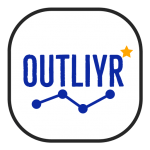
The Best Nootropics Supplements Personalized to Your Brain?
Updated: 01/25/2024
Outliyr is editorially independent. We may get a small commission if you buy through our links (at no cost to you). Thanks for your support!
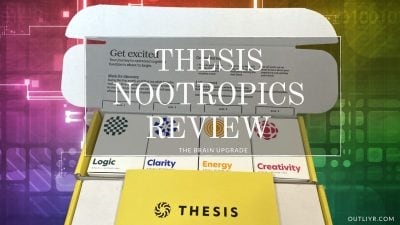
Your brain is a primary difference between winning a Nobel prize and living a life of mediocrity.
How well it functions isn’t solely a matter of genetics.
Neuroscience research, and overwhelming anecdotal experience, show that we can dramatically upgrade our:
- Mental clarity
- Productivity
- Access to the flow state
- Information processing speed
Welcome to the world of “neurohacking”. Using special ingredients and lifestyle practices to optimize the brains and increase our overall quality of life.
But there’s one glaring issue…
Companies making the best brain-boosting supplements recognize this and customize their formulas to your unique lifestyle.
One such nootropic experience is a “newcomer” (you’ll learn why this isn’t exactly true) called Thesis. You take a short brain assessment, they send you a starter kit, and their complimentary coach helps you hone the perfect brain supplements — customized to you!
This post will thoroughly review of TakeThesis, how it compares to other nootropics companies, and whether this is the last brain supplement you’ll need.
In a hurry?
Use the exclusive Thesis code URBAN to save 10%
Quick & Dirty Intro to Nootropics
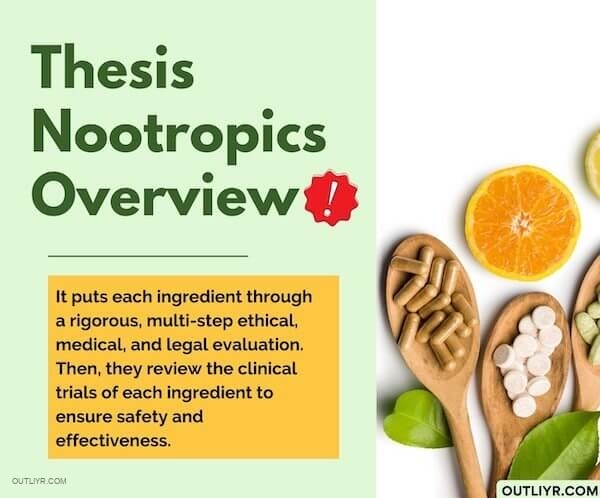
These are different from the off-label use of prescription pharmaceuticals like Adderall.
Essentially, nootropics are a special class of ingredients that satisfy ALL the following criteria:
- Safe and non-toxic
- Enhance learning and memory
- Protect against injury
- Boost natural cognitive ability (memory, logic, creativity, focus, etc)
There’s something that makes them even better…
Nootropics upgrade your baseline performance even after you stop taking them . They cause long-term changes to brain structure and function. Almost like training you how to operate at a higher level and forming positive habits.
At the same time, the good ones provide a quick and noticeable pick-me-up. You don’t wonder if they’re working.
The right formulas help you reach your full potential faster and more effectively.
What is Take Thesis Nootropics?
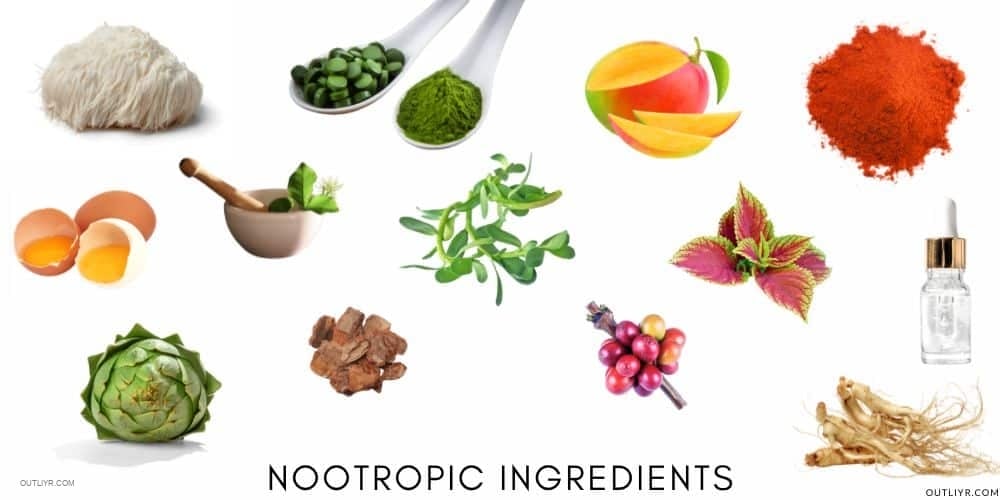
Thesis is the masterpiece of expert brain supplement formulators Dan Freed and Adam Greenfield. This duo began researching nootropics out of personal need. Both struggled with poor cognitive performance. They learned how to balance brain chemistry to maximize performance.
Now they’re sharing their discoveries with the world.
After great success with their original product, Find My Formula (which I reviewed here), they revamped their formulations and process.
While each of us has unique neurochemistries, after working with enough people, they began to spot patterns in which ingredients, the forms of those ingredients, and doses work best. Over the span of years, they’ve amassed a huge dataset:
- 30,000+ users
- 550,000 recommendations made
- 127 ingredients tested
Resulting in 86% of users reporting higher energy levels, better mood, more reliable memory, and greater motivation.
Unsurprisingly, Thesis has garnered a stellar 96% customer satisfaction.
The company also has soul. By donating a portion of each sale to both the Covenant House and The Multidisciplinary Association for Psychedelic Studies (MAPS), they’re evolving the future of brain enhancement and also making it more accessible to the world.
Thesis Nootropics Ingredients
When evaluating any nootropic, you must consider how they source and test ingredients.
The sad truth is that most of the products on the market are WORSE than useless. Contaminated with heavy metals, mycotoxins, pathogens, even adulterated with banned (dangerous) substances.
Thesis puts each ingredient through a rigorous, multi-step ethical, medical, and legal evaluation. Before acquiring and testing the ingredients for safety and purity, every ingredient must be supported as safe and effective by clinical trials.
This team keeps up with the ever-changing regulations.
Since the days of Find My Formula, a lot has changed. Each of their blends has undergone a major overhaul.
One of the common gripes with naturals is that you don’t feel anything.
How Thesis Works
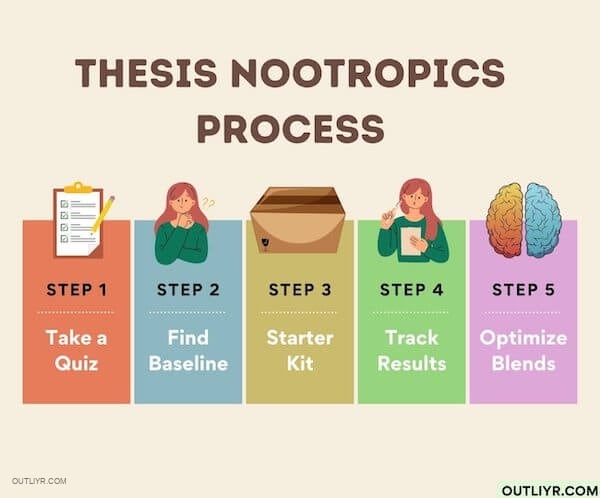
Thesis isn’t your run-of-the-mill supplement company.
They’ve streamlined a process resulting in 86 percent of users finding their neurochemically tuned formulations in less than one month.
This is how to best use Thesis:
- Assess your unique brain
- Establish your baseline
- Begin your Starter Kit
- Notice what works for you and what doesn’t
- Tweak and optimize with complimentary coaching
Your Thesis journey begins with a short survey to understand your basic lifestyle, how your brain functions, and your goals for using nootropics. The entire “quiz” takes just a few minutes. When you finish, their AI finds your “digital twin” to determine which formulations are most likely to work for you.
A few days later, you’ll receive the Thesis Starter Kit in the mail, with the four separate blends best matched to your brain.
I suggest jotting down the way you feel, your challenges, and goals. That way you’ll have something to reference after several weeks of testing. Bonus points for including audio/video in your log.
You’ll follow the directions, testing each product for six days in a row. Then take a break over the weekend, allowing your body to reset. Though you don’t need two days off, I notice better effects when I give my body the extra rest day.
If you’re sensitive, I suggest taking these capsules first thing in the morning.
At any point, you can schedule a call with one of the resident Thesis Nootropics Experts. They’ll help coach you to ensuring the best possible experience and tweak your kit as necessary. Definitely take advantage of the experts, as they’re a key bonus of Thesis !
By the end of the month, you’ll have discovered your favorite blends and the ones that you don’t like. It’s perfectly normal to not like some of them, and your future orders will only include the products you love most.
The Thesis Nootropic Blends for Every Goal
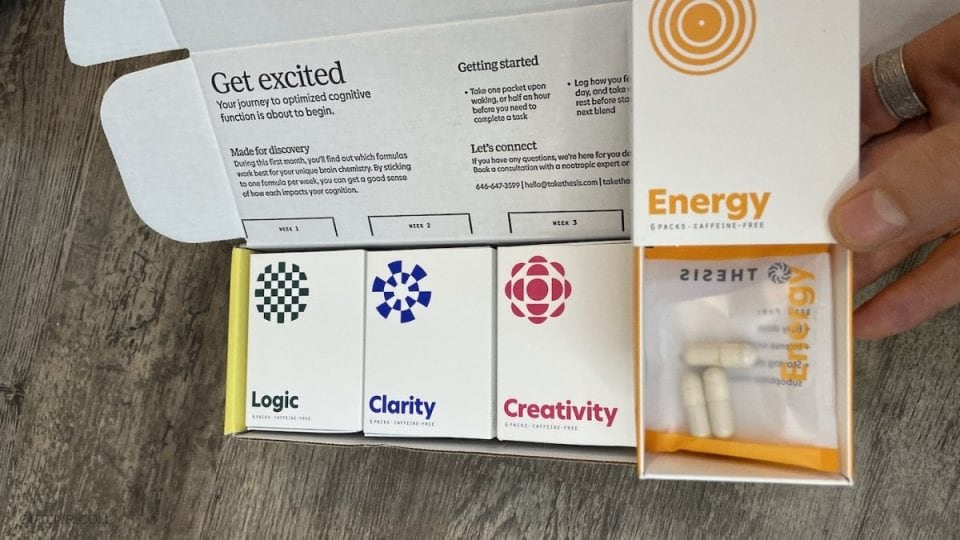
Note that I’ve written about five blends below, but your Starter Kit will only contain four. Once you’ve gone through the Starter Kit, you’ve demoed the blends.
Hopefully, you’ve discovered the ones that work great for you.
For every subsequent order, you get four slots to customize however you prefer. My favorite combo is:
- (2) Clarity
But if I really loved a particular blend, for example, I could just do:
- (4) Creativity
You can request any of the formulations in either of two versions: caffeinated or caffeine-free.
Don’t pay much attention to the names of each. They’re merely general suggestions of the most often reported benefits. It’s entirely possible that you’ll get more clarity from Creativity, or better logical reasoning from Energy.
Let’s examine each of the different blends.
Thesis Energy

I reach for Energy when I get less than 7 hours of sleep, or when I need extra energy to crush a workout and power through a long Monday. It’s also useful for travel days, or when I know I’ll wind up in energy-depleting situations. Others use it to reinforce new healthy habits.
Thesis Energy blend ingredients include:
- Zynamite® – 300mg
- TeaCrine® – 100mg
- Sabroxy® – 100mg
- CDP Choline – 300mg
- N-Acetyl-L-Tyrosine – 300mg
- N-Acetyl Cysteine – 500mg
- Optional: Caffeine – 100mg
- Optional: L-Theanine – 200mg
Sabroxy is an ancient Ayurvedic extract that comes from the bark of the Indian trumpet tree. Research suggests it enhances memory, focus, immunomodulation, mood, and even skin health.
From previous experience, I know that I respond well to Zynamite and TeaCrine. The former is an extract of mango leaf, and the latter is a molecular cousin of caffeine that comes from a tea plant, is non-habit forming, and with fewer side effects. Both noticeably increase energy, as expected. As a bonus, I find that these two also lift my mood.
Compared to the previous Energy formula, this iteration is smoother and more refined. Each sachet contains three capsules, and I start feeling effects 15 minutes after swallowing them.
I’ve been a big fan of all the Energy blends I’ve tested so far. It’s constantly ranked in my top 2 favorites due to the pronounced effects. It feels like a more full-body caffeine without the jitters or crash.
Thesis Clarity
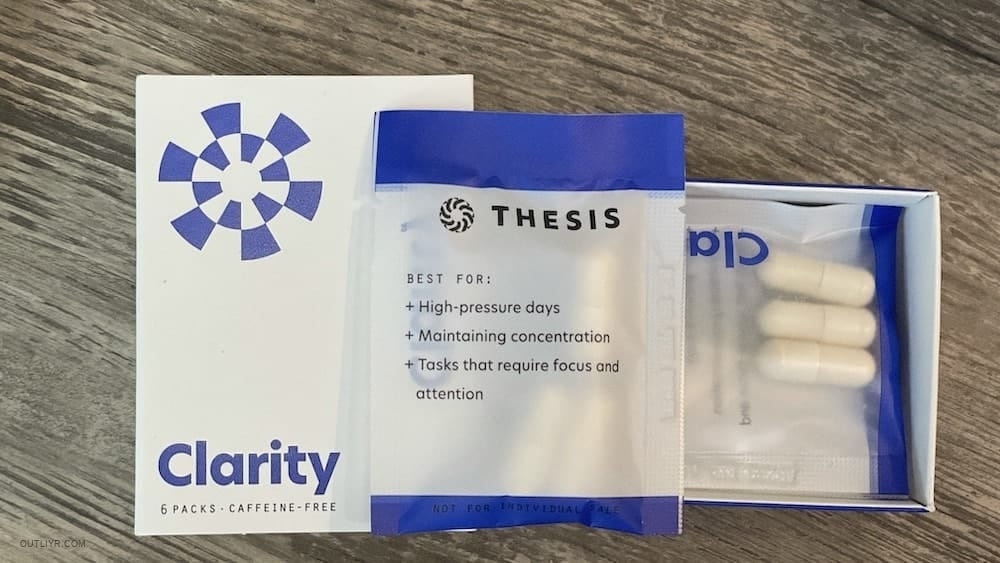
As the package insert describes, Clarity supports a calm, focused flow and is great for optimal performance during high-stakes days. Good for presentations, content creation, and non-stimulating concentration.
I’ve found this description to be spot on. The formula has undergone a complete overhaul, featuring two ingredients I haven’t found in other nootropics.
Thesis Clarity blend ingredients include:
- 7,8 Dihydroxyflavone – 30mg
- Camellia Sinesis Extract – 250mg
- Alpha GPC – 250mg
- Epicatechin – 250mg
- Lion’s Mane 8:1 Extract – 500mg
7, 8 Dihydroxyflavone is a man-made flavonoid that can penetrate the blood-brain barrier and mimic the effects of BDNF (dubbed “MiracleGro for the brain”). Camellia Sinesis is the ingredient that earned tea’s reputation as a health drink. It’s a potent source of the relaxing compound l-Theanine. Epicatechin also comes from tea, and it promotes optimal blood flow, mood, and neuroprotection.
A dose of Clarity takes three capsules, and I couldn’t pinpoint the exact time I started feeling it. The effects became more pronounced after approximately one hour.
Don’t expect a huge boost in energy or racing thoughts from this one. Once I released that expectation, I noticed that I felt clear, calm yet alert, steady, and mentally sharp . All without overstimulation. I flowed through my work, easily focusing on each task through completion.
To my surprise, Clarity went from among my least favorite Find My Formula blends, to my Thesis top pick.
I’m confident that this is one of the only nootropics that I can take in the afternoon (or even evening) and still sleep great.
Thesis Creativity
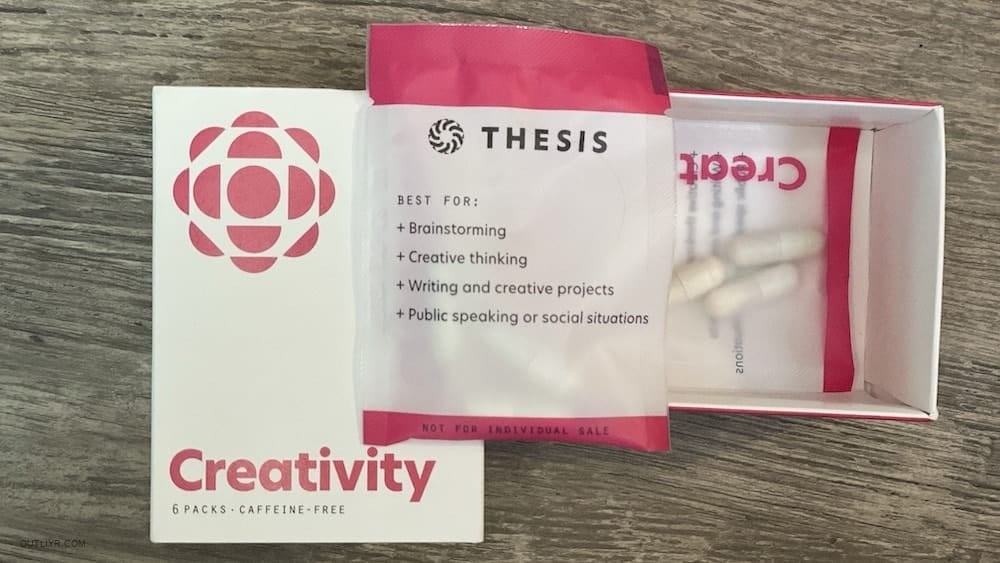
Creativity helps you generate new ideas, think abstractly, and finally bring your dream projects to fruition. It works by quieting overthinking and helping integrate both hemispheres of the brain.
The stack of powerful adaptogenic herbs also makes it an excellent choice for stressful situations, or to relax in social events.
You can rest assured that it contains some of the most researched and scientifically proven herbs on the planet. Ashwagandha and Panax Ginseng are staples in Ayurvedic (Indian) and Traditional Chinese Medicine. Thousands of studies back their use.
Thesis Creativity blend ingredients include:
- KSM-66 Ashwagandha – 300mg
- GS15-4 Panax Ginseng – 200mg
- Zembrin® – 25mg
- Agmatine Sulfate – 250mg
- Alpha GPC – 150mg
The Thesis formulators did a great job here, handpicking the strongest, cleanest, and most bioavailable forms of each ingredient.
Zembrin is one I hadn’t heard of, but am impressed by what I’ve learned. It’s a plant extract known to boost mood, improve workout focus, alleviate nervousness, and enhance complex problem-solving.
Approximately 45 minutes after my three-capsule dose, I noticed myself feeling slightly less reactive to urgent emails and other daily stressors. I could also more easily discern wisdom from my intuition. Each time I followed my instinct, I made the right choice.
I do already regularly take Ashwagandha and Ginseng in my own supplement regimen (which I stopped for this experiment), so it’s likely that my reaction is milder than most.
Thesis Logic
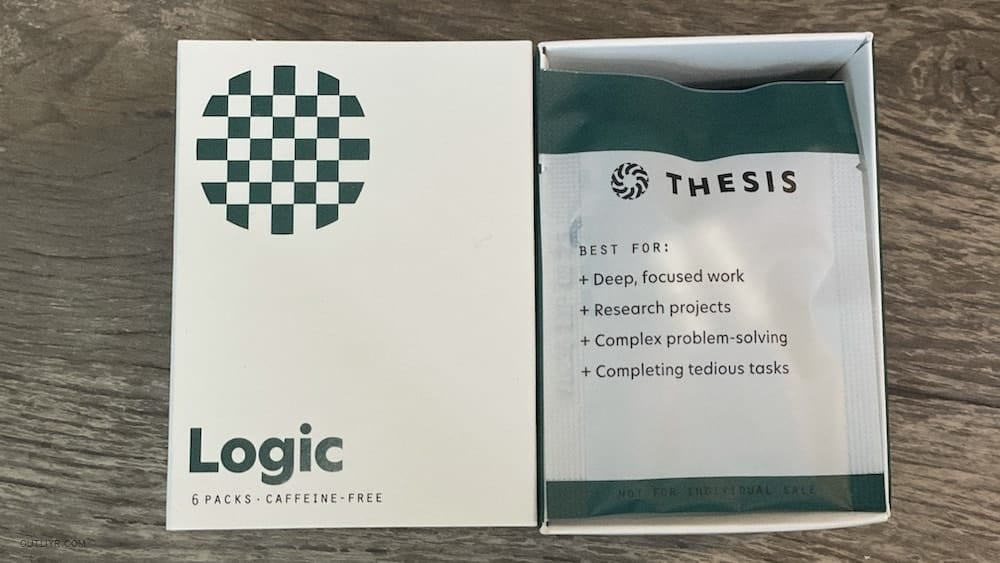
The name summarizes it well. Logic supports rational thinking. Making a popular choice among lawyers, bankers, programmers, scientists, academics, and those looking to boost their analytical abilities.
Though I didn’t get it selected for my Starter Kit, I reached out to their customer service to have it swapped in. As a Data Scientist, I knew that this would fit me well.
I was right. My first experience with the original Find My Formula Logic blend quickly took silver (only behind their original Energy). It hit the sweet spot between energetic stimulation and effortless focus. I went from spec sheet to finished product 35 percent faster than normal.
Thesis Logic blend ingredients include:
- Triacetyluridine – 30mg
- Vegan Omega-3 Lysine complex (EPA + DHA) – 200mg
- Phosphatidylserine – 200mg
- Theobromine – 100mg
- Gingko Biloba – 160mg
- Synapsa® (Bacopa monnieri extract) – 320mg
As its name suggests, Triacetyluridine is a more potent version of the nootropic uridine. It’s known to improve learning, memory, energy, mood, and reduce neuroinflammation.
Theobromine is a mild stimulant related to caffeine naturally occurring in cacao. It increases blood flow, and improves focus.
Those interested in memory enhancement may know Bacopa — one of the greatest ancient memory-enhancing herbs. Gingko is another notable natural herb, known to improve alertness, concentration, focus, and memory.
Phosphatidylserine comes from sunflowers. It gently alleviates stress without drowsiness, improves memory, and increases alertness.
Indeed, the Logic formulation improves working memory, offsets stress, and accelerates learning. On days I reluctantly approached tedious work, the two capsule dose of Logic took the edge off within about 20 minutes.
I’m still experimenting with the latest Logic blend, but so far it stacks up with the original. The new Logic feels slightly weaker, but I greatly prefer the new ingredients.
Thesis Motivation
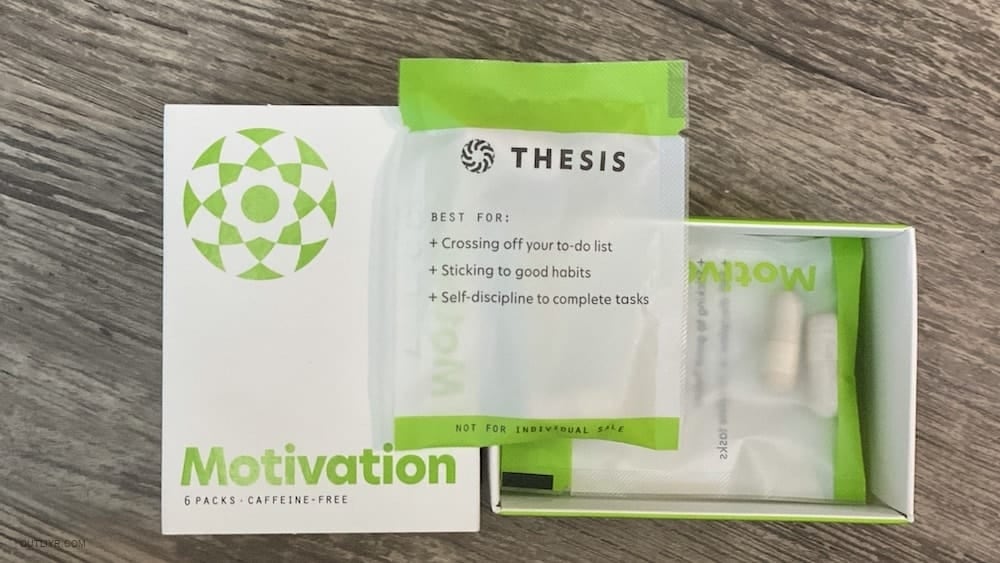
Motivation comes in a lime-green sachet. It’s Thesis’ take on the classic and original CILTEP nootropic stack.
Motivation bills itself as best for:
- Crushing your TODO list
- Building healthy habits
- Increasing discipline and drive
It’s one of the blends that’s most polarizing. You either love it, or you hate it.
I’ve tested this exact formulation produced by several different companies (including NaturalStacks and Find My Formula), and I’ve had bad experiences every single time.
The predominant effect I notice is a headache (which I never get). I also feel slightly spacey. This time I came prepared and used Semax to pull me out of my CILTEP fog.
But just as many people rave about their Motivation.
Thesis Motivation blend ingredients include:
- Forskolin – 250mg
- Methylcobalamin – 1000mcg
- Dynamine – 100mg
- L-Phenylalanine – 500mg
- Artichoke Extract – 450mg
It’s safe to say that after two days of use, you’ll know which Motivation camp you fall into.
Thesis Confidence
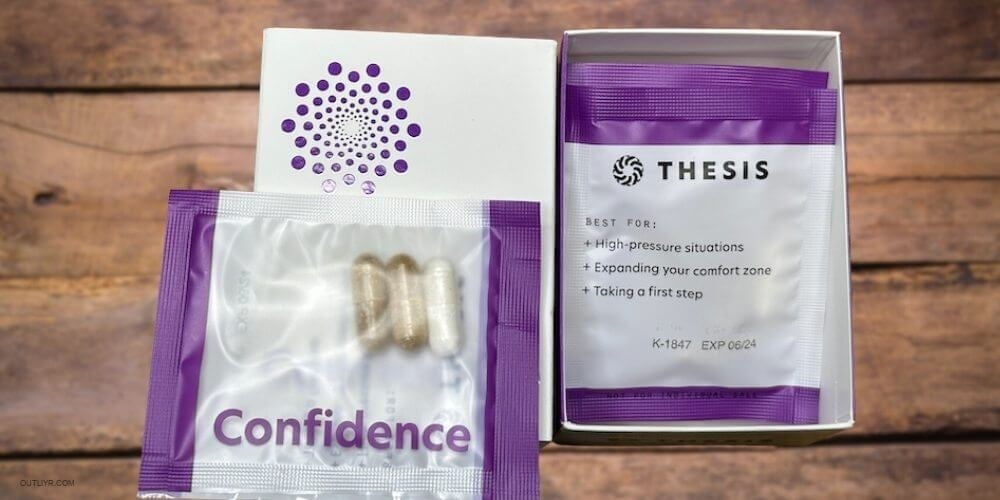
Confidence is a newer Thesis blend that came out in mid-2022 after heavy internal research and development. I’ve been using it for the last few weeks and it’s certainly one of my favorites. Perhaps my top non-stimulating Thesis Formula.
Typical use cases for Confidence include:
- Important situations
- Doing uncomfortable or new things
- Times of leadership
- Stopping overwhelm
My experience with Thesis Confidence has been overwhelmingly positive. Within about 30 minutes, I felt a smooth and definite mood boost. The day seemed to flow easily. I didn’t feel jitters or nervousness before overwise stressful no-agenda meetings.
This one is great for social situations. I’m noticing that I feel more comfortable and bold as a newbie Bachata dancer.
Although it’s not very stimulating, I noticed a slight rush kind of like the effect of finishing a good workout. Increased blood flow and slight flushing paired with relaxation (but certainly not any sedation).
Thesis Confidence blend ingredients include:
- Saffron extract (affron®) – 28mg
- Ashwagandha extract (Shoden®) – 120mg
- Sage extract – 333mg
- Magnesium threonate – 50mg
- Magnolia bark extract (DHH-B) – 10mg
This is an excellent formula. I love the synergy between the ingredients. Plus, many of these (like Saffron) are expensive and commonly faked in supplements. By using the patented versions, we’re assuredly getting the real thing.
How to Use Thesis
When the shipment finally arrives in the mail, you might feel overwhelmed.
Here’s what to expect…
Inside the large box, you’ll find four smaller boxes. Each box contains five sachets. Monday through Saturday mornings, you take one full sachet (2-3 capsules).
I suggest you take notes beforehand on what you wish to get out of the experience. Some popular examples include:
- Spending less time distracted on social media
- Output at your main job
- Progress toward hobbies, projects, or other work
- Starting a new skill, language, or health habit
- Finish work faster
Then, at the end of each day, spend 15-seconds jotting down notes in the provided instruction manual. Trust me, this makes a huge difference. After completing week four, you’ll probably forget which blends you loved, the effects they had, and which ones didn’t work for you.
Some of the ingredients last slightly longer in your system, so I take the entire weekend off to allow my neurochemistry to reset. This also ensures you get the most bang for your buck.
After repeating this process for all four boxes, you’ll have discovered your favorite blends. A Thesis coach can help you customize future orders so you’ll only receive the ones you want!
Tips to Get the Most Out of Thesis Nootropics
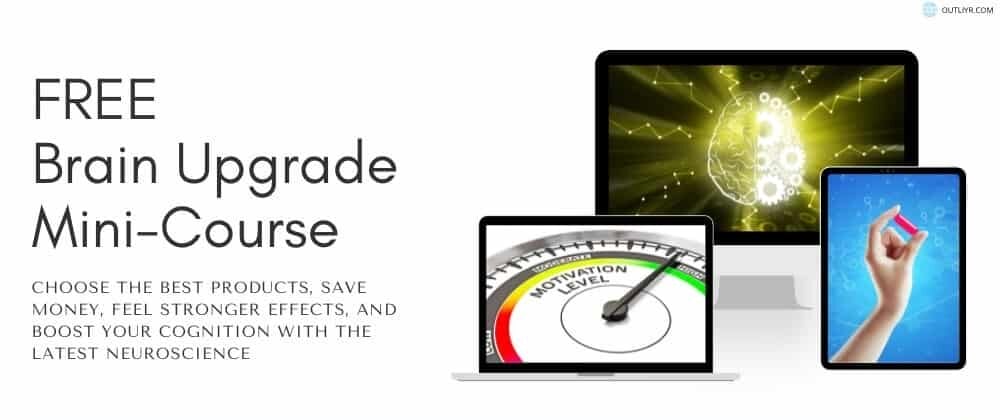
Nootropics aren’t cheap.
You can skip this entire section, but these tips will help ensure that you get the most out of your experience.
Caffeine-free . If you’re new to nootropics, start with the non-caffeinated versions. I drink coffee most days. Sometimes two cups. But I always get my nootropics caffeine-free. For several reasons. First, nootropics potentiate caffeine. One coffee can feel like 3. If you’re not used to the combo, going caff-free gives you more control. Caff-free also means that I can take nootropics later in the day. Also, the health benefits of coffee don’t come from caffeine but from the polyphenols, flavonoids, and other phytochemicals. Plus, I just like the taste of coffee.
If you like this kind of thing, join my FREE nootropics mini-course where you’ll learn:
- How professionals choose products
- Tips to feel stronger effects and get more out of your supplements
- Money-saving hacks
- Natural cognitive enhancement technologies
- Latest neuroscience-backed strategies to upgrade your brain
Fill out the info below to get started…
Request received. Your invitation should arrive in your inbox within about 5 minutes.
Thesis Nootropics Questions & Answers
Should i take thesis with caffeine.
I recommend taking Thesis without caffeine to start. Caffeine greatly increases the effects of certain nootropics. For some, this can be too much and lead to panic, headaches, and unease. You can always add coffee and more easily control your caffeine dosage later.
What’s the difference between Thesis and Find My Formula nootropics?
Thesis is the latest generation of Find My Formula nootropics. They’ve refined, upgraded, and revamped every single one of their formulas according to the latest neuroscience research. Find My Formula products are no longer available.
Which Thesis blend is best?
Your ideal Thesis stack depends on your neurochemistry, lifestyle, and goals. People either love or hate their Motivation blend. My favorites (in order) are Clarity, Energy, and then Logic.
How much do Thesis nootropics cost?
Thesis offers two different buying options: one-time, and subscription. One-time purchases cost $119.00 and subscriptions cost $79.00 per month. Use code URBAN and save an extra 15 percent! Thesis backs all purchases with a full 30-day no-questions-asked money-back guarantee.
Thesis Nootropics Review: Boosting Your Brain With Precision Formulas
Ignore those that say you’re stuck with a less-than-optimal brain.
According to the latest neuroscience (and countless personal examples), that’s demonstrably false.
That is if you use the right products.
The most popular nootropics today are:
I’m constantly trying the latest nootropic formulas.
I take most of them for a month and see little benefit.
Thesis is one exception, featuring an impressive array of the highest-quality forms of well-researched ingredients. Drawing from their millions of data points, they’ve come up with unique formulas that give you both a quick boost and long-term benefits .
So that one day, should you choose, you can completely stop supplementing and continue enjoying all the fruits of an upgraded brain.
I personally prefer their Clarity, Energy, and Logic. Each serves a role specific to the type of day I have ahead.
Since the original Find My Formula blends, I’m impressed with their improvements. They’ve moved away from some of the man-made ingredients and embraced natural (but effective) bioharmonizing compounds.
As of January 2022, Thesis has amassed a 4.5+ star rating on 7,411 ratings.
Try it yourself with the exclusive Outliyr discount:
Thesis nootropics code URBAN saves you 10%
To the long-term Formula users — what do you think of the update? Have you enjoyed the new Thesis blends?
Let’s have a discussion in the comments below!
Post Tags: Brain & Cognition , Lifestyle , Nootropics , Review , Supplements
12 thoughts on “The Best Nootropics Supplements Personalized to Your Brain?”
Unfortunately, I can not use any of the samples sent by Thesis. Each packet contained the caffeine equal to a cup of coffee.
What a bummer!
I’m not sure how you do with caffeine, but it also includes l-theanine which is a natural amino acid that really smoothes out the negative effects of caffeine (I won’t use any form of caffeine without it). You might want to reach out to their team about this, but last I heard, one of the pills in each sachet is exclusively caffeine/theanine. I’ve received a few caffeinated boxes, and just threw away the smallest white caffeine/theanine pill.
Or you can reach out to them and they will likely make it right.
Hey, I had the same issue. Fortunately, the caffeine portion comes in its own separate capsule (the white capsule in each packet), so you can choose to leave it out!
Correct. It’s the smaller white one if there are multiple white capsules.
I’ll be honest. I think this is a scam, like snake oil.
Hi Andrew. Not sure what you mean. Have you ever used nootropics? Or botanicals/herbals? What makes you think this is a scam?
This is my first time visiting the website although I’m no stranger to nootropics. I don’t remember where or how I discovered acetyl choline—AGP?—but it was a game changer for me. I’d been taking phosphatidylserine for memory enhancement for at least 2 decades, L-Tyrosine to boost dopamine, PEA, for the same reason. All on my own initiative, as a result of my own independent research. What disturbs me about Thesis is: 1). I suffer from a congenital disease for which there is no cure—Lipedema—and this is allegedly at the root of the fatigue which has blighted my entire life and which I have been attempting to overcome for most of it. The disease afflicts about 10% of women and as one doctor blithely informed me, “you;d be better off with cancer. At least there’s a chance you might recover.” As a result of the quiz I took, Thesis informed me I was in the bottom 4% of applicants and never investigated further. Well, Hello. 2). Quiz had questions about exercise but nothing about diet or meditation, Since I follow functional and integrative Medicine, these gaps disappointed me. I still haven’t made up my mind about becoming a member, but I am grateful to Andrew Huberman for drawing my attention to this range of products.
Hi Jacqueline, sorry about the super slow response here! Glad you’ve found things that work for you. That’s strange. When I took the quiz, they didn’t show percentiles. I agree, diet and meditation are essential. Impossible to overlook really, especially when we’re discussing nutraceuticals. I’ll let them know when I talk to them next.
Update on “the ingredients are not evenly distributed throughout the pills.” I spoke to a Thesis rep this week, and after a detailed conversation regarding the caffeine pills (the small white pill in each caffeine line of products), she clarified that the other pills (not the 100mg of caffeine + 200 mg of L-Theanine small white pill) have the remaining blend evenly distributed between the pills.
Loved your article, how you spelt it out, and agree strongly with the feelings on Clarity being “clear, calm yet alert, steady, and mentally sharp. All without overstimulation.”
Good correction! The caffeine/theanine pill is easy enough to spot.
Thanks for the feedback. Which are your favorite(s)?
Nick, this is an awesome intro to nootropics and Thesis, thank you for breaking this down! I was a Formula customer for years and my favorite blends were Clarity and Creativity. With the new Thesis formulations Energy has been added into my routine! I feel like I have tools at my disposal for any occasion… Creativity is great for social situations or other experiences that would otherwise leave me mentally fatigued, Clarity is great when I have a ton I want to accomplish without interruption, Energy is great when I haven’t had great sleep or need to do more physical stuff. I don’t use it every day, but it’s there when I need a lift. Great read, thanks for the knowledge!
Thanks! How often do you use Thesis? Do you combine it with anything else?
Leave a Comment Cancel reply
Nick Urban is the Founder of Outliyr, an expert Biohacker with 12+ years of experience, a Data Scientist, a Certified CHEK Practitioner, Host of the Mind Body Peak Performance Podcast, and a High-Performance Coach. Click here to read how Nick went from struggling pre-diabetic, to collegiate rugby national champion. To send Nick a message, visit his Contact Page .
Diet & Nutrition
Ingredients and compounds
Mind & Cognition
Movement & Fitness
Tools & Gears & Services
Common Tags
- Alternative Medicine
- Alternatives
- Ancestral Health
- Bioelectric
- Biohacking Cities
- Bioharmonizing
- Blood Sugar
- Blood Testing
- Brain & Cognition
- Cardiovascular Health
- Consumables
- Controversial
- Digital Drugs
- Digital Product
- Electrical & Quantum
- Electrolytes
- Environment
- Essential Oils
- Extreme Temperatures
- Fitness Product
- Food Intolerances & Allergies
- Foundational Health
- Functional & Holistic Health
- Grocery Shopping
- Holidays & Vacation
- Inflammation
- Mitochondria
- Nervous System
- Oral Health
- Performance
- Product Roundup
- Quantification
- Recommendations
- Recovery & Resilience
- Relationships
- Routines & Rituals
- Spirituality
- Strength & Muscle
- Supplements
- Toxins & Toxicants
- Trace Minerals
- Vitamins & Minerals
- Weight Loss
Who is Nick Urban
Every year I spend over 1,000 hours reading, discovering, testing, and analyzing strategies
Nick Urban is the Founder of Outliyr, an expert Biohacker of 10+ years, Data Scientist, Certified CHEK Practitioner, Host of the Mind Body Peak Performance Podcast , and a High-Performance Coach. Click here to read how Nick went from struggling pre-diabetic, to collegiate rugby national champion. If you want to send Nick a quick message, then visit his Contact Page .
Zoom with Nick Urban
BiOptimizers Breakthroughs
An entire catalog of best-in-class formulas produced by the world's highest-rated supplement brand. As mentioned in my full BiOptimizers review , I use their products daily. Code URBAN saves 10%
Sens.ai Brain Training
Like building your ideal body in the gym, we can also train our minds to work better and more efficiently. I use this 5-in-1 system daily. Read my review and use code URBAN to save 5%
Nootopia Brain Breakthrough
Instantly unlock your brain's full potential with powerful elixirs customized to your unique neurochemistry. Read my review and use code URBAN to save 10%
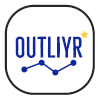
Coaching Login
Biohacker's Shop
Mind Body Peak Podcast
Urban Supplement Stack
Biohacking Resources
1500 E Riverside Dr, Austin TX
530-426-2319
©2024 Outliyr LLC
Privacy Policy | Terms Of Service | Editorial Policy | Disclaimers

Thesis Nootropics Review
Nootropics fan and expert James Dixon examines this personalized supplement in our Thesis Nootropics review. Find out how he rates it after testing it below…

Last Updated:
August 6, 2024
Written by James Dixon – fact checked by Jason M & the editorial team
James Dixon is one of the key players in the SOMA Analytics’ team. He is a personal trainer and is educated to Masters level in Philosophy. He is a published author and is a keen advocate of high quality nootropic supplements.
This article complies with the SOMA Analytics editorial policy. Full details of which can be found here
SOMA Analytics is supported by our readers. We may earn a commission when you purchase through links on this page. Our content is checked for factual accuracy by our editorial team and is written by expert nutritionalists.
Nootropic supplements – so called ‘smart drugs’ – are all the rage. They represent a rapidly expanding corner of the supplement market and have had genuinely life-altering effects on many, many users – myself included.
They’re not actually ‘drugs’ as you would think of them. This isn’t medication we’re talking about, here. Rather, these supplements are compounds of natural ingredients designed to work together to boost your cognitive health and brain function .
A good nootropic should help you feel smarter… which is a bold claim. There is something to it, however.
Nootropics should aid your focus, learning skills, memory, and creativity . They should reduce brain fog, anxiety, and lethargy , replacing them with clarity, calm, and plenty of low-key energy.
If you struggle with any of these symptoms, there is a good chance that you could do with a quality nootropic, which is exactly what we’re looking at today. Though perhaps not the best of the best, Thesis Nootropics offer a range of products that are all intelligently crafted and, to a degree, fairly personalized.
And when I say they aren’t the best of the best, this doesn’t mean much. The nootropic market is crowded. There are a couple of standout items out there – NooCube springs to mind. Playing second fiddle to these is still a large accomplishment.
Let’s dive in and take a full look as I dig in to this Thesis Nootropics review.

Quick Verdict: Thesis Nootropics
Thesis Nootropics have a great range of different nootropics aimed at different needs. They also have an excellent nutritional coaching system to support you.
However, the reality is that most people won’t really gain from this additional 5%. Products such as NooCube offer greater value for money with similar nootropic benefits.
Introducing Thesis Nootropics
As above, Thesis Nootropics are smart drugs. They offer high-quality nootropics that are designed to help with various aspects of your cognitive health and function. Their products all contain top-shelf ingredients all proven to help your brain to work optimally.

They also do something a bit different. Where most nootropics – and most other supplements, for that matter – offer you the same over-the-counter pills as they would offer anyone else, Thesis bring personalized supplements to bear.
Through their online store, you can fully personalize your nootropic options to make the most of your own specific needs and circumstances .
It’s really quite clever.
They started out as FindMyFormula.com before rebranding a few years back. So, although ‘Thesis Nootropics’ may seem like a newcomer to the market, they have actually been around for a long time.
They bring this pedigree to the fore with this product. With a customer base of over half a million users, they have proven themselves and then some.
The data they hold from their research into nootropics is peerless – I can’t think of anyone with better. And they use it well, crafting and re-crafting their formulae with proper, diligent science and data in mind.
The personalization process is actually quite straightforward too – at least, it is for the customer, which is always nice.
You start off by going to their website and taking their questionnaire. Don’t worry, it’s not all that comprehensive, asking for only basic information. There is no need to take any lab tests or divulge your medical history.
However, it’s enough for them to make a match for the nootropic blends that will best suit your needs.
Optimize Your Mental Agility
Claim access to the full potential of your brain
with these optimum nootropic stacks and
exclusive discounts …
There are two ways to read this, of course. Either, it’s a non-invasive way to tailor your supplements, or it’s not a deep enough dive, so how well tailored can they really be?

I felt a little let down, here. When I came in being promised ‘personalized supplements’ I had higher hopes. Instead, it’s just sort of asking what you want and pointing you in the right direction.
It’s nice, it’s just not quite as revolutionary as the literature and branding suggest.
The next phase is good, though. They’ll send your shipment out to arrive within 1-3 business days .
However, they ask you to treat this as a sample; they invite you to try out a few different blends of theirs before picking it.
This data is fed back to their algorithm, further enhancing their future prescriptive capabilities. Again, you can read this cynically or not.
Either it’s a great way to search out what works best for you, or it’s doing their job for them and getting you to buy plenty of their products in the process… if their original diagnostics are that good, why do you then need to cycle through their catalog?

Except that they allow you to try up to four before committing to a longer-term formul a. Pair this with that original questionnaire and, cynicism on hold, you have an excellent and innovative product.
It helps you to refine your own choices without having to do the legwork, which can often take months, a lot of money, and a fair amount of trial and error.
The final part is my favorite part, and dispels much of my lingering cynicism…
As a Thesis customer, you are assigned a nootropics expert , a sort of coach and pharmacist in one. You can consult with them virtually at any time.
They can help you to further refine your nootropics regime, find ways to optimize your results, track your progress and wellbeing, and generally educate you by ably answering any questions you might have.
I love this. It takes Thesis to the next level – it’s less a supplement and more a course focused on wellbeing.
It’s not cheap, I’ll warn you now. A starter kit will go over a hundred dollars. A prescription will run to a monthly bill of around eighty.
This is roughly twice what you would pay for something like NooCube or Mind Lab Pro , supplements I consider to be the best of the best. It’s around four times what you could pay for a lower-end, albeit workable nootropic.
You’re presented with a choice, then: pay extra for the support and tailoring, or pay a far more reasonable amount for something that will still do the job incredibly well.
Why Choose Thesis Nootropics?
The benefits of Thesis Nootropics are fairly straightforward.
Firstly, Thesis shares the same benefits as any other good-quality nootropic supplement. They offer several blends (more on this below), which between them can improve your cognitive function from pretty much every angle.

You can boost your cognitive energy, improve your clarity, improve your memory and learning abilities, clear brain fog, improve your mood, reduce your stress levels, and boost your ability to focus, among other things.
This is all good. It’s what you’re looking for in a nootropic in the first place.
But, of course, the benefits go beyond this. The two main things you get from Thesis that set it apart and above most of its competition, are really very special.
Firstly, of course, you get the personalization mentioned above. This can be fantastic. Or it can be a little superfluous.
If you try something like NooCube, you will probably find it working for you. It may not be 100% scientifically optimal, but it will be 95% there for most of us.
However, if others haven’t worked for you, personalization may be a very good idea. You can really zero in on the aspects of your own cognitive health and function that you feel need improving.
Also, if you want to get that final 5% (figures not accurate, of course) and don’t mind parting with a little extra cash, Thesis can be well worth it. You will be as cognitively optimal as modern nootropic research can make you, which is no small thing.
Then there is the access to their experts . Again, this can be superfluous. How much do most of us really need to know about nootropics above and beyond what you can read in any good review or rundown? Just learn the basics, throw back a couple of NooCube capsules, and get on with your life.
But, again, it can be wonderful. This is where the extra price begins to seem really quite minimal.

Our Preferred Alternative To Thesis
Although we found Thesis Nootropics to include high-quality ingredients, the personalization for most people is not required and adds a lot of expense to an already pricey supplement.
We prefer NooCube, the nootropic taken by our tester and writer – thanks to its high-quality formula, high-impact results, and value for money cost.
Thesis Nootropic Ingredients
Thesis Nootropics offer several different blends, relatively personalized towards the individual, focused entirely on aiding different facets of cognition and brain health.
Given these differences, it’s no surprise that each blend contains a different list of ingredients – though there are of course some commonalities between them.
The Energy blend is one of their most popular. The formula is made to boost your energy levels whilst fighting fatigue and improving your mental stamina.
Next up, we have Thesis’ Clarity , which contains plenty of the ingredients I would expect to see in any good nootropic to maintain focus, support attention, and enter flow state – which is when you are achieving an optimal state of consciousness, fully immersed in a task and performing at your best.
Motivation is a bit of a funny one, as motivation is inherently a hard metric to either properly define or measure. However, in this context, motivation means a boost to willpower and productivity, and help in warding off procrastination.
Then we have Creativity , which is often misunderstood in nootropics. Being creative helps us think outside the box; stretch the imagination and come up with solutions to problems. This formula also works to improve verbal fluency and confidence. So what sounds like fandango initially could actually be incredibly beneficial on a day-to-day basis.
Finally, we have Thesis’ latest blend, Confidence . As you may well imagine, this leads to a boost in confidence!
Confidence’s ingredients all target stress, especially stress responses to insecurities, whilst promoting a feeling of self-assurance. It also aims to ‘soothe the nerves’, so that you can function calmly.
Edit: Thesis have since added Logic to their collection: perhaps their most closely linked to a classic nootropic, as it works to support memory, encourage deep thinking, and improve processing speed.
Ingredient Profiles
- Lion’s Mane Mushroom
- Camellia Sinensis Tea Leaf
- Dihydroxyflavone
- Agmatine Sulfate
- Panax Ginseng
- Ashwagandha Root
- Sceletium Tortuosum
- Ginkgo Biloba
- Theobromine
- Phosphatidylserine
- High DHA Algae
- Uridine Monophosphate
- Bacopa Monnieri
- N-Acetyl Cysteine
- Indian Trumpet Tree
- N-Acetyl L-Tyrosine
- L-Phenylalanine
- Methylliberine
- Vitamin B12
- Magnesium Bisglycinate
- Magnolia Bark
- Ashwagandha Leaf & Root
How to Use Thesis Nootropics
Nootropics are amongst the easier supplements to live with. There are no special timings or anything like that to hit, and the portions are all very manageable.
Thesis Nootropics fit this pattern nicely. For all of their different lines, simply take them in the morning, ideally when you first get up, on an empty stomach with a decent glass of water.
If you need a bit of an extra boost during the day (particularly if you’re going for the energy blend), feel free to take a second dose at lunchtime to see you through until the evening. This will ensure clarity and energy all day long.
Using Thesis Nootropics
I was quite sceptical of nootropics when I first heard about them in the early 2010s. They sounded too good to be true – over-the-counter supplements made from all-natural ingredients that can boost your brain health and cognitive function? No way.
Many are too good to be true. Plenty of nootropics out there don’t do anything above and beyond giving you a brief energy kick, and this is usually down to their caffeine content. You’d be better off having a cup of coffee or cheap caffeine supplement.

Thesis Nootropics are not too good to be true. They are good – very good, in fact – and highly workable.
I’m not entirely sold on them. I find them to be a bit gimmicky. They shouldn’t be gimmicky, of course – tailoring to your uses and offering coaching is no gimmick.
However, it’s just a little shallow to be truly tailored – they are simply giving you a selection of stacks, which many supplement stores offer (CrazyBulk, for instance).
And the coaching is perhaps a little superfluous for most people.
But the supplements themselves are good. They are well developed, well made, high quality, and will absolutely elicit the effects they claim in many, many people.
I got on well with them. I took their Energy blend first, which is always my priority (I’m always juggling seven or eight different projects at any time, so an energy boost will always be welcome!)
It did what it said it would. I found my focus improving and my energy lasting me through the day. I usually drink a lot of coffee, which tends to give me spikes and crashes. The spike wasn’t as high with the Energy blend, but nor was there any kind of crash.
I also tried Clarity, as I take a couple of prescription medications that can lead to a touch of brain fog. It cut through my brain fog well, lending me a great deal of clear-sighted cognitive energy. There was no coming round in the morning, no chugging espressos just to form a coherent sentence. Or, at least, I came round quicker and reduced my espresso intake.
I also wanted to know a bit about Thesis’ coaches, or whatever they call themselves.
I got in touch and was chatting to a woman with a highly relevant, impressive array of academic credentials just a few days later. She explained how the components in the blends I was trying worked and interplayed, and pointed me in the direction of a couple more that I might like to try.
The advice was kind of handy, though it wasn’t anything I would struggle to find out just from perusing their website. The information was interesting to a health and supplements nerd, but that was it. I can’t imagine it being in any way helpful. I can’t even imagine it being interesting to most people.
It’s not a good use of money (and you will be spending a lot of money on Thesis). The supplement is strong – the blends I tried were strong. But none of them gave me the kinds of results I have experienced whilst taking cheaper, better nootropics, namely NooCube – this is what I personally tend to take on an ongoing basis.
There is no harm in trying Thesis. They offer a one-month money-back guarantee, so you can get that hefty price tag (generally around $119) back again if you’re not satisfied.
I think you will be satisfied. Thesis is a satisfying product. It’s just not the best, and the best happens to be an awful lot cheaper.
Do also bear in mind that nootropics can cause side effects – Thesis’ blends are no exception. They can lead to blurred vision, high blood pressure, an accelerated pulse, circulation problems, and insomnia, though severe or long-lasting cases are rare.
Pros and Cons
Thesis pros.
- Personalized for optimal benefits.
- Comes with access to their experts.
- High-quality ingredients.
- Highly reputable company.
- Different blends for different uses/needs.
- Ability to try out different blends before committing.
- Easy to take.
Thesis Cons
- The personalization is a little shallow.
- It’s very pricey (about twice as costly as other leading nootropics).
Our Thesis Video Review
Thesis Nootropics are good. In fact, they are very good. The personalized aspect, whilst admittedly a little shallow, is still very welcome. I like it a lot.
As a bit of a supplements nerd, I also love the idea of being able to chat to an expert at any time – this really is a nice touch.
However, I can’t help but feel that it’s all a little superfluous. Most people know their own needs. A quick Google search will show you what nootropics will be best for you. If in doubt, go for a cover-all nootropic. I keep mentioning NooCube with good reason – it should do pretty much everything that all of Thesis’ blends do.
Then there is the price. You’re paying a lot for a good product with plenty of customer care involved. However, as above, the customer care is largely excessive. If you really want it – and I can see plenty of people wanting it, with good reason – then by all means fork out extra.
However, it’s just a little extravagant for most people.
For a month’s supply (at non-subscription prices), you can buy around three months’ worth of NooCube. For this, you’ll be getting just about the best nootropic on the market with no extra legwork – just simply take it each morning, save some money, and get on with your life with your cognitive health in near perfect shape.
Verdict: Thesis Nootropics
The reality is that most people won’t really gain from this additional 5%. Alternative products such as NooCube offer far greater value for money with similar (if not better) nootropic benefits.

This article was written by: James Dixon – SOMA Analytics PT, Nutritionalist & Published Author
James Dixon is one of the key players in the SOMA Analytics’ team. He is a personal trainer and is educated to Masters level. He is a published author and is a keen advocate of high quality nootropic supplements. James enjoys helping others to reach their peak both physically and mentally and believes that expressing his knowledge through his writing is an effective way to positively impact the wellbeing of others on a larger scale.
Latest Updates:
✎ July 25, 2024: Updated product images, resized and repositioned. Checked links and offers. Added additional Logic product which has since been added to the Thesis range. Checked ingredients and amended where required. Added updated image of quiz questions. Added entire ingredients profile section for clarity. Reformatted areas such as Pros & Cons.

COMMENTS
Logic. Enhances focus and deep thinking. Convenient daily-dose packets for a month's supply of nootropics. Feel the effects within 60 minutes. Retain information and stay on task. 3rd party lab tested for purity and potency. 24 daily doses delivered monthly. Select preference:
Get your starter kit. Optimize with a coach. Take the Quiz. Nootropics aren’t one size fits all: discover what’s possible with blends optimized for your goals and lifestyle.
Your Starter Kit includes 4 blends selected for you: Clarity: enter a flow state on stressful days *. Energy: get all-day energy without crashing *. Logic: enhances deep thinking + supports recall *. Creativity: improves idea flow + eases nerves *. Confidence: ease your nerves + calm your mind *.
Taking Thesis Logic is easy – simply take it every morning on an empty stomach, and take it again after lunch if you need an extra boost. By incorporating Thesis Logic into your daily routine, you may notice improvements in your cognitive function and overall mental performance.
In this 2024 review, our experts try six formulas from Thesis Nootropics to test their brain-boosting power.
Based on my quiz, I was recommended Thesis Clarity, Logic, Motivation, and Confidence Blends. I tried each for a week to see if one stood out. I took them without caffeine as they all work if you have the caffeine L-theanine stack.
Truthfully, I’m a total newbie with nootropics and this seemed like a good way to try them. I really lack energy and motivation and focus. I’m following their plan though and week 1, I’ll take logic. Hope to read more about other’s experiences. I do take Effexor for anxiety and depression.
One such nootropic experience is a “newcomer” (you’ll learn why this isn’t exactly true) called Thesis. You take a short brain assessment, they send you a starter kit, and their complimentary coach helps you hone the perfect brain supplements — customized to you!
Q: How Should You Take Thesis Logic? A: According to the manufacturer, you can take one packet of Thesis Logic in the morning, especially on the days you want to remain calm and perform your best, including in stressful situations. You can also take one pack of Thesis Logic 30 minutes before embarking on a task so that it helps to alleviate focus.
Introducing Thesis Nootropics. As above, Thesis Nootropics are smart drugs. They offer high-quality nootropics that are designed to help with various aspects of your cognitive health and function. Their products all contain top-shelf ingredients all proven to help your brain to work optimally.